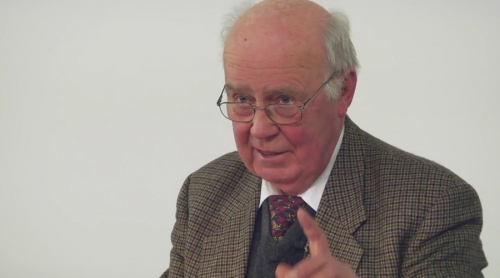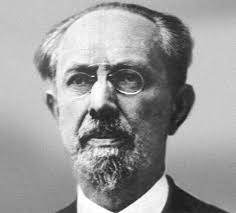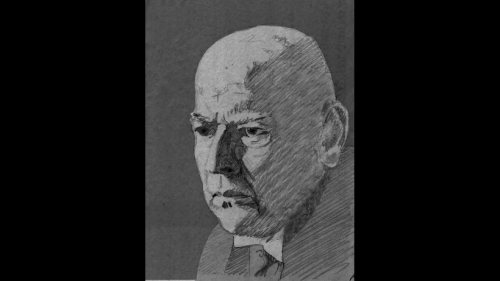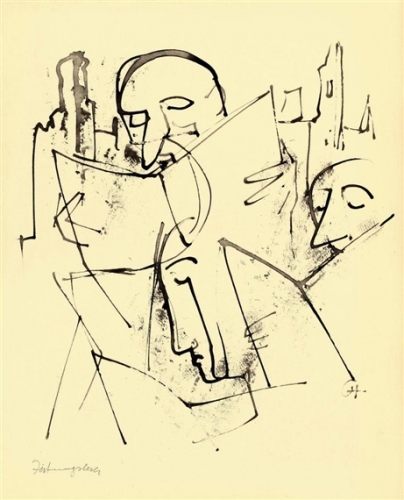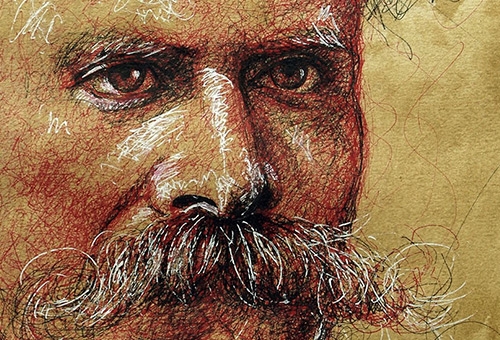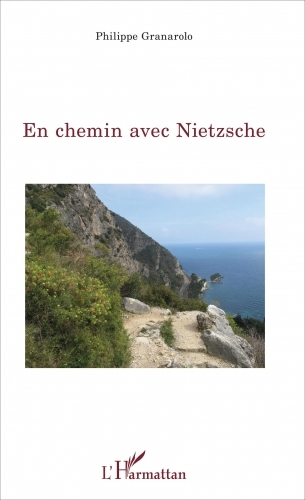vendredi, 01 février 2019
A propos du traité d'Aix la chapelle et de la notion de souveraineté
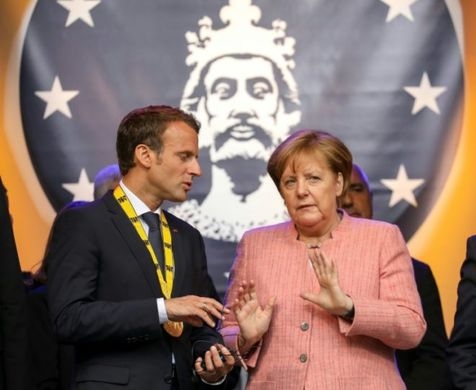
A propos du traité d'Aix la chapelle et de la notion de souveraineté
par Pierre Eisner
Ex: http://thomasferrier.hautetfort.com
La signature du traité dit d’Aix-la-Chapelle entre la France et l’Allemagne a suscité beaucoup de réactions. Sans doute a-t-on attaché trop d’importance à ce qui n’était qu’une opération de communication. Elle a été voulue par Emmanuel Macron pour l’aider à construire une façade de partisan de l’Europe, et concédée par Angela Merkel qui n’a plus de poids politique. Même s’il a fallu flatter le voisin allemand pour y parvenir. Mais tout texte, fût-il mal conçu et peu contraignant, a malgré tout une signification.
Le Rassemblement national (RN), comme une certaine partie de la droite, y a vu une perte de souveraineté, certains parlant de trahison. C’est sur cette perte supposée qu’il nous faut réfléchir. De quelle souveraineté s’agit-il quand on parle de celle de la France ? Est-ce celle du pouvoir de son dirigeant ou est-ce celle du pouvoir de son peuple ?
Le président Emmanuel Macron n’a pas perdu la moindre parcelle de son pouvoir par le fait du traité. Prenons ainsi l’exemple de la politique étrangère et de la défense. La France et l’Allemagne se sont engagées à coordonner leurs actions dans ces domaines, favorisant les échanges de personnel diplomatique et instituant notamment un Conseil franco-allemand de défense et de sécurité. Si, pour une raison quelconque, les dirigeants français et allemands sont amenés à prendre des décisions contradictoires, comme cela a été souvent la cas dans un passé récent, rien ne pourra les en empêcher. Alors ils se garderont bien de faire jouer les instances communes qu’ils ont instituées. En revanche si l’un ou l’autre, à propos d’une question un peu épineuse et faisant débat, est en phase avec son homologue ou parvient à le convaincre de rejoindre sa position, il pourra expliquer dans son pays qu’il est contraint par l’obligation de trouver une position commune, sollicitant par exemple l’avis d’un Conseil compétent.
En revanche le peuple français, comme le peuple allemand, aura perdu un peu de son pouvoir. On vient d’expliquer le mécanisme qui permet de court-circuiter le peuple lorsque sa position pourrait ne pas être celle attendue par son dirigeant.
C’est exactement ce qui se passe avec l’actuelle Union européenne. Il est inexact de dire que telle ou telle décision est imposée par Bruxelles. Lorsque l’avis des représentants du peuple français n’est pas sollicité, au prétexte de l’obligation de se conformer à telle règle européenne, c’est parce que son dirigeant s’est arrangé auparavant avec ses homologues pour ladite règle soit instaurée. Il y a bien un cas où la règle européenne est légitime. C’est celui de l’Euro et de la règle des 3% relative au déficits publics. En France au moins, le peuple s’est prononcé par référendum. Le paradoxe est que cette règle a été peu contraignante. On a accepté n’importe quoi de la Grèce pour son admission, comme de la France pour s’y conformer. Si la règle n’est pas respectée en 2019, il est peu probable que cela fasse des vagues.
Il y a bien un transfert de pouvoir, aussi bien à l’occasion de ce traité franco-allemand qu’à l’occasion des traités européens. Mais un transfert du pouvoir populaire au bénéfice du pouvoir discrétionnaire d’un dirigeant. C’est une perte sèche de démocratie, indépendamment de ce qu’on peut mettre comme périmètre pour définir le peuple.
Ce n’est pas comme si une Europe politique était installée, sous la forme d’un état unifié. Ou comme si la France et l’Allemagne fusionnaient pour donner naissance à un état commun. On pourrait alors parler de transfert de souveraineté démocratique. Aujourd’hui la souveraineté démocratique n’est pas transférée : elle est dissoute au bénéfice d’une techno-structure et in fine des membres d’un club.
Pour revenir au traité franco-allemand ou à toutes les opérations qui y ressemblent, dans l’absence d’une instance politique installée au niveau adéquat, pour produire les rapprochements, les convergences que l’on peut raisonnablement souhaiter, ce ne sont pas des institutions qu’il faut créer pour tenter de les imposer, mais des convergences qu’il faut réaliser, sous le contrôle des citoyens de tous les états concernés.
Évidemment c’est difficile : il faut des dirigeants éclairés et courageux pour cela. Et cela concerne certains sujets comme l’économie, quand la diplomatie a besoin d’une légitimité politique et quand la lutte contre le terrorisme peut se contenter d’une coopération avec une mise en commun de moyens. A l’inverse, les institutions nouvelles, qui se multiplient à l’infini avec un coût incontrôlé, ne sont que des alibis. Chacun le sait : quand on veut évacuer un problème, on crée une commission.
C’est ainsi qu’il faut apprécier le traité d’Aix-la-Chapelle. Beaucoup de bruit pour rien, surtout pour ne rien faire de sérieux. Juste de la poudre aux yeux, mais qui peut aveugler.
Pierre EISNER (Le Parti des Européens)
00:28 Publié dans Actualité, Affaires européennes | Lien permanent | Commentaires (0) | Tags : politique internationale, europe, affaires européennes, union européenne, traité d'aix-la-chapelle, aix-la-chapelle, emmanuel marcron, angela merkel, france, allemagne |  |
|  del.icio.us |
del.icio.us |  |
|  Digg |
Digg | ![]() Facebook
Facebook
jeudi, 31 janvier 2019
Prof. Dr. Alexander Demandt auf der Oswald-Spengler-Konferenz 2018
01:38 Publié dans Philosophie, Révolution conservatrice | Lien permanent | Commentaires (0) | Tags : allemagne, alexander demandt, oswald sepngler, révolution conservatrice, philosophie, philosophie de l'histoire |  |
|  del.icio.us |
del.icio.us |  |
|  Digg |
Digg | ![]() Facebook
Facebook
mercredi, 30 janvier 2019
Werner Sombart ce grand oublié de l'histoire
01:25 Publié dans Philosophie, Révolution conservatrice, Théorie politique | Lien permanent | Commentaires (0) | Tags : capitalisme, werner sombart, socialisme, socialisme allemand, allemagne, philosophie politique, théorie politique, sciences politiques, politologie, révolution conservatrice |  |
|  del.icio.us |
del.icio.us |  |
|  Digg |
Digg | ![]() Facebook
Facebook
Prof. Dr. Gerd Morgenthaler auf der Oswald-Spengler-Konferenz 2018
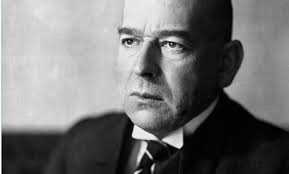
Prof. Dr. Gerd Morgenthaler auf der Oswald-Spengler-Konferenz 2018
00:32 Publié dans Philosophie, Révolution conservatrice | Lien permanent | Commentaires (0) | Tags : oswald spengler, révolution conservatrice, allemagne, philosophie, philosophie de l'histoire |  |
|  del.icio.us |
del.icio.us |  |
|  Digg |
Digg | ![]() Facebook
Facebook
mardi, 29 janvier 2019
"Oswald Spengler ou le tourment de l'avenir"
11:57 Publié dans Philosophie, Révolution conservatrice | Lien permanent | Commentaires (0) | Tags : philosophie, philosophie de l'histoire, oswald spengler, allemagne, révolution conservatrice |  |
|  del.icio.us |
del.icio.us |  |
|  Digg |
Digg | ![]() Facebook
Facebook
samedi, 26 janvier 2019
Presseschau Januar 2019

Presseschau
Januar 2019
AUßENPOLITISCHES
Gefahr einer Eskalation
OSZE warnt vor Nationalismus in Europa
https://jungefreiheit.de/politik/ausland/2018/osze-warnt-vor-nationalismus-in-europa/
Spaniens ultrarechte Partei Vox zieht ins Regionalparlament von Andalusien ein https://www.gmx.net/magazine/politik/spaniens-ultrarechte-partei-vox-regionalparlament-andalusien-33447198
Vox-Partei in Spanien
Der Aufstieg der Rechtsextremen
https://www.tagesschau.de/ausland/spanien-vox-101.html
Frankreich in Aufruhr
Europas Held ohne Volk
von Jürgen Liminski
https://jungefreiheit.de/debatte/kommentar/2018/europas-held-ohne-volk/
„Gelbwesten“
Über 700 Schüler bei Protesten in Frankreich festgenommen https://jungefreiheit.de/politik/ausland/2018/ueber-700-schueler-bei-protesten-in-frankreich-festgenommen/
Gelbe Westen – Alain de Benoist im Gespräch
https://sezession.de/59957/gelbe-westen-alain-de-benoist-im-gespraech
Zusagen an Gelbwesten: Günther Oettinger fordert Defizitverfahren gegen Frankreich Weil Emmanuel Macron den Gelbwesten Zusagen in Milliardenhöhe gemacht hat, wird sich Frankreich höher verschulden. Der EU-Haushaltskommissar will das nicht hinnehmen.
https://www.zeit.de/politik/ausland/2018-12/zusagen-gelbwesten-frankreich-guenther-oettinger-defizitverfahren-neuverschuldung
(Einige Tage später...)
Oettinger: Höhere französische Schulden einmalig tolerieren Frankreichs Präsident Emmanuel Macron erhält für seine milliardenschweren Sozialmaßnahmen erneut Rückhalt aus der EU. «Wir haben den französischen Etat vor einigen Wochen geprüft und werden jetzt nicht erneut in Prüfung gehen», sagte EU-Haushaltskommissar Günther Oettinger den Zeitungen der Funke-Mediengruppe. Sollte Frankreich an seiner Reformpolitik festhalten, «werden wir eine Staatsverschuldung, die höher liegt als drei Prozent, als einmalige Ausnahme tolerieren». Macron hatte wegen der «Gelbwesten»-Krise den «sozialen und wirtschaftlichen Notstand ausgerufen».
https://www.stern.de/panorama/oettinger--hoehere-franzoesische-schulden-einmalig-tolerieren-8506872.html
(Zu Macron und dem Migrationspakt)
Sonntagsheld (88) – General-Streik
https://sezession.de/60006/sonntagsheld-88-general-streik
29-Jähriger auf der Flucht
Die Jagd nach dem Täter von Straßburg
https://www.welt.de/politik/ausland/article185382336/Zwei-Tote-in-Strassburg-auf-Weihnachtsmarkt-Die-Jagd-nach-dem-fluechtigen-Taeter.html
Straßburg-Attentäter von Polizei erschossen
https://www.br.de/nachrichten/deutschland-welt/strassburg-attentaeter-von-polizei-erschossen,RC91YGd
Anschlag von Straßburg
Der Terror ist eingeschleppt
von Karlheinz Weißmann
https://jungefreiheit.de/debatte/kommentar/2018/der-terro...
Wegen Streits um UN-Migrationspakt
Belgische Regierung in Turbulenzen
https://jungefreiheit.de/politik/ausland/2018/belgische-regierung-wackelt/
Brüssel: Ausschreitungen bei Demonstration gegen UN-Migrationspakt https://www.zeit.de/politik/ausland/2018-12/bruessel-demonstration-protest-un-migrationspakt
Vor Brexit-Abstimmung
Tausende Briten schließen sich Demo von Rechtsextremen an http://www.spiegel.de/politik/ausland/london-tausende-protestieren-mit-rechtsextremen-fuer-den-brexit-a-1242784.html
Briten im Endzeitmodus
Prepper rüsten sich für den Brexit
https://www.n-tv.de/panorama/Prepper-ruesten-sich-fuer-den-Brexit-article20737519.html
3500 Soldaten in Wartestellung
Britische Armee wappnet sich für Chaos-Brexit
https://www.n-tv.de/politik/Britische-Armee-wappnet-sich-fuer-Chaos-Brexit-article20779576.html
Bis 2030
EU verschärft CO2-Grenzwerte für Neuwagen
https://jungefreiheit.de/politik/ausland/2018/eu-verschaerft-co2-grenzwerte-fuer-neuwagen/
Guerilla-Urbanisten aus der Zarenstadt
Junge Aktivisten wollen den Bürgern von St. Petersburg zeigen, wie sie urbanen Raum zurückerobern können. Dadurch möchten sie in der breiten Bevölkerung für politisches und demokratisches Bewusstsein sorgen
https://www.fluter.de/politischer-aktivismus-in-russland
Stellungname des Außenministeriums
Israel setzt Boykott von FPÖ-Ministern fort
https://jungefreiheit.de/politik/ausland/2018/israel-setzt-fpoe-boykott-fort/
China: Die Welt des Xi Jinping | Doku | ARTE
https://www.youtube.com/watch?v=o4BA_6RROJ8
Amerikanische Lektionen I – Wahlsiege und Machtstrukturen https://sezession.de/59981/amerikanische-lektionen-i-wahlsiege-und-machtstrukturen
Fiasko um Mauerfinanzierung
US-Shutdown tritt in Kraft
https://www.n-tv.de/politik/US-Shutdown-tritt-in-Kraft-article20785729.html
(Nächste Verunglimpfungsakion)
Neue Amphibienart nach Trump benannt – als Kritik an dessen Klimapolitik https://www.watson.ch/international/usa/581868632-neue-amphibienart-nach-trump-benannt-als-kritik-an-dessen-klimapolitik
(Billy Six)
Südamerika
Deutscher Reporter in Venezuela verhaftet
http://www.spiegel.de/politik/ausland/venezuela-deutscher-reporter-billy-six-in-venezuela-verhaftet-a-1244013.html
Freiheit für Billy Six!
Knastweihnacht in Caracas
von Dieter Stein
https://jungefreiheit.de/debatte/streiflicht/2018/knastweihnacht-in-caracas/
Exodus aus Venezuela – die nächste Völkerwanderung!
https://www.youtube.com/watch?v=TaeBIppXr2M
Die Krise in Venezuela zeigt, dass Lateinamerika sich nicht länger vor der Geschichte verstecken kann
https://www.nzz.ch/meinung/die-krise-in-venezuela-zeigt-dass-lateinamerika-sich-nicht-laenger-vor-der-geschichte-verstecken-kann-ld.1425093
Europas und Nordamerikas Linke schweigt
Venezuela – Ein reiches Land, vom Sozialismus ruiniert https://www.tichyseinblick.de/kolumnen/aus-aller-welt/venezuela-ein-reiches-land-vom-sozialismus-ruiniert/
Mexikos linker Präsident wird Liebling der Märkte https://www.heise.de/tp/features/Mexikos-linker-Praesident-wird-Liebling-der-Maerkte-4255855.html
Kuba, real und nicht geschönt
Polizeistaat Kuba: Verhör in Havanna
https://www.tichyseinblick.de/kolumnen/aus-aller-welt/polizeistaat-kuba-verhoer-in-havanna/
Proteste in Haiti gegen Korruption
https://www.bote.ch/nachrichten/international/proteste-in-haiti-gegen-korruption;art46446,1132483
AfD-Politiker Petr Bystron
„Ich will auf die Situation der weißen Farmer in Südafrika aufmerksam machen“ https://jungefreiheit.de/debatte/interview/2018/ich-will-auf-die-situation-der-weissen-farmer-in-suedafrika-aufmerksam-machen/
Afrika hat genug von seinen Helfern
https://www.achgut.com/artikel/afrika_hat_genug_von_seinen_helfern
Hat Madagaskar noch eine Chance?
Von Volker Seitz
https://www.achgut.com/artikel/hat_madagaskar_noch_eine_chance
Südsudan will neue Hauptstadt : Ein kapitaler Plan https://www.faz.net/aktuell/gesellschaft/menschen/suedsudan-will-neue-hauptstadt-ein-kapitaler-plan-15927995.html
Terror an den Pyramiden
Tote bei Anschlag auf Touristenbus in Ägypten
https://www.t-online.de/nachrichten/ausland/id_85008988/aegypten-zwei-tote-bei-anschlag-auf-touristenbus-nahe-pyramiden.html
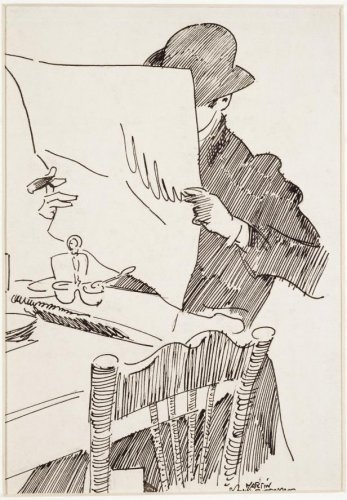
INNENPOLITISCHES / GESELLSCHAFT / VERGANGENHEITSPOLITIK
(Psychologie der herrschenden Generation)
„Die Wiedergutmacher“
Psychosen im gefühlsgeleiteten Hippiestaat
von Thorsten Hinz
https://jungefreiheit.de/kultur/literatur/2018/psychosen-im-gefuehlsgeleiteten-hippiestaat/
„Wir schaffen das“ oder deutlicher: „Deutschland schafft sich ab“
https://www.goldseiten.de/artikel/398592--Wir-schaffen-da...
Wirtschaftsentwicklung 2019 – Die deutsche Lust am Niedergang
https://www.cicero.de/wirtschaft/wirtschaftsentwicklung-2...
Auf dem Gipfel deutscher Schizophrenie
von Markus Vahlefeld
https://www.achgut.com/artikel/auf_dem_gipfel_deutscher_schizophrenie
Union ganz vorne
Das sind die größten Partei-Spenden 2018
https://www.abendzeitung-muenchen.de/inhalt.union-ganz-vorne-das-sind-die-groessten-partei-spenden-2018.d4c0239d-fad5-4813-a4cd-ccf240f8f8bd.html
Zur Wahl von Kramp-Karrenbauer zur CDU-Vorsitzenden Weitermerkeln
https://jungefreiheit.de/debatte/kommentar/2018/weitermerkeln/
Susi Neumann
„Von der SPD kann man nix mehr erwarten“- Ex-Putzfrau verkündet Austritt aus Partei https://www.focus.de/politik/deutschland/susi-neumann-von-der-spd-kann-man-nix-mehr-erwarten-ex-putzfrau-verkuendet-austritt-aus-partei_id_10022261.html
Abrechnung mit „Schlipsträgern“
Ex-Putzfrau Susanne Neumann tritt aus SPD aus
http://www.spiegel.de/politik/deutschland/spd-ex-putzfrau-susanne-neumann-tritt-aus-der-partei-aus-a-1242056.html
SPD startet neues Ausschlussverfahren gegen Thilo Sarrazin https://www.handelsblatt.com/politik/deutschland/spd-vorstand-spd-startet-neues-ausschlussverfahren-gegen-thilo-sarrazin/23769112.html?ticket=ST-86803-mnjw5ygFrGsMxqFhyyTi-ap4
Internationaler Tag
Bundesregierung: Geistig Behinderte sollen wählen dürfen https://jungefreiheit.de/politik/deutschland/2018/bundesregierung-geistig-behinderte-sollen-waehlen-duerfen/
Nach Terrroranschlag auf Berliner Weihnachtsmarkt: LKW-Besitzer zürnt über Berlin https://web.de/magazine/panorama/terrroranschlag-berliner-weihnachtsmarkt-lkw-besitzer-zuernt-berlin-33470462
Terroranschlag auf Berliner Weihnachtsmarkt
Zwei Jahre danach – und das Staatsversagen geht weiter von Michael Paulwitz
https://jungefreiheit.de/debatte/kommentar/2018/zwei-jahre-danach-und-das-staatsversagen-geht-weiter/
„Egal woran Sie glauben“
Integrationsbeauftragte verschickt weihnachtslose Weihnachtsgrüße https://jungefreiheit.de/politik/deutschland/2018/integrationsbeauftragte-verschickt-weihnachtslose-weihnachtsgruesse/
Flüchtlingskrise 2015
Bundesverfassungsgericht schmettert AfD-Klagen zur Asylpolitik ab
https://jungefreiheit.de/politik/deutschland/2018/bundesv...
Streit um das Amt der Bundestagsvizepräsidentin
Schäbiges Verhalten der Altparteien
von Jörg Kürschner
https://jungefreiheit.de/debatte/2018/schaebiges-verhalten-der-altparteien/
Schleswig-Holstein
Kieler AfD-Landtagsfraktion schließt Sayn-Wittgenstein aus https://jungefreiheit.de/politik/deutschland/2018/kieler-afd-landtagsfraktion-schliesst-sayn-wittgenstein-aus/
Eklat in Stuttgarter Landtag
Polizei begleitetet AfD-Politiker aus Plenum
https://www.n-tv.de/politik/Polizei-begleitetet-AfD-Politiker-aus-Plenum-article20770134.html
Landtagspräsidentin Muhterem Aras
„Aggression der AfD-Fraktion nimmt zu“
https://www.stuttgarter-zeitung.de/inhalt.landtagspraesidentin-muhterem-aras-aggression-der-afd-fraktion-nimmt-zu.97d09ba9-04a3-46aa-b071-a4c64265d920.html
Stuttgart
Landtagspräsidentin sieht „höchste Eskalationsstufe“ mit der AfD https://www.welt.de/politik/deutschland/article185574044/Stuttgart-Landtagspraesidentin-sieht-hoechste-Eskalationsstufe-mit-der-AfD.html
70 Jahre FDP
Die „nationalen“ und „rechten“ Wurzeln vergessen von Karlheinz Weißmann
https://jungefreiheit.de/debatte/kommentar/2018/die-nationalen-und-rechten-wurzeln-vergessen/
Nicht der letzte Akt
Deutschlands halber Ausstieg aus der Kohle
Mit einem Staatsakt hat sich Deutschland am Freitag von der Steinkohle verabschiedet. Schauplatz war das Bergwerk Prosper-Haniel im Ruhrgebiet, das letzte noch aktive. Allerdings ist der Abschied von der Kohle nur ein halber: Künftig wird Steinkohle importiert und weiter in Kraftwerken verbrannt, Braunkohle wird weiter gefördert, und wie die Zeit danach aussehen soll, ist auch noch nicht klar.
https://orf.at/stories/3105159/
Neue Feiertage für die Hauptstadt
Berlin: Tag der deutschen Kapitulation wird Feiertag https://jungefreiheit.de/politik/deutschland/2018/berlin-tag-der-deutschen-kapitulation-wird-feiertag/
17.000 ermordete Juden: Kein Prozess gegen KZ-Wachmann
https://www.faz.net/aktuell/rhein-main/prozess-gegen-kz-w...
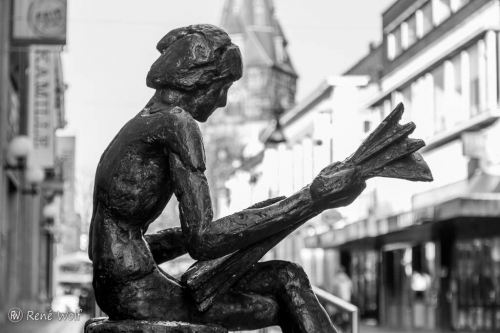
LINKE / KAMPF GEGEN RECHTS / ANTIFASCHISMUS / RECHTE
(Zur geistigen Lage der deutschen Gesellschaft)
Rechenschaftsbericht 2018 (II) – Januar bis April
von Götz Kubitschek
https://sezession.de/60034/rechenschaftsbericht-2018-ii-januar-bis-april
(Billige „Antifa“-Mobber und -Diskriminierer geben sich erneut als „Künstler“ aus) Kampagne gegen Rechts
„Zentrum für politische Schönheit“ ruft zur Denunziation auf https://jungefreiheit.de/politik/deutschland/2018/zentrum-fuer-politische-schoenheit-ruft-zur-denunziation-auf/
„Zentrum für politische Schönheit“
„Soko Chemnitz“ beschäftigt Justiz und Politik
https://jungefreiheit.de/politik/deutschland/2018/soko-chemnitz-beschaeftigt-justiz-und-politik/
„Soko Chemnitz“
„Zentrum für politische Schönheit“ schaltet Online-Pranger ab https://jungefreiheit.de/politik/deutschland/2018/zentrum-fuer-politische-schoenheit-schaltet-online-pranger-ab/
„Zentrum für Politische Schönheit“
Jagd auf Andersdenkende
von Boris T. Kaiser
https://jungefreiheit.de/debatte/kommentar/2018/jagd-auf-andersdenkende/
Neuer Totalitarismus
Mein Künstler, dein Spitzel
von Thorsten Hinz
https://jungefreiheit.de/debatte/kommentar/2018/mein-kuenstler-dein-spitzel/
(ähnliches Kaliber)
Coca-Cola-Werbung gegen die AfD? Das steckt hinter dem Plakat in Berlin https://www.gmx.net/magazine/panorama/coca-cola-werbung-a... https://jungefreiheit.de/politik/deutschland/2018/linker-adventskalender-ruft-zu-anti-afd-aktionen-auf/
Anti-Rechts-Broschüre
Sachsens Kultusminister kritisiert Amadeu-Antonio-Stiftung https://jungefreiheit.de/politik/deutschland/2018/sachsens-kultusminister-kritisiert-amadeu-antonio-stiftung/
Amadeu-Antonio-Stiftung
Zopf-Alarm und Nazi-Wahn
von Felix Krautkrämer
https://jungefreiheit.de/politik/deutschland/2018/zopf-alarm-und-nazi-wahn/
(Das war zu erwarten gewesen...)
Neuer Verfassungsschutzpräsident
Haldenwang will AfD beobachten lassen
https://www.n-tv.de/politik/Haldenwang-will-AfD-beobachten-lassen-article20759584.html
Nach Wechsel an der Spitze
Medienbericht: Verfassungsschutz will AfD beobachten
https://jungefreiheit.de/politik/deutschland/2018/medienb...
Nach „Prüffall“
AfD Thüringen klagt gegen Landesverfassungsschutz https://jungefreiheit.de/politik/deutschland/2018/afd-thueringen-klagt-gegen-landesverfassungsschutz/
(Der Verfassungsschutz hat ja nun mit der AfD zu tun...) Keine Überwachung
Bericht: Ditib nicht mehr im Visier des Verfassungsschutzes https://jungefreiheit.de/politik/deutschland/2018/bericht-ditib-nicht-mehr-im-visier-des-verfassungsschutzes/
Bürgerliche Offensive
Kampfansage an die linke Einäugigkeit
https://www.welt.de/regionales/nrw/article184778062/Kampfansage-an-die-linke-Einaeugigkeit.html
Hamburger Menetekel
„Rechts ist die Hölle – links ist der Himmel – in der Mitte ist nichts“
https://www.tichyseinblick.de/kolumnen/spahns-spitzwege/r...
(Angesichts solcher Radikalisierung wird es Zeit für ein SPD-Verbot...) SPD-Politiker Kahrs fordert AfD-Verbot
https://jungefreiheit.de/politik/deutschland/2018/spd-politiker-kahrs-fordert-afd-verbot/
Kind eines AfD-Politikers abgelehnt
Linksgrüne Sippenhaft an der Waldorfschule
von Michael Paulwitz
https://jungefreiheit.de/debatte/kommentar/2018/linksgruene-sippenhaft-an-der-waldorfschule/
Streit um AfD-Politikerkind
Eine Waldorfschule braucht Nachhilfe in Demokratie Ob privat oder öffentlich – Schulen dürfen niemanden diskriminieren. Die Ausgrenzung der Rechten nimmt seltsame Züge an.
https://www.tagesspiegel.de/politik/streit-um-afd-politikerkind-eine-waldorfschule-braucht-nachhilfe-in-demokratie/23765516.html
Die Entscheidung der Berliner Waldorfschule & die Folgen Die neuen Nazis sind totalitäre „Gutmenschen“
http://www.pi-news.net/2018/12/die-neuen-nazis-sind-totalitaere-gutmenschen/
Baden-Wüttemberg
AfD-Abgeordneter darf keine Weihnachtsgeschichte vorlesen https://jungefreiheit.de/politik/deutschland/2018/afd-abgeordneter-darf-keine-weihnachtsgeschichte-vorlesen/
Traditioneller Adventskalender
Die Post beschenkt alle Bundestagsabgeordneten – fast alle https://jungefreiheit.de/politik/deutschland/2018/die-post-beschenkt-alle-bundestagsabgeordneten-fast-alle/
Oberverwaltungsgericht Rheinland-Pfalz
Reichsbürgern dürfen Waffen entzogen werden
https://jungefreiheit.de/politik/deutschland/2018/reichsbuergern-duerfen-waffen-entzogen-werden/
Widerspruch zu Wagenknecht
Linkspartei-Chef Riexinger warnt vor deutschen „Gelbwesten“ https://jungefreiheit.de/politik/deutschland/2018/linkspartei-chef-riexinger-warnt-vor-deutschen-gelbwesten/
(Inner-Linker Konflikt. Vom „Tagesspiegel“ deshalb thematisiert, weil die Gruppe antijüdisch agiert.)
Gewalttätige Politsekte „Jugendwiderstand“
Maos Schläger aus Berlin-Neukölln
https://www.tagesspiegel.de/berlin/gewalttaetige-politsekte-jugendwiderstand-maos-schlaeger-aus-berlin-neukoelln/23729980.html
Das erfolgreichste Programm „gegen Nazis“ in der Geschichte Deutschlands Die Identitären – ein notwendiger Perspektivwechsel
http://www.pi-news.net/2018/12/die-identitaeren-ein-notwe...
Rückblick & im Gespräch mit Weltenbrand
von Martin Sellner
https://www.youtube.com/watch?v=qI5mYpWu71E
(Berliner Urania untersagt Pressefreiheit)
Tagesdosis 4.12.2018 – Zensoren in die Produktion!
https://www.youtube.com/watch?v=xVZ0-z8fFLQ
Skandal um rechte Chatgruppe: Landeskriminalamt ermittelt gegen Polizisten
https://www.gmx.net/magazine/politik/skandal-rechte-chatg...
(Und sofort wird aus der Chatgruppe in den Medien ein „rechtes Netzwerk“...) Rechtes Netzwerk in Frankfurter Polizei – Landeskriminalamt ermittelt
https://www.gmx.net/magazine/politik/rechtes-netzwerk-fra...
Hamburg
G20-Krawalle: Polizei veröffentlicht weitere Fahndungsbilder https://jungefreiheit.de/politik/deutschland/2018/g20-krawalle-polizei-veroeffentlicht-weitere-fahndungsbilder/
Frauenchiemsee
Schändung von Jodl-Grab: Täter verurteilt
https://jungefreiheit.de/politik/deutschland/2018/schaendung-von-jodl-grab-taeter-verurteilt/
Linke Gewalt – Angriffe in Halle/Saale
https://sezession.de/59976/linke-gewalt-angriffe-in-halle-saale
Baden-Württemberg
Sitzbank-Wurf gegen Auto von AfD-Abgeordneten: Polizei ermittelt
https://jungefreiheit.de/politik/deutschland/2018/sitzban...
Rosenheim: Antifa will AfD-Büro stürmen
http://www.pi-news.net/2018/12/rosenheim-antifa-will-afd-buero-stuermen/
Rosenheim
Antifa stürmt AfD-Büro – Polizei schreitet ein
https://www.youtube.com/watch?v=H3oBbHOM0wQ
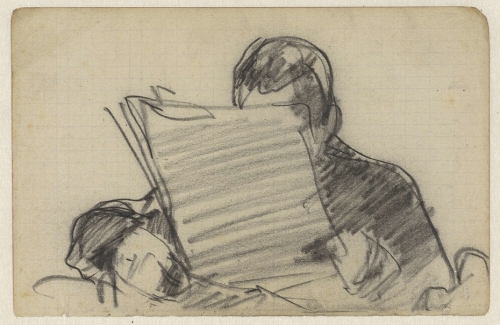
EINWANDERUNG / MULTIKULTURELLE GESELLSCHAFT
Der Migrationspakt als Elitenprojekt
https://sezession.de/59954/der-migrationspakt-als-elitenprojekt
UN-Migrationspakt: Hetze statt Fakten
https://www.youtube.com/watch?v=T3fW9rARIwY
„Lügen- und Angstkampagne“
Auswärtiges Amt beklagt Propagandafeldzug gegen Migrationspakt https://jungefreiheit.de/politik/deutschland/2018/auswaertiges-amt-beklagt-propagandafeldzug-gegen-migrationspakt/
Wohlstand migrieren, nicht Menschen!
„Eine humanistische Kritik am Wesen der Migration ist längst überfällig“, erklärt Autor und Rubikon-Beiratsmitglied Hannes Hofbauer im Exklusiv-Interview.
https://www.rubikon.news/artikel/wohlstand-migrieren-nicht-menschen
Auftritt bei UN-Migrationsgipfel
Merkel beklagt gezielte Falschmeldungen
https://www.n-tv.de/politik/Merkel-beklagt-gezielte-Falschmeldungen-article20764431.html
Kritik am Migrationspakt ist eine Mischung aus Lügen und Hetze! Das behauptet jedenfalls Angela Merkel. Was erlauben diese Frau!!!?
http://antides.de/was-erlauben-diese-frau
Kampagne gegen UN-Migrationspakt
Was bleibt? Der Tag nach Marrakesch
von Matthias Moosdorf
https://jungefreiheit.de/debatte/kommentar/2018/was-bleibt-der-tag-nach-marrakesch/
UN-Migrationspakt
Menetekel von Marrakesch
von Dieter Stein
https://jungefreiheit.de/politik/deutschland/2018/menetekel-von-marrakesch/
UNHCR-Vertreter: Andere Staaten sollen sich an Deutschland orientieren https://jungefreiheit.de/politik/deutschland/2018/unhcr-vertreter-andere-staaten-sollen-sich-an-deutschland-orientieren/
Integrationsministerin Anne Spiegel
Grünen-Politikerin fordert Einwanderungskultur
https://jungefreiheit.de/politik/deutschland/2018/gruenen-politikerin-fordert-einwanderungskultur/
Zurückweisungen an der Grenze
Seehofers Rückführungsabkommen erweisen sich als Luftnummer https://jungefreiheit.de/politik/deutschland/2019/seehofers-rueckfuehrungsabkommen-erweisen-sich-als-luftnummer/
„Politische Angriffe“: Flüchtlingsorganisation gibt „Aquarius“ auf https://jungefreiheit.de/politik/ausland/2018/politische-angriffe-fluechtlingsorganisation-gibt-aquarius-auf/
Flüchtlingsbetreuer
Die politisch-korrekte Schweigespirale durchbrechen https://jungefreiheit.de/politik/deutschland/2018/die-politisch-korrekte-schweigespirale-durchbrechen/
Fahndungserfolg
Grenzkontrollen lohnen sich
https://jungefreiheit.de/politik/deutschland/2018/grenzkontrollen-lohnen-sich/
Die Reisen der „Immigranten“ – unter der Lupe betrachtet Wem nützt es? So ein Migrationszug muss geplant und von langer Hand organisiert werden, das sagt einem schon der gesunde Menschenverstand. Diese Leute müssen wochenlang verpflegt werden, sie müssen Schlaf- und Waschgelegenheiten haben (Klos nicht zu vergessen), sie müssen Wäsche zum Wechseln haben ... Einige Überlegungen zur „Migration“.
https://www.epochtimes.de/meinung/gastkommentar/die-reisen-der-immigranten-unter-der-lupe-betrachtet-a2726033.html
(Die Wirtschaft will Einwanderung...)
Arbeitgeberpräsident hält Integration von Einwanderern für gelungen https://jungefreiheit.de/politik/deutschland/2018/arbeitgeberpraesident-haelt-integration-von-einwanderern-fuer-gelungen/
Ulrich Vosgerau zu Asylwahnsinn & Meinungsterror
https://www.youtube.com/watch?v=wklUR7i3beE
Moslems im Schwimmbad
Timke: Unsere Regeln dürfen nicht zur Disposition gestellt werden https://jungefreiheit.de/politik/deutschland/2018/timke-unsere-regeln-duerfen-nicht-zur-disposition-gestellt-werden/
Mangelnde Integration
Schröder wirft moslemischen Männern Gewaltproblem vor https://jungefreiheit.de/politik/deutschland/2018/schroeder-wirft-moslemischen-maennern-gewaltproblem-vor/
OECD-Bericht
Jeder siebte Zuwanderer in Deutschland hat nur Grundschulniveau https://www.welt.de/wirtschaft/article185252246/OECD-Jeder-siebte-Zuwanderer-hat-nur-Grundschulniveau.html
Grabschattacken
Sexuelle Belästigung: Flüchtlingsblogger Aras B. Zu Sozialstunden verurteilt https://jungefreiheit.de/politik/deutschland/2018/sexuelle-belaestigung-fluechtlingsblogger-aras-b-zu-sozialstunden-verurteilt/
Nach Verurteilung
Der jähe Absturz des Vorzeige-Migranten
von Boris T. Kaiser
https://jungefreiheit.de/debatte/kommentar/2018/der-jaehe-absturz-des-vorzeige-migranten/
Nach Suchaktion
Vermisste 17-Jährige tot in Flüchtlingsheim in Sankt Augustin gefunden https://www.ksta.de/region/rhein-sieg-bonn/sankt-augustin/nach-suchaktion-vermisste-17-jaehrige-tot-in-fluechtlingsheim-in-sankt-augustin-gefunden-31681748
Vorfall in Sankt Augustin
Starb die 17-jährige Elma C., weil sie ihren neuen Freund beleidigte? https://www.focus.de/panorama/welt/vorfall-in-sankt-augustin-starb-die-17-jaehrige-elma-c-weil-sie-ihren-neuen-freund-beleidigte_id_10021376.html
Baden-Württemberg
Mißbrauch von zwei Mädchen: Polizei nimmt Nordafrikaner fest https://jungefreiheit.de/politik/deutschland/2018/missbrauch-von-zwei-maedchen-polizei-nimmt-nordafrikaner-fest/
Oberösterreich
Mord an 16jähriger: Tatverdächtiger Afghane auf der Flucht
https://jungefreiheit.de/politik/ausland/2018/mord-an-16j...
Nordrhein-Westfalen
Kurdisch-libanesische Hochzeit sorgt für Großeinsatz https://jungefreiheit.de/politik/deutschland/2018/kurdisch-libanesische-hochzeit-sorgt-fuer-grosseinsatz/
Schwere Krawalle in Ankerzentrum in Bamberg: Elf Verletzte, neun Festnahmen https://www.gmx.net/magazine/panorama/schwere-krawalle-ankerzentrum-bamberg-verletzte-festnahmen-33460966
Festnahme in Deutschland
Serienvergewaltigung erschüttert Finnland
https://jungefreiheit.de/politik/ausland/2018/serienvergewaltigung-erschuettert-finnland/
Opfer von mildem Urteil enttäuscht
Mann ins Koma geprügelt: Schläger müssen nicht in den Knast https://www.op-online.de/region/langen/egelsbacher-koma-gepruegelt-keine-schlaeger-muss-knast-10848521.html
Neuer Asylantrag
Abgeschobener Rädelsführer von Ellwangen zurück in Deutschland https://jungefreiheit.de/politik/deutschland/2018/abgeschobener-raedelsfuehrer-von-ellwangen-zurueck-in-deutschland/

KULTUR / UMWELT / ZEITGEIST / SONSTIGES
Kunsthistoriker sieht Nervosität bei Entscheidungsträgern Kommt jetzt doch kein Kreuz auf das Berliner Stadtschloss? Das Berliner Stadtschloss wird originalgetreu nachgebaut – die Frage ist nur: Mit dem Kreuz, das früher auf der Kuppel war? Oder ohne? Die Frage schien geklärt – und bricht jetzt doch wieder auf.
https://www.katholisch.de/aktuelles/aktuelle-artikel/kommt-jetzt-doch-kein-kreuz-auf-das-berliner-stadtschloss?utm_source=aktuelle-artikel&utm_medium=Feed&utm_campaign=RSS
(...Oder die vom Nachkriegs-Wiederaufbau verschonte Stadt...) Die vom Krieg verschont gebliebene Stadt Köln
https://www.youtube.com/watch?time_continue=153&v=oXAoEnUotOc
(Ende des Moderne-Hypes auf dem Kunstmarkt?)
Villa Grisebach in Berlin : Freud und Leid des Auktionators am Pult http://www.faz.net/aktuell/villa-grisebach-in-berlin-freud-und-leid-des-auktionators-am-pult-12964876.html
(Hurra, es wurde wieder etwas gefunden...)
Kunsthalle Mannheim: NS-Raubkunst in grafischer Sammlung Die Detektivarbeit eines Provenienzforschers hat in der grafischen Sammlung der Mannheimer Kunsthalle einige Werke mit dubiosem Hintergrund zu Tage gefördert. Eine Radierung raubten die Nazis zweifelsfrei ihrem jüdischen Besitzer.
https://www.welt.de/regionales/baden-wuerttemberg/article185320820/Kunsthalle-Mannheim-NS-Raubkunst-in-grafischer-Sammlung.html
Braucht Dresden ein Bombenkriegs-Museum?
Ja!, sagt Dankwart Guratzsch, seiner Geburtsstadt, die er 1957 verließ, aufs Engste verbunden. Hier sollte am 13. Februar 2020, dem 75. Jahrestag der Zerstörung, der Startschuss für den Bau eines solchen Museums fallen. Einen Wunschstandort hat er auch schon.
http://www.dnn.de/Dresden/Lokales/Braucht-Dresden-ein-Bombenkriegs-Museum
Die USA-Lobby: Deutsche Staatsmedien im Fadenkreuz der Transatlantik-Gefolgsleute https://deutsch.rt.com/meinung/80182-usa-lobby-deutsche-staatsmedien-im-fadenkreuz-transatlantik/
Pressefreiheit adé – Frankreich führt Gesetz gegen „Fake News“ ein! https://www.youtube.com/watch?v=3cESV87dFWg&t=
Manipulation durch Reporter
SPIEGEL legt Betrugsfall im eigenen Haus offen
http://www.spiegel.de/kultur/gesellschaft/fall-claas-relotius-spiegel-legt-betrug-im-eigenen-haus-offen-a-1244579.html
„Spiegel“-Skandal um Claas Relotius
Geliefert wie gewünscht
https://jungefreiheit.de/debatte/kommentar/2018/geliefert-wie-gewuenscht/
Die und wir – erbärmlich versus konstruktiv
https://sezession.de/60014/die-und-wir-erbaermlich-versus-konstruktiv
Der Fall Relotius: Es ist ein Stein ins Lügenmeer gefallen https://www.achgut.com/artikel/der_fall_relotius_es_ist_ein_stein_in_luegenmeer_gefallen
Medien: Haltung statt Wahrheitssuche
Die FakeNews beim SPIEGEL sind kein Einzelfall: Statt zu versuchen, der Wahrheit auf die Spur zu kommen, ersetzen Journalisten Recherche durch Haltung. Diese Einstellung droht den Journalismus in Verruf zu bringen – und FakeNews als Instrument der Denunziation fällt auf die Erfinder zurück.
https://www.youtube.com/watch?v=e2MEzbLSfMg
(Weitere Fälle von Lügen in den etablierten Medien) Gerechtigkeit für Claas Relotius!
Wer über sehr viele ähnliche Medienfälle nicht reden will, der sollte über den Ex-SPIEGEL-Mann schweigen
von Alexander Wendt
https://www.publicomag.com/2018/12/gerechtigkeit-fuer-claas-relotius/?fbclid=IwAR2Y2NxIhKBHoaUJVcBmOiq52rm6pD8swOKoi_t_uKSRfOewHqRnSP7nI4I
(Vergangene Fälle von Lügen in den etablierten Medien) Der inszenierte Rassissmus
https://www.zeitenschrift.com/artikel/der-inszenierte-rassissmus
Skandal: MDR-Moderatorin berichtet wie Druck auf sie ausgeübt wurde um sie politisch............…
https://www.youtube.com/watch?v=rtPTcgOfxQg
Patriotische Youtuber
Eine neue Form der Aufklärung
von Björn Harms
https://jungefreiheit.de/kultur/medien/2018/eine-neue-form-der-aufklaerung/
(Nach der Homo-Ehe der nächste Schritt zur „Ehe für alle“) Hochzeit kostete 15.000 Euro: Wie dieser Japaner eine Zeichentrickfigur geheiratet hat
https://rp-online.de/panorama/ausland/japaner-heiratet-ho...
Transfrau Angela Ponce bei Miss Universe: „Eine Lektion für die Welt“ https://web.de/magazine/unterhaltung/lifestyle/transfrau-angela-ponce-miss-universe-lektion-welt-33469342
Japaner heiratet Hologramm
https://www.youtube.com/watch?v=N2hsHndTkJA
Katja Kraus
Ex-Nationalspielerin will Frauenquote für Vorstände von Bundesliga-Klubs
https://jungefreiheit.de/kultur/2018/ex-nationalspielerin...
Viele Kinder wünschen sich vom Nikolaus ein Handy https://www.mittelhessen.de/hessen-welt/boulevard/vermischtes_artikel,-Viele-Kinder-wuenschen-sich-vom-Nikolaus-ein-Handy-_arid,1461022.html
Das wahre Gesicht der Jusos ist unmenschlich und radikal SPD-Jugendorganisation fordert die legale Tötung von Ungeborenen bis zur Geburt
https://www.freiewelt.net/nachricht/spd-jugendorganisatio...
(Keine Luftballons mehr)
Umweltschutz
Morgen Kinder wird’s was geben – oder auch nicht
https://jungefreiheit.de/kultur/2018/morgen-kinder-wirds-...
Nur noch St. Nikolaus ohne Rute
Grüne Landtagsabgeordnete will Knecht Ruprecht abschaffen http://www.pi-news.net/2018/12/gruene-landtagsabgeordnete... https://jungefreiheit.de/politik/deutschland/2018/gruenen-politikerin-warnt-vor-knecht-ruprecht/
Gedanken über den Krampus
von Martin Lichtmesz
https://sezession.de/59985/gedanken-ueber-den-krampus
Zum revolutionären Ikonoklasmus
Sonntagsheld (86) – Konterfei-Revolution
https://sezession.de/59952/sonntagsheld-86-konterfei-revolution
„Wie in 1930er Jahren“
Künstler Ai Weiwei beklagt Stimmungswandel in Deutschland https://jungefreiheit.de/politik/deutschland/2018/kuenstler-ai-weiwei-beklagt-stimmungswandel-in-deutschland/
(Bezeichnendes Psychogramm)
Multi-Kulti-Bezirk im Umbruch Berlin-Moabit: Total zentral, aber überhaupt nicht wie Mitte https://www.rbb24.de/politik/wahl/bundestag/beitraege/moabit-berlin-wahljahr-2017-reportage.html
Straßenzeitungen
Obdachlose akzeptieren bargeldlose Bezahlung
https://www.sueddeutsche.de/medien/strassenzeitungen-obdachlose-akzeptieren-bargeldlose-bezahlung-1.4238692
„Wenn es hier so scheiße ist, warum sind Sie dann hier?“ Klartext-Buch bringt Richter Dienstaufsichtsbeschwerde ein
https://jungefreiheit.de/politik/deutschland/2018/klartex...
Die ethnische Wahl
Martin Sellner
https://sezession.de/60002/die-ethnische-wahl
JF-TV Jahresrückblick 2018
https://www.youtube.com/watch?v=wci57ltyG4E
Zum 100. Geburtstag von Helmut Schmidt
„Der große Mann mit kleiner Wirkung“
von Karlheinz Weißmann
https://jungefreiheit.de/kultur/gesellschaft/2018/der-grosse-mann-mit-kleiner-wirkung/
Fleisch-Skandal in Deutschland : Die Verrohung des Schlachtens Metzger aus Osteuropa sind überfordert, Tiere bluten bei Bewusstsein aus – und das unter den Augen amtlicher Veterinäre. Was sind die Folgen des Schlachthof-Skandals?
https://www.faz.net/aktuell/politik/inland/fleisch-skanda...
Ausbreitung der Waschbären bedroht andere Arten 1,3 Millionen Waschbären gibt es mittlerweile in Deutschland, auch in Berlin vermehren sich die Tiere rasant. Artenschützer schlagen deshalb Alarm.
https://www.tagesspiegel.de/wissen/wildtiere-ausbreitung-der-waschbaeren-bedroht-andere-arten/23808538.html
(Andreas Gabalier)
„Volksrocker“ gegen linke Medien
A Meinung haben
von Boris T. Kaiser
https://jungefreiheit.de/debatte/kommentar/2018/a-meinung-haben/
17:58 Publié dans Actualité, Affaires européennes | Lien permanent | Commentaires (0) | Tags : actualité, presse, médias, journaux, allemagne, europe, affaires européennes |  |
|  del.icio.us |
del.icio.us |  |
|  Digg |
Digg | ![]() Facebook
Facebook
vendredi, 25 janvier 2019
Tecnicidad, Biopolítica y Decadencia. Comentarios al libro "El Hombre y la Técnica" de Oswald Spengler.

Tecnicidad, Biopolítica y Decadencia.
Comentarios al libro "El Hombre y la Técnica" de Oswald Spengler.
Carlos Javier Blanco Martín
Resumen. El presente artículo es un comentario detenido de la pequeña obra de Oswald Spengler "El Hombre y la Técnica". En él desarrollamos el concepto de tecnicidad, necesario para comprender la amplia perspectiva (zoológica, naturalista, dialéctica, operatiológica) esbozada por el filósofo alemán. No se trata de un ensayo sobre la Técnica en el sentido artefactual y objetivo sino sobre el desarrollo de las capacidades operatorias (viso-quirúrgicas) de los ancestros del hombre, que lo llevaron desde la depredación hasta la Cultura, y desde la Cultura hasta la decadencia. Especialmente la decadencia de los pueblos occidentales que más han contribuido al despegue de esa tecnicidad.
Abstract. This article is a detailed commentary on Oswald Spengler's little work "The Man and the Technique". In it we develop the concept of technicality, necessary to understand the broad perspective (zoological, naturalistic, dialectic, operatiological) outlined by the German philosopher. This is not an essay on the Technique in the objective and artifactual sense, but rather on the development of the operative capacities (visual and manual) of the ancestors of man, which led him from predation to Culture, and from Culture to decline: especially the decadence of the western peoples that have contributed most to the takeoff of this technicality
Introducción. Justificación del presente comentario. Indagaciones sobre la Tecnicidad según Oswald Spengler.
 En un trabajo anterior ya quisimos hacer una aproximación antropológica al concepto spengleriano de la Técnica[i] . El presente trabajo quiere ser una prolongación del mismo, profundizando en los conceptos spenglerianos sobre la tecnicidad y lo hacemos por medio de un comentario detenido de las páginas de su pequeña obra El Hombre y la Técnica.[ii] Este breve texto spengleriano aclara muchos aspectos de la filosofía, poco sistemática y, a veces, impresionista, del gran pensador alemán, el creador de la magna obra La Decadencia de Occidente. Este breve libro traza un cuadro evolutivo de la técnica en la historia natural y cultural del hombre. Pero hace algo más: esboza de una manera dialéctica el destino fatal de los pueblos de Occidente, pueblos que han desarrollado toda su tecnicidad hasta ponerla en manos de sus enemigos. Este examen detenido de los párrafos enérgicos y vibrantes del librito puede ayudar a comprender la peculiar dialéctica pesimista –a diferencia de la optimista hegeliana- del pensador alemán Oswald Spengler. En vez de alcanzar un progresivo dominio técnico del mundo, encaminado a su mayor comodidad y salud, el hombre y sus antepasados simplemente han ido diferenciando cualidades sensitivo-etológicas desde hace millones de años, cualidades en las que ya está presente la tecnicidad, aun cuando todavía nuestros antepasados no era capaces de fabricar herramientas, o sólo empleaban órganos y partes sensomotoras de su cuerpo para ejercer su dominio. Por ello, en nuestro comentario empleamos el término tecnicidad, contrapuesto a "técnica" para hacer referencia a esas capacidades generales implícitas a la hora de ejercer dominio, control o alteración del propio medio envolvente, con independencia de la existencia de herramientas, armas u otros objetos extra-somáticos. La tecnicidad es la cualidad o el carácter técnico de algo o alguien, y no se debe circunscribir a los productos de las artes humanas o proto-humanas ni al aspecto normativo o envolvente del Espíritu Objetivo. Nuestro comentario, pues, se enmarca en el espacio antropológico. Queremos ahondar en la antropología spengleriana, tal y como llevamos haciendo desde hace unos años. [iii]
En un trabajo anterior ya quisimos hacer una aproximación antropológica al concepto spengleriano de la Técnica[i] . El presente trabajo quiere ser una prolongación del mismo, profundizando en los conceptos spenglerianos sobre la tecnicidad y lo hacemos por medio de un comentario detenido de las páginas de su pequeña obra El Hombre y la Técnica.[ii] Este breve texto spengleriano aclara muchos aspectos de la filosofía, poco sistemática y, a veces, impresionista, del gran pensador alemán, el creador de la magna obra La Decadencia de Occidente. Este breve libro traza un cuadro evolutivo de la técnica en la historia natural y cultural del hombre. Pero hace algo más: esboza de una manera dialéctica el destino fatal de los pueblos de Occidente, pueblos que han desarrollado toda su tecnicidad hasta ponerla en manos de sus enemigos. Este examen detenido de los párrafos enérgicos y vibrantes del librito puede ayudar a comprender la peculiar dialéctica pesimista –a diferencia de la optimista hegeliana- del pensador alemán Oswald Spengler. En vez de alcanzar un progresivo dominio técnico del mundo, encaminado a su mayor comodidad y salud, el hombre y sus antepasados simplemente han ido diferenciando cualidades sensitivo-etológicas desde hace millones de años, cualidades en las que ya está presente la tecnicidad, aun cuando todavía nuestros antepasados no era capaces de fabricar herramientas, o sólo empleaban órganos y partes sensomotoras de su cuerpo para ejercer su dominio. Por ello, en nuestro comentario empleamos el término tecnicidad, contrapuesto a "técnica" para hacer referencia a esas capacidades generales implícitas a la hora de ejercer dominio, control o alteración del propio medio envolvente, con independencia de la existencia de herramientas, armas u otros objetos extra-somáticos. La tecnicidad es la cualidad o el carácter técnico de algo o alguien, y no se debe circunscribir a los productos de las artes humanas o proto-humanas ni al aspecto normativo o envolvente del Espíritu Objetivo. Nuestro comentario, pues, se enmarca en el espacio antropológico. Queremos ahondar en la antropología spengleriana, tal y como llevamos haciendo desde hace unos años. [iii]
- El concepto de tecnicidad.
Spengler comienza su estudio sobre la técnica mostrando su olímpico desprecio hacia las charlas del siglo XVIII y XIX sobre la "cultura". Desde las robinsonadas al mito del "buen salvaje", los "hombres de cultura" que habían llenado los salones europeos de aquellos años habían olvidado por completo el verdadero papel de la técnica en la civilización. El arte, la poesía, la novela, la cultura entendida como segunda naturaleza sublime del hombre, relumbraban en la mente de ilustrados y románticos, y con ese resplandor se cegaban a las realidades terribles de que estaba preñado el siglo XX, cuando el contexto geopolítico, social y económico ya había mutado por completo y la Ilustración o el romanticismo sólo habitaba en la mente retardataria de los demagogos y los "intelectuales", no en los hombres fácticos y de acción. El escalpelo de Spengler se extiende hasta los utilitaristas ingleses. Para ellos la técnica era el recurso idóneo para instaurar la holgazanería en el mundo:
Aber nützlich war, was dem »Glück der Meisten« diente. Und Glück bestand im Nichtstun. Das ist im letzten Grunde die Lehre von Bentham, Mill und Spencer. Das Ziel der Menschheit bestand darin, dem einzelnen einen möglichst großen Teil der Arbeit abzunehmen und der Maschine aufzubürden. Freiheit vom »Elend der Lohnsklaverei« und Gleichheit im Amüsement, Behagen und »Kunstgenuß«: das »panem et circenses« der späten Weltstädte meldet sich an. Die Fortschrittsphilister begeisterten sich über jeden Druckknopf, der eine Vorrichtung in Bewegung setzte, die – angeblich – menschliche Arbeit ersparte. An Stelle der echten Religion früher Zeiten tritt die platte Schwärmerei für die »Errungenschaften der Menschheit«, worunter lediglich Fortschritte der arbeitersparenden und amüsierenden Technik verstanden wurden. Von der Seele war nicht die Rede.
"Útil, empero, era lo que sirve a la "felicidad del mayor número". Y esta felicidad consistía en no hacer nada. Tal es, en último término, la doctrina de Bentam, Mill y Spencer, El fin de la Humanidad consistía en aliviar al individuo de la mayor cantidad posible de trabajo, cargándola a la máquina. Libertad de "la miseria, de la esclavitud asalariada" [Elend der Lohnsklaverei] e igualdad en diversiones, bienandanza y “deleite artístico”. Anúnciase el panem et circenses de las urbes mundiales en las épocas de decadencia. Los filisteos de la cultura se entusiasmaban a cada botón que ponía en marcha un dispositivo y que, al parecer, ahorraba trabajo humano. En lugar de la auténtica religión de épocas pasadas, aparece el superficial entusiasmo “por las conquistas de la Humanidad” [Errungenschaften der Menschheit], considerando como tales exclusivamente los progresos de la técnica, destinados a ahorrar trabajo y a divertir a los hombres. Pero del alma, ni una palabra." [iv]
La técnica para el utilitarismo inglés era vista como instancia ahorradora de trabajo, como mera herramienta liberadora de esclavitud del trabajo asalariado, pero no como la esencia misma del hombre fáustico, del hombre que transforma el mundo, que lo modifica substancialmente. Oswald Spengler repudia con toda su rabia y fuerzas ese sentimentalismo vulgar que arranca de Rousseau, de los románticos y también de los "progresistas". Un sentimentalismo que reduce la filosofía de la Historia a mero "optimismo", esto es, un estado de ánimo confiado y tranquilizador en el cual ya no habrá más guerras ni dominaciones de unos pueblos sobre otros. Un estado de quietud que, al modo más nietzscheano, Spengler intuye como deprimente, laminador, una antesala de un suicidio colectivo, un estado alienado y de falsedad. La Historia de los hombres sigue su curso con completa independencia de sus deseos, anhelos y expectativas. Como acontece con las leyes de la naturaleza, inexorables y devoradoras de civilizaciones, razas y universos enteros, las "leyes" de la historia siguen su marcha con independencia absoluta de nuestra mente.
Para comprender los tiempos, al hombre, a la vida que nos toca –históricamente- vivir, se precisa de una facultad especial, el "tacto fisiognómico":

Der physiognomische Takt, wie ich das bezeichnet habe, was allein zum Eindringen in den Sinn alles Geschehens befähigt, der Blick Goethes, der Blick geborener Menschenkenner, Lebenskenner, Geschichtskenner über die Zeiten hin erschließt im einzelnen dessen tiefere Bedeutung.
"El tacto fisiognómico, como he denominado la facultad que nos permite penetrar en el sentido de todo acontecer; la mirada de Goethe, la mirada de los que conocen a los hombres y conocen la vida, y conocen la Historia y contemplan los tiempos, es la que descubre en lo particular su significación profunda" [v].
El naturalismo, el determinismo, de la misma manera que el "culturalismo", se mostrarán incapaces de comprender el significado de la técnica en la historia de los hombres. Hace falta el tacto fisiognómico, es preciso sentir esa especie de empatía o intuición hacia lo que hacen las distintas clases de hombres, para así poder insertar adecuadamente el papel de la técnica en la cultura. La técnica no es la pariente pobre de la Cultura. No se trata de la versión ínfima de "cuanto puede hacer el Homo sapiens". Esta especie "sapiente" que construye catedrales góticas, compone sinfonías, escribe El Quijote, la Suma Teológica o la Ilíada, es también la especie que ha comenzado empuñando palos, forjado espadas o construido cañones anti-aéreos. La técnica –y de entre ella, la técnica depredatorio-bélica- sería la versión grisácea, deprimente, prosaica de la sublime Cultura. El naturalismo verá la evolución desde la maza asesina hasta el cohete espacial (recordemos la genial escena cinematográfica de Stanley Kubrick en 2001, Una Odisea Espacial). El determinismo, cercano al naturalismo y, a veces, complementario de éste, verá en la técnica una condición sine qua non de la Cultura sublime, condición que habrá que retirar del escenario convenientemente cuando ya actúe la Cultura sublime (Bellas Artes, Poesía, Espíritu, etc.). Finalmente, el "culturalismo", que Spengler detesta, pues representa el idealismo y la ceguera ignorante de los "literatos", escinde en dos la vida humana, una mitad sublime y otra prosaica; la mitad "prosaica" es condenada a la oscuridad por el idealismo rampante (pero también por el utilitarismo y el materialismo dialéctico) una vez que ha brotado la Cultura. Pero he aquí que el Filósofo de la Historia no puede ni debe dejar de lado aquello que es consustancial a la vida humana en su devenir. La técnica, reivindicada ahora por Spengler desde un naturalismo mucho más profundo, es esencial a la vida misma de todos los animales. La técnica no es la colección de "cosas" que ha producido el hombre para matar, destruir, crear, dominar. La técnica no se deja reducir a un estudio "supra-orgánico", "extra-somático", "objetivo". En la propia organicidad animal ya está presente la técnica:
 Das ist der andre Fehler, der hier vermieden werden muß: Technik ist nicht vom Werkzeug her zu verstehen. Es kommt nicht auf die Herstellung von Dingen an, sondern auf das Verfahren mit ihnen, nicht auf die Waffe, sondern auf den Kampf
Das ist der andre Fehler, der hier vermieden werden muß: Technik ist nicht vom Werkzeug her zu verstehen. Es kommt nicht auf die Herstellung von Dingen an, sondern auf das Verfahren mit ihnen, nicht auf die Waffe, sondern auf den Kampf
"Este es el otro error que debe evitarse aquí: la técnica no debe comprenderse partiendo de la herramienta. No se trata de la fabricación de cosas, sino del manejo de ellas; no se trata de las armas, sino de la lucha."[vi]
La técnica no es la herramienta [Werkzeug], una suerte de prolongación extra-somática y objetiva del sujeto humano. La técnica, en realidad, es el manejo [Verfahren] con las cosas. Este es el corazón del comienzo del librito de Spengler: la técnica es la táctica de la vida. La vida no es una colección de cosas, a saber: sujetos corpóreos y objetos producidos por esos sujetos corpóreos. Esta sería la miope visión compartida al alimón por idealistas y por realistas. Los primeros se fijan en la "creatividad" del sujeto hacedor (se "crean" tanto obras de arte como misiles de cabeza nuclear), y los segundos paran mientes en lo creado. Pero en medio está la vida misma, la acción, a saber, el uso de los medios para la lucha.
- La Biopolítica spengleriana. Un naturalismo dialéctico.
La vida es comprendida como una guerra ya en sus más arcaicos estratos zoológicos.
Es gibt keinen »Menschen an sich«, wie die Philosophen schwatzen, sondern nur Menschen zu einer Zeit, an einem Ort, von einer Rasse, einer persönlichen Art, die sich im Kampfe mit einer gegebenen Welt durchsetzt oder unterliegt, während das Weltall göttlich unbekümmert ringsum verweilt. Dieser Kampf ist das Leben, und zwar im Sinne Nietzsches als ein Kampf aus dem Willen zur Macht, grausam, unerbittlich, ein Kampf ohne Gnade.
"No existe el “hombre en sí” — palabrería de filósofos —, sino sólo los hombres de una época, de un lugar, de una raza, de una índole personal, que se imponen en lucha con un mundo dado, o sucumben, mientras el universo prosigue en torno su curso, como deidad erguida en magnífica indiferencia. Esa lucha es la vida; y lo es, en el sentido de Nietzsche, como una lucha que brota de la voluntad de poderío; lucha cruel, sin tregua; lucha sin cuartel ni merced" [vii] .
Si Spengler rechaza tanto el idealismo como el realismo en su tratamiento de la técnica, otro tanto se ha de decir de la "antropología predicativa". "El hombre"… ¿qué es? Si hablamos de un Homo faber –hombre fabricante- pensado con el mismo formato que el concepto de Homo sapiens, sapiente, estamos eligiendo un predicado esencial que definirá a esta especie animal concreta a la que pertenecemos. Hay poca ganancia con respecto a estas antropologías tradicionales si al Homo, a nuestro género, le añadimos el predicado de "animal técnico". No existe el "hombre en sí" [Es gibt keinen »Menschen an sich«]. No hay tal cosa previamente definida, recortada, a la cual podamos asignarle (casi, podríamos decir "inyectarle") la cualidad esencial de su tecnicidad, de la misma manera que antaño se decía del hombre que era un "animal social" o "animal racional". No hay que hablar de tecnicidad de ese "Hombre" pre-dado . De lo que se ha de hablar es de una lucha cósmica eterna, en la que se insertan los seres vivos de todas las escalas zoológicas. A las enormes galaxias y a los descomunales astros les resulta por completo indiferente el resultado de esta minúscula guerra, una contienda ésta que para sus héroes y víctimas sin embargo les es esencial. La antroposfera de éste diminuto planeta es una capa extrafina y efímera que nada importa en el decurso del universo. Los hombres mueren por "pequeñas cosas" desde el punto de vista cósmico, aun cuando esas "pequeñeces" como la defensa de la patria, la preservación de un ideal, de una civilización o una fe comporten un valor infinito a los actores humanos.
Y estos supuestos valores supremos, relativos entre las mismas culturas humanas, y susceptibles de relativización a escalas supra-humanas, cósmicas, son en gran medida "mentira" si tras de ellos captamos su esencia: la voluntad de poder. En efecto, según Spengler, "el hombre es un animal de rapiña" [viii] [Denn der Mensch ist ein Raubtier.]. Depredador, es la palabra castellana que de la manera más neutra y zoológica describe nuestra condición. A años luz nos hallamos de los herbívoros. La clave de nuestra evolución como primates estriba en la depredación. El hombre como depredador encarna un estilo de vida, una complexión físico-espiritual que los métodos naturalistas groseros no podrán captar. Sabido es que Spengler apuesta por el naturalismo de Goethe y de la fisiognómica, y no por el materialismo de Linneo y de Darwin. Las "ciencias de la vida" estudian cadáveres y compuestos físico-químicos, diseccionan y clasifican, buscan causas deterministas al modo mecanicista, pero renuncian y hasta desprecian "el tacto fisiognómico". Este tacto, imprescindible para la comprensión de la vida, nos da la clave de la tecnicidad. La clave consiste en una superación del carácter pasivo de los sujetos vivos. De la planta podemos decir que "en ella y en torno a ella está la vida" más que afirmar, propiamente, que es un ser vivo[ix]. En rigor, es un "escenario" [Schauplatz] de los procesos vivientes.
Eine Pflanze lebt, obwohl sie nur im eingeschränkten Sinne ein Lebewesen ist. In Wirklichkeit lebt es in ihr oder um sie herum. »Sie« atmet, »sie« nährt sich, »sie« vermehrt sich, und trotzdem ist sie ganz eigentlich nur der Schauplatz dieser Vorgänge, die mit solchen der umgebenden Natur, mit Tag und Nacht, mit Sonnenbestrahlung und der Gärung im Boden eine Einheit bilden, so daß die Pflanze selbst nicht wollen und wählen kann. Alles geschieht mit ihr und in ihr. Sie sucht weder den Standort, noch die Nahrung, noch die andere Pflanze, mit welcher sie die Nachkommen erzeugt. Sie bewegt sich nicht, sondern der Wind, die Wärme, das Licht bewegen sie.
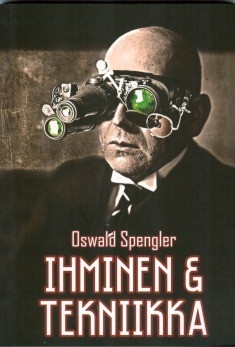 "La planta vive; aunque sólo en sentido limitado, es un ser viviente. En realidad, más que vivir puede decirse que en ella y en torno a ella está la vida. “Ella” respira, “ella” se alimenta, “ella” se multiplica; y, sin embargo, no es propiamente más que el escenario de esos procesos, que constituyen una unidad con los procesos de la naturaleza circundante, con el día y la noche, con los rayos del sol y la fermentación del suelo; de suerte que la planta misma no puede ni querer ni elegir. Todo acontece con ella y en ella. Ella no busca ni su lugar propio, ni su alimento, ni las demás plantas con quienes engendra su sucesión. No se mueve, sino que son el viento, el calor, la luz, quienes la mueven." [x]
"La planta vive; aunque sólo en sentido limitado, es un ser viviente. En realidad, más que vivir puede decirse que en ella y en torno a ella está la vida. “Ella” respira, “ella” se alimenta, “ella” se multiplica; y, sin embargo, no es propiamente más que el escenario de esos procesos, que constituyen una unidad con los procesos de la naturaleza circundante, con el día y la noche, con los rayos del sol y la fermentación del suelo; de suerte que la planta misma no puede ni querer ni elegir. Todo acontece con ella y en ella. Ella no busca ni su lugar propio, ni su alimento, ni las demás plantas con quienes engendra su sucesión. No se mueve, sino que son el viento, el calor, la luz, quienes la mueven." [x]
La vida, pues, en su estrato ínfimo, vegetal, si bien es un entrecruzamiento de procesos vitales (ellos mismos activos), el sujeto o "escenario" donde acontecen consiste, no obstante, en un mero receptáculo dominado por la pasividad. La vida vegetal es sometimiento al mundo-entorno [umgebenden Natur], a la naturaleza envolvente. A su vez, la vida vegetal es el sustrato sobre el que se asienta la "vida movediza" [freibewegliche Leben], esto es, el Reino animal. El carácter móvil, auto-portátil por así decir, de la vida animal es ya una forma de libertad, de sobre-posición, por encima de la situación pasiva y sometida del vegetal. Pero la movilidad libre de las criaturas animales está, a su vez, dividida en dos escalones: la vida del herbívoro, hecha para huir, y la vida del carnívoro, para depredar.
Es a través de la primacía de alguno de los sentidos como se crea un mundo-entorno específico para cada uno de los dos escalones de lo animal. El oído para los herbívoros, nacidos para huir o caer como presas, y el ojo –la mirada- para los cazadores, los más libres y sagaces de entre los animales. Este predominio sensorial unilateral, según parece decirnos Spengler, determina los distintos mundos-entorno.
Erst durch die geheimnisvolle und von keinem menschlichen Nachdenken zu erklärende Art der Beziehungen zwischen dem Tier und seiner Umgebung mittels der tastenden, ordnenden, verstehenden Sinne entsteht aus der Umgebung eine Umwelt für jedes einzelne Wesen. Die höheren Pflanzenfresser werden neben dem Gehör vor allem durch die Witterung beherrscht, die höheren Raubtiere aber herrschen durch das Auge. Die Witterung ist der eigentliche Sinn der Verteidigung. Die Nase spürt Herkunft und Entfernung der Gefahr und gibt damit der Fluchtbewegung eine zweckmäßige Richtung von etwas fort.
"La misteriosa índole — por ninguna reflexión humana explicable — de las relaciones entre el animal y su contorno, mediante los sentidos palpadores, ordenadores e intelectivos, es la que convierte el contorno en un mundo circundante para cada ser en particular. Los herbívoros superiores son dominados por el oído y, sobre todo, por el olfato. Los rapaces superiores, en cambio, dominan por la mirada. El olfato es el sentido propio de la defensa. Por la nariz rastrea el animal el origen y la distancia del peligro, dando así a los movimientos de huida una dirección conveniente: la dirección que se aleja del peligro. [xi]
El "contorno" [Umgebung] al cual todavía se veía sometida la planta, es en el animal un mundo-entorno [Umwelt]. Cada especie animal lo percibe a su modo. Las teorías de von Uexküll, conocidas por Spengler, resuenan aquí. Pero ese mundo percibido de manera distinta por cada especie determina, a su vez, una básica relación de poder, la relación de dominante a dominado. De la Biología teórica se pasa recta y necesariamente a una Biopolítica. En la propia Biología teórica se pre-contiene la base zoológica del Poder. La mirada del animal de presa es ya una mirada que busca obtener botín y dominio, que fija rectilínea y frontalmente sus objetivos.
Para el depredador, "el mundo es la presa" [Die Welt ist die Beute]. Spengler nos describe así el origen de la Cultura, la raíz del mundo histórico específico del ser humano. Justamente como el hueso-maza, el arma letal en manos de un simio, se transforma en la película 2001 Una Odisea Espacial, en un artefacto cosmonáutico, la tecnicidad del hombre hunde sus raíces en el propio escalonamiento superior del ancestro, el homínida comedor y cazador de otros animales.
Ein unendliches Machtgefühl liegt in diesem weiten ruhigen Blick, ein Gefühl der Freiheit, die aus Überlegenheit entspringt und auf der größeren Gewalt beruht, und die Gewißheit, niemandes Beute zu sein. Die Welt ist die Beute, und aus dieser Tatsache ist letzten Endes die menschliche Kultur erwachsen
"Un sentimiento infinito de poderío palpita en esa mirada larga y tranquila; un sentimiento de libertad que brota de la superioridad y descansa en el mayor poder, en la certidumbre de no ser nunca botín ni presa de nadie. El mundo es la presa; y de este hecho, en último término, ha nacido toda la cultura humana." [xii]
 Esa mirada poderosa, unida a ese sentimiento de poder, es el germen de la Historia. Y la Historia se individualiza. No se trata de una historia de las masas. Las masas no poseen la historia. Antes de alzarse culturas individualizadas, en la fase zoológica y pre-cultural, la Historia la hacen los individuos. El animal de presa destaca y se recorta ante el animal de rebaño. El herbívoro precisa de muchos como él, y entre ellos (como luego, en las sociedades de masas) una muchedumbre de iguales constituye ya el individuo. Ha de verse aquí, en El Hombre y la Técnica, no una teoría, en el sentido riguroso o científico, sino una analogía. Spengler discurre por analogías, y esas analogías presiden toda su filosofía de la historia. Si una Cultura es, toda ella, un ser vivo dotado de su morfología propia y de su propio ciclo vital, un herbívoro es un análogo de un "hombre masa". El hombre masa del siglo XIX y XX es un retroceso hacia la animalización, pero hacia la animalización del escalón inferior, la de la presa, la del cobarde herbívoro.
Esa mirada poderosa, unida a ese sentimiento de poder, es el germen de la Historia. Y la Historia se individualiza. No se trata de una historia de las masas. Las masas no poseen la historia. Antes de alzarse culturas individualizadas, en la fase zoológica y pre-cultural, la Historia la hacen los individuos. El animal de presa destaca y se recorta ante el animal de rebaño. El herbívoro precisa de muchos como él, y entre ellos (como luego, en las sociedades de masas) una muchedumbre de iguales constituye ya el individuo. Ha de verse aquí, en El Hombre y la Técnica, no una teoría, en el sentido riguroso o científico, sino una analogía. Spengler discurre por analogías, y esas analogías presiden toda su filosofía de la historia. Si una Cultura es, toda ella, un ser vivo dotado de su morfología propia y de su propio ciclo vital, un herbívoro es un análogo de un "hombre masa". El hombre masa del siglo XIX y XX es un retroceso hacia la animalización, pero hacia la animalización del escalón inferior, la de la presa, la del cobarde herbívoro.
La analogía naturalista de Spengler discurre por canales muy diversos al naturalismo metafísico de Schopenhauer, aunque también conduce al pesimismo, o el de Darwin que induce a pensar en términos progresistas y, por ende, optimistas. El hombre es más que un mono. El hombre es más que un cuerpo que, por búsqueda de homologías rigurosas, esté próximo a los primates. La anatomía evolucionista, y, antes que ella, el comparatismo linneano, tratan ante todo con cadáveres. Los cuerpos estáticos de los científicos naturales son, en opinión de Spengler, naturalezas muertas. Frente a esta biología cadavérica Spengler busca el contacto con una filosofía de la biología de los cuerpos en acción. Tal concepción encuentra analogías en las acciones mismas. De tales analogías no hay razones para quejarse de un "antropomorfismo". Decir que es antropomorfismo que ciertos insectos "conocen la agricultura" o "practican la esclavitud", por ejemplo, sólo podría justificarse si admitiéramos que el hombre es un punto de vista privilegiado. De manera cerrada, y por tanto "ilógica", el círculo del antropomorfismo ve antropomorfismo en nuestras atribuciones acerca de las acciones de los animales. Lo que Spengler quiere decirnos simplemente es que la aparición de instituciones culturales, históricas, cuenta siempre con análogos zoológicos. El plano institucional en el que se puede hablar, como historiador, de una agricultura, una milicia, un Estado, una técnica, una esclavitud en una cultura humana es un plano que "corta" geométricamente con el plano zoológico y con el cual, al menos, hay una recta, una línea de puntos muy reales, donde también estarán presentes esos análogos.
- La tecnicidad y la analogía zoológica.
Ciñéndonos a la tecnicidad, Spengler la quiere ver en las más diversas escalas zoológicas, como ya llevamos visto. Pero no obstante se trata de una tecnicidad muy diversa. Y es que el método analógico, de gran aplicación en filosofías muy distintas a la spengleriana (p.e. en el tomismo) nos recuerda que la relación entre dos términos en parte distintos y en parte semejantes puede establecerse en orden a penetrar de alguna manera en un sector ignoto del mundo. Esta relación de analogía, y no de identidad, es legítima, cuidando de no bascular nunca hacia la univocidad ni hacia la equivocidad. Es una relación susceptible de quedar establecida en función de una proporción o regla. La técnica de los animales es análoga a la de los animales, pero no lo es en todos los aspectos ni en la misma medida. Los castores hacen presas y los ingenieros humanos también. Pero no igual, no en la misma medida. La tecnicidad del hombre es, por así decir, diferenciada. En el hombre se da la individualidad mientras que en el animal esa individualidad se pierde y se difumina en la especie:
Die Technik dieser Tiere ist Gattungstechnik.
"La técnica de los animales es técnica de la especie". [xiii]
La de los animales no humanos es técnica genérica (Gattung). Está incorporada en su instinto, y es invariable. El sujeto es aquí, como vimos en el caso de las plantas, un vehículo o escenario de la voz de la especie. Es una técnica no individualizada, invariable.[xiv]
Die Menschentechnik und sie allein aber ist unabhängig vom Leben der Menschengattung. Es ist der einzige Fall in der gesamten Geschichte des Lebens, daß das Einzelwesen aus dem Zwang der Gattung heraustritt. Man muß lange nachdenken, um das Ungeheure dieser Tatsache zu begreifen. Die Technik im Leben des Menschen ist bewußt, willkürlich, veränderlich, persönlich, erfinderisch. Sie wird erlernt und verbessert. Der Mensch ist der Schöpfer seiner Lebenstaktik geworden. Sie ist seine Größe und sein Verhängnis. Und die innere Form dieses schöpferischen Lebens nennen wir Kultur, Kultur besitzen, Kultur schaffen, an der Kultur leiden. Die Schöpfungen des Menschen sind Ausdruck dieses Daseins in persönlicher Form.
"La técnica humana, y sólo ella, es, empero, independiente de la vida de la especie humana. Es el único caso, en toda la historia de la vida, en que el ser individual escapa a la coacción de la especie. Hay que meditar mucho para comprender lo enorme de este hecho. La técnica en la vida del hombre es consciente, voluntaria, variable, personal, inventiva. Se aprende y se mejora. El hombre es el creador de su táctica vital. Esta es su grandeza y su fatalidad. Y la forma interior de esa vida creadora llamémosla cultura, poseer cultura, crear cultura, padecer por la cultura. Las creaciones del hombre son expresión de esa existencia, en forma personal."[xv]
 El hombre es artífice de su táctica vital [Der Mensch ist der Schöpfer seiner Lebenstaktik geworden]. Esta palabra, "táctica", es crucial para comprender la gran analogía belicista que recorre por igual la filosofía de la naturaleza y la filosofía de la historia spenglerianas. De esa creación libre brota, no obstante, un plano nuevo de coacción y de condena sobre los aprendices de brujo que son los humanos. El Espíritu Objetivo podrá verse, hegelianamente, como un fruto de la libertad esencial de los hombres, pero, a la par, se alza como envoltorio determinante y coactivo que canaliza y bloquea los cursos en principio libres de los sujetos. Es una libertad que se auto-restringe al devenir objetivo. La cultura no es ya, sin más, el Reino de la Libertad confrontado al Reino de la Necesidad (material y físico-química). La optimista dualidad kantiana, como en general la optimista y felicitaría dualidad teológico-cristiana de la que partía, ya ha quedado atrás. De la cultura también procede un destino, una fatalidad [Verhängnis].
El hombre es artífice de su táctica vital [Der Mensch ist der Schöpfer seiner Lebenstaktik geworden]. Esta palabra, "táctica", es crucial para comprender la gran analogía belicista que recorre por igual la filosofía de la naturaleza y la filosofía de la historia spenglerianas. De esa creación libre brota, no obstante, un plano nuevo de coacción y de condena sobre los aprendices de brujo que son los humanos. El Espíritu Objetivo podrá verse, hegelianamente, como un fruto de la libertad esencial de los hombres, pero, a la par, se alza como envoltorio determinante y coactivo que canaliza y bloquea los cursos en principio libres de los sujetos. Es una libertad que se auto-restringe al devenir objetivo. La cultura no es ya, sin más, el Reino de la Libertad confrontado al Reino de la Necesidad (material y físico-química). La optimista dualidad kantiana, como en general la optimista y felicitaría dualidad teológico-cristiana de la que partía, ya ha quedado atrás. De la cultura también procede un destino, una fatalidad [Verhängnis].
- El hombre se ha hecho hombre por la mano.
Del carnívoro y depredador, cuyo órgano señorial es el ojo, pasamos al animal de la técnica en el sentido propio y formal, el animal que domina por medio de sus manos. Ese animal es ya el hombre. Dice Spengler que "el hombre se ha hecho hombre por la mano" [Durch die Entstehung der Hand.][xvi].
El ojo y la mano se complementan en lo que respecta a la dominación del mundo-entorno. El ojo domina desde el punto de vista teórico, y la mano desde el punto de vista práctico, nos dice el autor de El Hombre y la Técnica. El relato que nuestro filósofo nos brinda respecto a la aparición de la mano es de todo punto inaceptable. En el texto que comentamos se habla de una aparición repentina. A Spengler no se le pasa por la cabeza, al menos en relación con éste tema, la existencia de una causalidad circular alternativa a la "aparición súbita". La mano, junto con la marcha erguida, la técnica, la posición de la cabeza, etc. son novedades ellas que se podrían explicar de forma evolucionista pero no necesariamente en términos de sucesión lenta y gradual. En la antropología evolucionista se pueden establecer modelos de realimentación causal en donde las novedades "empujan" a otras, ofreciendo ventajas sinérgicas en cuanto a adaptación. Así parece haber sido el proceso de hominización, ciertamente un proceso acelerado, en donde el ritmo del cambio se hace vertiginoso. El papel de la mano en ese conjunto de procesos sinérgicos parece haber sido determinante. En esta misma revista hemos dado noticia de las investigaciones del profesor Manuel Fernández Lorenzo en ese sentido.[xvii]
Por el contrario, los prejuicios anti-evolucionistas de Spengler, y su apuesta por el mutacionismo de Hugo de Vries, hoy tan desacreditado, lastran la genial intuición. La mano hizo al hombre: he aquí una proposición que damos como cierta siempre y cuando no se oscurezcan las otras novedades bioculturales que, en sinergia con la conversión de la garra en mano, nos diferenciaron de manera muy notable dentro del grupo de los primates. Lo que Spengler ve como simultaneidad, nosotros deberíamos hoy analizarlo (con los enormes datos disponibles hoy por la paleoantropología, inexistentes en la época en que nuestro filósofo vivió) en términos de causalidad circular y sinérgica. De hecho, en el siguiente párrafo se podría vislumbrar este enfoque sustituyendo la simultaneidad repentina por este tipo de causalidad:
Aber nicht nur müssen Hand, Gang und Haltung des Menschen gleichzeitig entstanden sein, sondern auch – und das hat bis jetzt niemand bemerkt – Hand und Werkzeug. Die unbewaffnete Hand für sich allein ist nichts wert. Sie fordert die Waffe, um selbst Waffe zu sein. Wie sichdas Werkzeug aus der Gestalt der Hand gebildet hat, so umgekehrt die Hand an der Gestalt des Werkzeugs. Es ist sinnlos, das zeitlich trennen zu wollen. Es ist unmöglich, daß die ausgebildete Hand auch nur kurze Zeit hindurch ohne Werkzeug tätig war. Die frühesten Reste des Menschen und seiner Geräte sind gleich alt.
"Pero no sólo la mano, la marcha y la actitud del hombre debieron surgir a la vez, sino también — y esto es lo que nadie ha observado hasta hoy — la mano y la herramienta. La mano inerme no tiene valor por sí sola. La mano exige el arma, para ser ella misma arma. Así como la herramienta se ha formado por la figura de la mano, así inversamente la mano se ha hecho sobre la figura de la herramienta. Es absurdo pretender separarlas en el tiempo. Es imposible que la mano ya formada haya actuado ni aun por poco tiempo sin herramienta. Los más antiguos restos humanos y las más antiguas herramientas tienen la misma edad." [xviii]
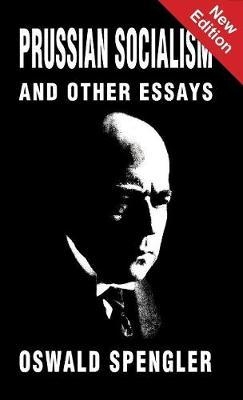 La forma o figura [Gestalt] de la mano determina la de la herramienta, y viceversa. La garra no precisa de herramientas. Cuando la garra del simio comienza a tomar palos y emplearlos, inicial y esencialmente como armas, ésta garra ya deviene mano. Y en este momento ya nace un nuevo tipo de depredador: no es sólo el depredador de los ojos, con un pensamiento ocular, sino un pensar de la mano. Ojo y manos, en el plano sensomotor, representan por analogía la doble faceta del pensar humano, el plano cognoscitivo: el pensar intelectual (relaciones causa-efecto) y el pensar práctico (relaciones medio-fin).
La forma o figura [Gestalt] de la mano determina la de la herramienta, y viceversa. La garra no precisa de herramientas. Cuando la garra del simio comienza a tomar palos y emplearlos, inicial y esencialmente como armas, ésta garra ya deviene mano. Y en este momento ya nace un nuevo tipo de depredador: no es sólo el depredador de los ojos, con un pensamiento ocular, sino un pensar de la mano. Ojo y manos, en el plano sensomotor, representan por analogía la doble faceta del pensar humano, el plano cognoscitivo: el pensar intelectual (relaciones causa-efecto) y el pensar práctico (relaciones medio-fin).
- Intelecto y Praxis.
Ambas formas de pensamiento representan una liberación frente al "pensar de la especie" de los demás animales. En el pensar de la especie no hay individuación. La especie "piensa" por el individuo y ese pensar es acción instintiva. En cambio, en el hombre el pensar es acción personal y creativa. Y desde la lejana prehistoria parece prepararse una doble clase o condición en el ser de los hombres: el hombre teórico (sacerdote, científico y filósofo) que busca y atesora verdades, y el hombre fáctico, el de los hechos (negociante, general, estadista)[xix].
Esta distinción presenta un carácter universal, pues entrecruza las más diversas culturas y civilizaciones. En todas ellas hay la suficiente diversidad humana como para que uno pueda nacer en el grupo "contemplativo" o en el "fáctico" y desarrollarse cada individuo según ese particular destino. De todas las maneras da la impresión de que las civilizaciones, esto es, las culturas rígidas que ya han iniciado su inexorable declive, propenden a extender y encumbrar un tipo de hombre contemplativo progresivamente ciego y sordo ante los hechos, y tienden igualmente a favorecer modos de vida poco realistas, poco pragmáticos e incluso modos de vida claramente contrarios a la adaptación y al más básico instinto de supervivencia. Modos de vida en los cuales se extienden los sabios "que huyen del mundo" y de otros muchos papanatas que les imitan, mientras a las puertas de sus ciudades o en el limes cada vez peor defendido, aguardan los bárbaros, sedientos de sangre, hambrientos de riquezas o simplemente hambrientos. Y en ese momento crucial del declive de una civilización, cuando los sabios huyen del mundo, vale decir simplemente que "huyen", y ya no hay hombres de hechos que sepan afrontarse con el abismo, se puede decir que todo está perdido. La sabiduría del ojo, que inicialmente fue la sagacidad y claridad del animal de presa, no se ha visto debidamente potenciada por la astucia de la mano, la del animal de acción, facta et non verba.
Nuestro filósofo remonta la tecnicidad hasta los estratos más básicos de la vida, y sólo en la animalidad superior, depredadora, encuentra la verdadera base sensomotora para la técnica –el ojo y la mano. Sin embargo no cifra en esta base la aparición del "arte". El "arte" es enfrentamiento con la naturaleza. Ya no es sólo la lucha contra el animal (caza) y contra el semejante (guerra), es la guerra contra la naturaleza. Es una guerra que se alza cuando la propia cultura objetiva extiende su capa sobre la historia de los hombres, y los hombres se desdoblan en teóricos y prácticos, y aun la propia práctica se desdobla en la praxis constructiva y en la praxis ejecutiva (como dice Spengler, hay quien sabe fabricar un violín y hay quien sabe tocarlo). Lo mismo hemos de ver con las armas: quienes las inventaron, quienes desarrollaron las bases científico-tecnológicas para su existencia –la cultura occidental- pueden ser hoy las víctimas de sus propios ingenios. A la tecnicidad le sucede lo mismo que al pensamiento entero. Los sabios que huyen del mundo se exponen a encontrarse con masas de bárbaros dispuestos a violar todo su saber, a rebanarles el cuello y a incendiar sus bibliotecas y laboratorios. La tecnicidad es el comienzo mismo de la divergencia entre naturaleza e historia, es el punto en que comienza la tragedia esencial de los hombres. Y las culturas que, como la europea, más han logrado domeñar la naturaleza, acaso por su falta de benignidad climática, más habrán de sufrir la venganza de ésta naturaleza. La cultura europea y su extensión, la civilización occidental, ha creado todo el arsenal con el cual se puede liquidar el mundo. Pero este arsenal no es poseído por un Imperio que lo administre, que sea el prudente ejecutor de los actos de defensa común de los valores civilizatorios. No. Este arsenal se ha "difundido". Culturas y potencias por completo ajenas a Europa y a sus valores se han apropiado de la técnica –y muy especialmente de la técnica destructiva- para sojuzgar Europa, y destruir, en el límite, el mundo mismo.
- El lenguaje. La concepción operatoria según Spengler.
Formando parte de la tecnicidad está el lenguaje mismo. Y Spengler se apresura a deslindar su concepción operatoria del lenguaje frente a otras muy usuales como son la romántica y la racionalista. La concepción romántica se fija sólo en el aspecto expresivo, el origen del habla está en la función poética y mitológica. En el otro extremo, la concepción racionalista considera que el lenguaje es un sistema de proposiciones. Las palabras son meros vehículos que transmiten pensamientos. Por el contrario, la concepción operatoria del lenguaje que en breves pinceladas (pues eso son, nada más, unas breves pinceladas) nos ofrece Spengler es dialógica. El lenguaje existe para comunicarse dos o más individuos, y no para expresarse o para meditar aisladamente. En lugar de un enfoque monológico, hay que hablar aquí de un enfoque dialógico. El lenguaje, y con él la operatoriedad que lleva implícita consta de preguntas y respuestas, mandatos, instrucciones, apremios. El lenguaje primitivo era extraordinariamente parco y conciso. Por eso dice Spengler que antaño, acaso en la Prehistoria, sólo se hablaba lo estrictamente necesario y que aún hoy los aldeanos son personas muy silenciosas. Y por supuesto, el medio ambiente y el alma de cada pueblo exige un "medio" lingüístico completamente distinto, pues diversas son las necesidades (pueblo de cazadores, pueblo de pastores, labradores, nómadas…).[xx] La base del lenguaje es completamente práctica-operatoria. En este sentido, las ideas lingüísticas de de Spengler son muy cercanas a las del materialismo filosófico de Gustavo Bueno o, más aún, a las ideas de la Operatiología de Manuel Fernández Lorenzo. Al igual que éste último, Spengler dice explícitamente que el hombre "piensa con la mano":
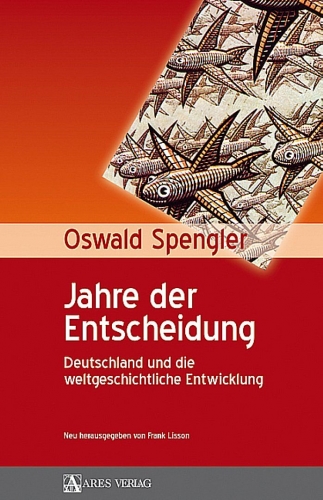 Der ursprüngliche Zweck des Sprechens ist die Durchführung einer Tat nach Absicht, Zeit, Ort, Mitteln. Die klare, eindeutige Fassung derselben ist das Erste, und aus der Schwierigkeit, sich verständlich zu machen, den eigenen Willen anderen aufzuerlegen, ergibt sich die Technik derGrammatik, die Technik der Bildung von Sätzen und Satzarten, des richtigen Befehlens, Fragens, Antwortens, der Ausbildung von Wortklassen auf Grund der praktischen, nicht der theoretischen Absichten und Ziele. Das theoretische Nachdenken hat am Entstehen des Sprechens in Sätzen so gut wie gar keinen Anteil. Alles Sprechen ist praktischer Natur und geht vom »Denken der Hand« aus.
Der ursprüngliche Zweck des Sprechens ist die Durchführung einer Tat nach Absicht, Zeit, Ort, Mitteln. Die klare, eindeutige Fassung derselben ist das Erste, und aus der Schwierigkeit, sich verständlich zu machen, den eigenen Willen anderen aufzuerlegen, ergibt sich die Technik derGrammatik, die Technik der Bildung von Sätzen und Satzarten, des richtigen Befehlens, Fragens, Antwortens, der Ausbildung von Wortklassen auf Grund der praktischen, nicht der theoretischen Absichten und Ziele. Das theoretische Nachdenken hat am Entstehen des Sprechens in Sätzen so gut wie gar keinen Anteil. Alles Sprechen ist praktischer Natur und geht vom »Denken der Hand« aus.
"La finalidad primitiva del lenguaje es la ejecución de un acto, según propósito, tiempo, lugar y medios. La concepción clara e inequívoca del acto es lo primero; y la dificultad de hacerse comprender, de imponer a los demás la propia voluntad, produce la técnica de la gramática, la técnica de la formación de oraciones y cláusulas, la técnica del correcto mandato, de la interrogación, de la respuesta, de la formación de las palabras generales, sobre la base de los fines y propósitos prácticos, no de los teóricos. La meditación teorética no tiene participación alguna en el origen del lenguaje oracional. Todo lenguaje es de naturaleza práctica; su base es el “pensar de la mano"". [xxi]
Para eso está el lenguaje: para realizar un acto [Durchführung einer Tat]. Hablamos de un pensamiento "ejecutivo". La propia mano ya "piensa" en el momento en que realiza sus diversas ejecuciones. La gramática es una técnica, y su existencia original, antes de asumir otras funciones, es puramente práctica. El lenguaje, incluso si está basado en lo sensible, adquiere una autonomía por razón a su entrelazamiento colectivo. De la acción de muchos surge la empresa [Das Tun zu mehreren nennen wir Unternehmen]. [xxii].
- Biopolítica jerárquica.
Se da aquí, del paso de la mano al lenguaje, una segunda clase de Espíritu Objetivo: a parte de las máquinas, objetos, artefactos y cultura material "extra-objetiva", se da una cultura estrictamente institucional, lingüística, en la cual el propio hombre individual puede quedar atrapado. En esa realidad institucional y objetivada aparecen las dos clases fundamentales de hombres: la clase de los gobernantes y la de los gobernados. Todas las sociedades "sanas" han reconocido esta diferencia, la cual se funda en la más práctica escisión entre talentos: unos talentos saben dirigir y otros saben ejecutar. En toda empresa, además del ojo que ve y de la mano que ejecuta, hay "hombres oculares" que se invisten de talento práctico en virtud de su función de mando, y "hombres manuales", que ejecutan en medio de la red normativa e institucional que implica una ejecución. Existe, a nuestro modo de ver, una antropología materialista spengleriana que va montando, en función de una jerarquía sensorial (el ojo del depredador, relegado luego al ojo del hombre teórico) y operatoria (la mano que crea y que se ve armada, relegada luego a la mano del ejecutor obediente) explica el rebasamiento del naturalismo y su superación por un plano institucional. El filósofo germano no desarrolla este proceso, y lo expone de forma demasiado apretada, aunque lo escrito por él contiene muchas enseñanzas.
Es gibt zuletzt einen natürlichen Rangunterschied zwischen Menschen, die zum Herrschen und die zum Dienen geboren sind, zwischen Führern und Geführten des Lebens. Er ist schlechthin vorhanden und wird in gesunden Zeiten und Bevölkerungen von jedermann unwillkürlich anerkannt, als Tatsache, obgleich sich in Jahrhunderten des Verfalls die meisten zwingen, das zu leugnen oder nicht zu sehen. Aber gerade das Gerede von der »natürlichen Gleichheit aller« beweist, daß es hier etwas fortzubeweisen gibt.
"Existe al fin una diferencia natural de rango entre los hombres que han nacido para mandar y los hombres que han nacido para servir, entre los dirigentes y los dirigidos de la vida. Esa diferencia de rango existe absolutamente; y en las épocas y en los pueblos sanos es reconocida involuntariamente por todo el mundo como un hecho, aun cuando en los siglos de decadencia la mayoría se esfuerce por negarla o no verla. Pero justamente ese continuo hablar de la “igualdad natural entre todos”, demuestra un esfuerzo que se encamina a probar la no existencia de esa diferenciación." [xxiii]
En la fase civilizada, no en la cultural-ascendente, se inicia un resentido movimiento de las masas, excitado por los talentos más mediocres, un movimiento encaminado hacia la nivelación. En la fase civilizada se deteriora de manera calculada la educación, se cuestiona la autoridad y se acorrala al autoritario, al capitán dotado de derecho natural al mando. Los lobos solitarios se ven rodeados de ovejas resentidas, feroces en su afán revanchista para con el depredador natural, pero mansas y obedientes ante los nuevos demagogos,
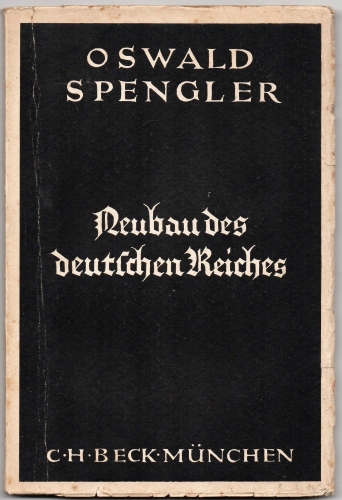 Spengler se sitúa resueltamente entre los filósofos anti-igualitarios, en la misma línea de los clásicos Platón y Aristóteles y seguida por Nietzsche. La diferencia entre los hombres es un "hecho" [Tatsache] acerca del cual cabe poca o nula discusión. La vida práctica de los individuos sólo empieza a comprenderse en el seno de una organización, cuya decadencia civilizada es "masa", pero cuya existencia "en forma" se denomina Estado. El origen del Estado estriba en esa tecnicidad devenida en forma de organización militar. En la milicia existe ya un Estado in nuce. La organización de la empresa humana, especialmente ante enemigos potenciales exteriores, es el Ejército, la institución que encarna la tecnicidad elevada al plano institucional, objetivo-espiritual: […] der Staat ist die innere Ordnung eines Volkes für den äußeren Zweck. Der Staat ist als Form, als Möglichkeit, was die Geschichte eines Volkes als Wirklichkeit ist. Geschichte aber ist Kriegsgeschichte, damals wie heute. Politik ist nur der vorübergehende Ersatz des Krieges durch den Kampf mit geistigeren Waffen. Und die Mannschaft eines Volkes ist ursprünglich gleichbedeutend mit seinem Heer. Der Charakter des freien Raubtieres ist in wesentlichen Zügen vom einzelnen auf das organisierte Volk übergegangen, das Tier mit einer Seele und vielen Händen. Regierungs-, Kriegs- und diplomatische Technik haben dieselbe Wurzel und zu allen Zeiten eine tief innerliche Verwandtschaft.
Spengler se sitúa resueltamente entre los filósofos anti-igualitarios, en la misma línea de los clásicos Platón y Aristóteles y seguida por Nietzsche. La diferencia entre los hombres es un "hecho" [Tatsache] acerca del cual cabe poca o nula discusión. La vida práctica de los individuos sólo empieza a comprenderse en el seno de una organización, cuya decadencia civilizada es "masa", pero cuya existencia "en forma" se denomina Estado. El origen del Estado estriba en esa tecnicidad devenida en forma de organización militar. En la milicia existe ya un Estado in nuce. La organización de la empresa humana, especialmente ante enemigos potenciales exteriores, es el Ejército, la institución que encarna la tecnicidad elevada al plano institucional, objetivo-espiritual: […] der Staat ist die innere Ordnung eines Volkes für den äußeren Zweck. Der Staat ist als Form, als Möglichkeit, was die Geschichte eines Volkes als Wirklichkeit ist. Geschichte aber ist Kriegsgeschichte, damals wie heute. Politik ist nur der vorübergehende Ersatz des Krieges durch den Kampf mit geistigeren Waffen. Und die Mannschaft eines Volkes ist ursprünglich gleichbedeutend mit seinem Heer. Der Charakter des freien Raubtieres ist in wesentlichen Zügen vom einzelnen auf das organisierte Volk übergegangen, das Tier mit einer Seele und vielen Händen. Regierungs-, Kriegs- und diplomatische Technik haben dieselbe Wurzel und zu allen Zeiten eine tief innerliche Verwandtschaft.
"[…] El Estado es el orden interior de un pueblo para los fines exteriores. El Estado es, como forma, como posibilidad, lo que la historia de un pueblo es como realidad. Pero la historia es historia guerrera, entonces lo mismo que hoy. La política es más simplemente el efímero sucedáneo de la guerra, mediante la lucha con armas espirituales. Y el conjunto de los hombres en un pueblo es originariamente equivalente a su ejército. El carácter del animal rapaz y libre se ha trasladado, con sus rasgos esenciales, desde el individuo al pueblo organizado, que es el animal con un alma y muchas manos. La técnica del gobernante, del guerrero y del diplomático tienen la misma raíz y, en todos los tiempos, una afinidad interna muy profunda."[xxiv]
Partiendo de un naturalismo –ciertamente anti-evolucionista- desde el cual se encuentran los elementos etológicos de la tecnicidad, Spengler emplea su método analógico a fondo con vistas a equiparar distintas clases de actividad práctica. Una vez equiparadas esas "técnicas", especialmente las técnicas humanas regentes (gobernante, guerrero, diplomático), se acude a la raíz [Wurzel] común. Este proceder spengleriano puede suscitar críticas merecidas si en él hay circularidad. La analogía lleva a la raíz, y la raíz alumbra la analogía. No habría círculo vicioso en la exposición sobre la evolución de la tecnicidad, desde la propia sensorialidad y operatoriedad etológicas hasta las instituciones humanas de una cultura superior (Estado, Ejército, etc.), si las meras analogías fueran transformadas en capas de complejidad creciente en las cuales los estratos inferiores (p.e. la depredación etológica) conservaran partes materiales que se integran en los estratos superiores (p.e. la conquista y dominación de un Estado sobre otros). El estilo fogoso, impresionista, en ocasiones poético, del filósofo alemán, parece impedir la paciente construcción de verdaderas homologías –y no analogías. De otra parte, la intencionalidad y estilo "belicista" de las palabras spenglerianas le llevan a insistir de manera muy particular en la propia guerra como eje en torno al cual girarán todas las demás indagaciones sobre la tecnicidad. Había tecnicidad en el ojo del cazador. Había tecnicidad en la mano armada del homínido. Había tecnicidad en la dirección de hombres armados en cooperación. Hay tecnicidad en cualquier "empresa", esto es, en cualquier cooperación que lleva a una masa organizada en la que se dan relaciones de poder (dominantes-dominados) hacia fuera y hacia dentro, etc.…Creemos no haber expuesto de forma caricaturesca la manera en que un pensamiento jerárquico y "belicista" como el de Spengler consigue reducir la tecnicidad a la lucha y la dominación. Pero se da la circunstancia de que esa lucha y ese afán de dominación (Voluntad de Poder), iniciada contra animales de otras especies y proseguida contra otros grupos de individuos de la propia especie humana crea todo un mundo artefactual, un Espíritu Objetivo que, por medio del lenguaje y de las instituciones y no sólo de armas y herramientas productivas, encierra al animal humano en su propia jaula. El hombre se encarcela: la casa y la ciudad, símbolos supremos de la Cultura, encarnan perfectamente la nueva clase de servidumbre universal de los humanos. Así, Spengler nos presenta la historia de los hombres a largo plazo, una lucha por capturar animales y hombres, una conflagración universal en pos de evitar ser esclavizado o lograr esclavizar a otros. Pero este panorama no puede conducir sino a otro, en el cual la esclavitud de una parte frente a otra parte de los hombres conduce a la esclavitud universal. Todos, con independencia de su posición económica, política, militar, todos sin excepción son esclavos de una cárcel "cultural".
In dieser wachsenden gegenseitigen Abhängigkeit liegt die stille und tiefe Rache der Natur an dem Wesen, das ihr das Vorrecht auf Schöpfertum entriß. Dieser kleine Schöpfer wider die Natur, dieser Revolutionär in der Welt des Lebens ist der Sklave seiner Schöpfung geworden. Die Kultur, der Inbegriff künstlicher, persönlicher, selbstgeschaffener Lebensformen, entwickelt sich zu einem Käfig mit engen Gittern für diese unbändige Seele. Das Raubtier, das andere Wesen zu Haustieren machte, um sie für sich auszubeuten, hat sich selbst gefangen. Das Haus des Menschen ist das große Symbol dafür.
"En esta creciente dependencia mutua reside la muda y profunda venganza de la naturaleza sobre el ser que supo arrebatarle el privilegio de la creación. Ese pequeño creador contra natura, ese revolucionario en el mundo de la vida, conviértese en el esclavo de su propia creación. La cultura, el conjunto de las formas artificiales, personales, propias de la vida, desarróllase en jaula de estrechas rejas para aquella alma indomable. El animal de rapiña, que convirtió a los otros seres en animales domésticos, para explotarlos en su propio provecho, hace aprisionado a sí mismo. La casa del hombre es el símbolo magno de este hecho." [xxv]
El hombre se vuelve un esclavo de su propia creación [der Sklave seiner Schöpfung geworden]. Con estas breves palabras se podría resumir todo el recorrido de la metafísica alemana desde Kant. Partiendo del idealismo clásico germano y del pensamiento romántico, regresa en Spengler el tópico del hombre como ser enfrentado metafísicamente al objeto. Si el Reino de la Libertad se llama ahora, Reino de la Cultura y éste fue entendido, bajo el humanismo idealista y romántico, como una liberación de la necesidad (naturaleza), ahora, en las postrimerías del siglo XIX corresponde a la fase "vitalista" de la metafísica germana entender la propia Cultura no como libertad sino a modo de jaula y prisión. En la medida en que el hombre ya no es Razón o Espíritu, sino un "animal depredador" [Das Raubtier], la Cultura es la cárcel que le retiene. Se ha completado el ciclo del "aprendiz de brujo". Nuestra especie pretende escapar de la naturaleza y ésta, en su lado más salvaje, sigue presente incluso habiéndose recluido en una fortaleza cultural. Dentro del recinto carcelario va creciendo la base de los subordinados. La clase dirigente, la cúpula de los depredadores, necesita cada vez más manos controladas por menos ojos. Las manos de las masas ejecutoras –esclavos, siervos, asalariados- se ven desprovistas de su consustancial inteligencia. La pre-visión, la planificación dirigente es suficiente para conducir los trabajos y las empresas. Es evidente que en tiempos de decadencia hay una rebelión de las masas. Se extiende el igualitarismo, esto es, la envidia. En la más pura línea nietzscheana, Spengler, como nuestro Ortega, vincula el triunfo de la oclocracia (el poder de la chusma) a un sentimiento exacerbado de envidia y fobia al talento. Esta rebelión de las masas no puede acaecer sino después de todo un ciclo que no dudamos en calificar sino de dialéctico. Es dialéctico puesto que incluye negaciones, rebasamientos de fases anteriores. Sin embargo es dialéctico pero no al modo hegeliano. No hay en Spengler una Teología optimista. En Hegel el dolor y el error quedaban sobradamente justificados en el largo plazo, en la consumación final, siempre victoriosa. En Spengler, en cambio, el dolor y el error no se justifican, son subproductos –al modo schopenhaueriano- que tan sólo para los sujetos pacientes y los sentimentales, poseen alguna relevancia. La dialéctica spengleriana es la de un naturalismo crudo. Es un sistema de negaciones y de rebasamientos de estratos previos, no necesariamente encaminados hacia "lo mejor". El tránsito de la Cultura hacia la Civilización no es, precisamente, el tránsito hacia capas superiores. En la propia Civilización hay recaídas en la barbarie, en el salvajismo y en la propia animalidad. Así han de contemplarse las perversiones de todas las grandes ciudades de todas las épocas civilizatorias en fase senil o terminal, infestadas de "proletarios" y desarraigados. En ellas regresa la selva y la propia animalidad, y las perversiones del hombre decadente de la ciudad son las propias de un animalismo elevado de potencia, el animalismo del frío animal post-racional encerrado en el cemento y el asfalto. La naturaleza siempre se venga: "…die stille und tiefe Rache der Natur an dem Wesen, das ihr das Vorrecht auf Schöpfertum entriß. ["…la muda y profunda venganza de la naturaleza sobre el ser que supo arrebatarle el privilegio de la creación"]. Prometeo ha robado el fuego a los dioses, y debe pagar por ello. La bestia alada que le roe sin cesar las entrañas bien puede simbolizar el retorno de "lo peor", el avance de la selva entre las selvas de asfalto de aquel que un día se autoerigió como Rey de la Creación.
- Conclusiones: Tecnicidad y decadencia.
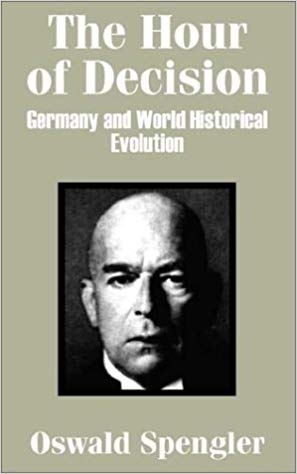 La decadencia de Occidente se ilumina plenamente mirando esta civilización bajo el aspecto de la técnica. La técnica, nacida en toda cultura humana básicamente como arma y como potenciación del ojo y la mano depredadora, ya en fase mecanista pasa a ser la tumba de la civilización que con más energía y saña la desarrolló, la civilización europea de Occidente. Otros pueblos se beneficiarán de aquellos logros de la cultura fáustica. Los frailes escolásticos europeos, en torno a los siglos XII y XIII introdujeron el verdadero Renacimiento[xxvi]. Spengler no duda en llamarlos "vikingos del espíritu". Sin miedo a navegar todo lo lejos posible, y con el mismo afán dominador de sus antecedentes piráticos y navegantes, fueron aquellos escolásticos de la cultura fáustica quienes sentaron las bases de la ciencia moderna, mucho tiempo antes de Galileo, Copérnico, Descartes o Newton. Un Mundo y un Dios entendidos en términos de fuerza, energía, y una naturaleza entendida como botín y campo para la conquista. Los vikingos del espíritu, los escolásticos medievales, impulsaron el verdadero Renacimiento y la primera fase científico-técnica de la cultura fáustica. Ellos prepararon el terreno para la segunda oleada de descubrimientos, y con los descubrimientos, las conquistas. Los conquistadores españoles fueron, a ojos de Spengler, los nuevos vikingos, los herederos de la "sangre nórdica", destinados a revolucionar el mundo, como hicieran, unos siglos antes, sus antepasados.
La decadencia de Occidente se ilumina plenamente mirando esta civilización bajo el aspecto de la técnica. La técnica, nacida en toda cultura humana básicamente como arma y como potenciación del ojo y la mano depredadora, ya en fase mecanista pasa a ser la tumba de la civilización que con más energía y saña la desarrolló, la civilización europea de Occidente. Otros pueblos se beneficiarán de aquellos logros de la cultura fáustica. Los frailes escolásticos europeos, en torno a los siglos XII y XIII introdujeron el verdadero Renacimiento[xxvi]. Spengler no duda en llamarlos "vikingos del espíritu". Sin miedo a navegar todo lo lejos posible, y con el mismo afán dominador de sus antecedentes piráticos y navegantes, fueron aquellos escolásticos de la cultura fáustica quienes sentaron las bases de la ciencia moderna, mucho tiempo antes de Galileo, Copérnico, Descartes o Newton. Un Mundo y un Dios entendidos en términos de fuerza, energía, y una naturaleza entendida como botín y campo para la conquista. Los vikingos del espíritu, los escolásticos medievales, impulsaron el verdadero Renacimiento y la primera fase científico-técnica de la cultura fáustica. Ellos prepararon el terreno para la segunda oleada de descubrimientos, y con los descubrimientos, las conquistas. Los conquistadores españoles fueron, a ojos de Spengler, los nuevos vikingos, los herederos de la "sangre nórdica", destinados a revolucionar el mundo, como hicieran, unos siglos antes, sus antepasados.
Esa conexión entre piratería, depredación y conquista de la naturaleza, es señalada con toda su intensidad en la parte final del ensayo que comentamos. La conexión es posible precisamente por sobrevolar el aspecto racional. Spengler sobrevuela la diferencia entre la ciencia, una empresa racional de "conquista", y las exploraciones piráticas, guerreras, etc. de los pueblos europeos de todas las épocas, especialmente a partir de la emergencia de la cultura fáustica. La desconsideración hacia la razón, o el verla precisamente como una parte más de las cualidades depredadoras de esta clase de hombres que el autor llama "hombres de las comarcas del Norte", se inscribe en su teoría sobre las dos clases de hombres en general: hombres de hechos y hombres de verdades. En todas las razas humanas existen estas dos clases de individuos pero es la cultura la que otorga predominio o equilibrio diferenciado a una de ellas. En la historia específica de Occidente sucedió que no fue la clase sacerdotal (al estilo judaico) la que se impuso, pese a toda la fuerza de sus pretensiones. Las luchas entre el Papado y el Imperio, entre güelfos y gibelinos, son un aspecto de esta lucha entre hombres de verdades y hombres de hechos, a pesar del entrecruzamiento de tipos, y a pesar de que la propia Iglesia se sobrepuso a príncipes y guerreros porque en ella no faltaron clérigos que eran, netamente, verdaderos hombres de hechos. En la actualidad los estados sucumben ante demagogos, filisteos y supuestos "hombres de verdades".
Son hoy los estados inmersos en la ideología y en la palabrería, la clase de estados que existen en su condición de meras piezas al servicio del capital. El hombre occidental del siglo XXI es, en gran medida, un hombre post-técnico. Depende de la máquina, y su vida se encuentra progresivamente automatizada. Siendo un robot de carne y hueso, desprecia la técnica y ensaya el escapismo. Ese escapismo "contracultural" ya existía en la Europa de hace casi un siglo, en el mundo occidental en que se fraguó esta obrita, El Hombre y la Técnica[xxvii]. El orientalismo, el espiritismo, el neo-nomadismo y la mentalidad suicida y nihilista [xxviii]. El demiurgo que hizo posible la Gran Técnica, y por ende, la técnica de dominación, control y sometimiento sobre todas las demás razas y pueblos, ahora es esclavo de ella y se abandona a sí mismo. Ese demiurgo, el hombre europeo, fracasa, entierra sus armas, se deja invadir y comprar. Lo vemos hoy, con la civilización del petróleo. Sus autos y sus chimeneas reclaman sin cesar ese oro negro, a la vez que parlotean todos sin cesar sobre "energías alternativas" y "desarrollo sostenible". Mientras se sucede tanta charla y tantas cortinas de humo se levantan sobre la corteza terrestre, países productores de combustible compran voluntades y esclavizan naciones "blancas" enteras. De rodillas, como un perro amaestrado, el europeo lame las botas de quien posee los petrodólares.
[i] Blanco Martín (2014): "Una antropología de la Técnica. Consideraciones spenglerianas" La Razón Histórica, nº27, 2014 [117-130]. ISSN 1989-2659 [https://www.revistalarazonhistorica.com/27-8/]
[ii] La edición española que tenemos a la vista, y cuya paginación empleamos es la correspondiente al volumen editado por Ediciones Fides: Oswald Spengler, Regeneración del Imperio Alemán. El hombre y la Técnica, Torredembarra (Tarragona), 2016. En dicha edición no figura traductor pero el texto español coincide con la traducción de Manuel García Morente aparecida en la editorial Espasa Calpe, Madrid, 1934. Las citas correspondientes del original en alemán, cuya paginación no aportamos, están tomadas del siguiente sitio web :http://www.zeno.org/nid/20009270388, que reproduce la siguiente edición
Oswald Spengler: Der Mensch und die Technik. München 1931. Erstdruck: München: Beck, 1931.
[iii] Fruto de nuestras investigaciones ya ha salido un libro: Blanco Martín (2016): Oswald Spengler y la Europa Fáustica, Ediciones Fides, (Tarragona), con prólogo de Alain de Benoist; volumen que recoge diversos artículos aparecidos con anterioridad, más numerosas publicaciones en papel o en internet. Alguna de esas publicaciones están recogidas en el listado de la Oswald Spengler Society for the Study of Humanity and World Society.
https://www.oswaldspenglersociety.com/sources
[iv] El Hombre y la Técnica, a partir de ahora, según la edición citada: HT, p. 95.
[v] HT, p. 96.
[vi] HT, p. 97.
[vii] HT, p. 100.
[viii] HT, p. 100.
[ix] HT, p. 101.
[x] íbidem
[xi] HT, pps., 102-103.
[xii] HT, p. 103.
[xiii] HT, P. 105.
[xiv] HT, p. 106.
[xv] íbidem.
[xvi] HT, p. 107.
[xvii] Blanco Martín (2017): El pensamiento “a mano”. En torno al “Pensamiento Hábil”. Reseña de dos libros de Manuel Fernández Lorenzo y su contraste con el Materialismo Filosófico , Revista La Razón Histórica, Número 35, Año 2017, páginas 20-35 [https://www.revistalarazonhistorica.com/35-2/]
[xviii] HT, p. 108.
[xix] HT, p. 110.
[xx] HT, pps. 115-116.
[xxi] HT, P. 116
[xxii] ibídem.
[xxiii] HT, p. 120.
[xxiv] HT, p. 121.
[xxv] HT, p. 122.
[xxvi] HT, pps. 128-129.
[xxvii] Esta obra fue publicada por primera vez en 1931. Véase nota 1.
[xxviii] HT, p. 136.
00:13 Publié dans Philosophie, Révolution conservatrice | Lien permanent | Commentaires (1) | Tags : technique, oswald spengler, révolution conservatrice, allemagne, philosophie, philosophie politique |  |
|  del.icio.us |
del.icio.us |  |
|  Digg |
Digg | ![]() Facebook
Facebook
mardi, 22 janvier 2019
Sur le Traité franco-allemand dit d'Aix La Chapelle

Sur le Traité franco-allemand dit d'Aix La Chapelle
Il est présenté officiellement comme devant renforcer les liens entre l'Allemagne et la France, notamment dans les domaines de la politique économique, de la politique étrangère et de sécurité, de l'éducation et de la culture, de la recherche et de la technologie, du climat et de l'environnement, ainsi qu'en matière de coopération entre les régions frontalières. Notons que peu de gens en France n'en ont entendu parler, car les négociations préalables se sont faites plus que discrètement. Pourquoi?
Mais lorsque l'on connaît l'étroite dépendance de l'Allemagne vis-à-vis des Etats-Unis, dans les domaines économiques, diplomatiques et militaires, ce traité risque d'être un nouveau pas vers la soumission de Paris non seulement à Berlin mais à Washington dans ces différents domaines. Emmanuel Macron ne peut pas l'ignorer. Il se révèle ainsi, ce dont certains doutaient encore, comme une sorte d'agent des Etats-Unis, non seulement en France mais dans toute l'Union européenne.
Ceci sera ainsi le cas dans les domaines diplomatique, militaire, scientifique, comme en ce qui concerne la lutte contre le réchauffement climatique. Dans tous ces domaines, la France a pris une avance certaine sur l'Allemagne. Elle dispose de laboratoires et d'expériences industrielles que l'Allemagne n'a pas, sans mentionner son industrie nucléaire. Ainsi l'Allemagne est le plus grand pollueur au sein de l'Europe avec ses centrales à charbon.
Les industries charbonnières et pétrolières américaines souhaitent que ceci continue, car elles en espèrent la poursuite de leurs contrats actuels. Si l'Allemagne refuse le nucléaire français, c'est moins pour ses prétendus dangers que pour la concurrence qu'elle ferait à ses importations de pétrole et gaz américains et russes. Par ailleurs, l'Allemagne dont la population d'origine diminue rapidement, sera très ouverte à l'immigration étrangère. Or nul n'ignore que les Etats-Unis encouragent discrètement celle-ci, notamment par le biais d'interventions de la CIA, comme susceptible de ruiner à terme des pays européens où ils voient des rivaux.
Ajoutons qu'une clause de traité devrait soulever le plus d'opposition, notamment dans les provinces et au niveau des collectivités régionales. Il s'agira de la mise en place dans les régions franco-allemandes frontalières, d'euro-districts qui risquent d'être sur le modèle des länders allemands. Ainsi, en ce qui concerne l'Alsace, beaucoup d'Alsaciens craignent à tort ou à raison qu'elle ne repasse au moins en partie sous la loi allemande et que la langue administrative n'en redevienne l'allemand. Là encore, il y aurait que demi-mal si l'Allemagne s'était donnée une autonomie suffisante par rapport aux Etats-Unis. Or ce n'est pas le cas. L'Allemagne, notamment au sein de l'Otan, se montre le meilleur élève des Etats-Unis pour en faciliter la pénétration militaire et économique en Europe, par exemple en ce qui concerne l'acquisition de matériels militaires tous fabriqués outre atlantique.
Ainsi actuellement la France espère voir l'Allemagne acquérir les Rafales nouvelle génération. Ce ne sera pas le cas car l'Amérique fera pression pour que l'Allemagne continue à s'équiper en avions de combat américains déjà obsolètes avant même d'avoir volé, tel que le JSF Joint Strike Fighter.
Voir à la date du 21/01
un article de Henti Vernet dans Le Parisien
http://www.leparisien.fr/politique/france-allemagne-ce-tr...
11:11 Publié dans Actualité, Affaires européennes | Lien permanent | Commentaires (0) | Tags : actualité, europe, affaires européennes, france, allemagne |  |
|  del.icio.us |
del.icio.us |  |
|  Digg |
Digg | ![]() Facebook
Facebook
jeudi, 27 décembre 2018
Presseschau - Dezember 2018
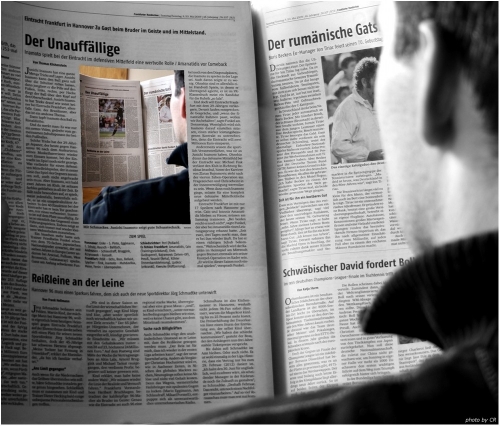
Presseschau
Dezember 2018
AUßENPOLITISCHES
Top 10 Country GDP Ranking History (1960-2017)
https://www.youtube.com/watch?v=wykaDgXoajc
Future Top 10 Country Projected GDP Ranking (2018-2100)
https://www.youtube.com/channel/UCy0dKy89rZFR8OCbAT69wcQ
Das europäische Ich
von Götz Kubitschek
https://sezession.de/59596/das-europaeische-ich
EU in der Krise
Der europäische Patient
von Bruno Bandulet
https://jungefreiheit.de/debatte/kommentar/2018/der-europaeische-patient-2/
„Großer Soldat“
Macron ehrt Nazi-Kollaborateur Pétain
Philippe Pétain war für die Deportation von Juden verantwortlich, nach 1945 wurde er zum Tode verurteilt. Trotzdem hat Frankreichs Staatschef Macron den Soldaten nun geehrt – als Held des Ersten Weltkriegs.
http://www.spiegel.de/politik/ausland/emmanuel-macron-ehr...
Emmanuel Macron
Die Grande Nation trägt gelbe Westen
von Jürgen Liminski
https://jungefreiheit.de/debatte/kommentar/2018/die-grande-nation-traegt-gelbe-westen/
Die Gelben Westen und das periphere Frankreich
https://sezession.de/59917/die-gelben-westen-und-das-periphere-frankreich
Macron entscheidet : Elsass-Atomkraftwerk Fessenheim wird 2020 geschlossen
http://www.faz.net/aktuell/wirtschaft/elsass-atomkraftwerk-fessenheim-wird-2020-geschlossen-15911778.html
Frankreich beschließt Gesetz gegen Fake-News
https://www.zeit.de/politik/ausland/2018-11/frankreich-pressefreiheit-fake-news
Sonntagsheld (83) – Nie wieder Verdun!
https://sezession.de/59868/sonntagsheld-83-nie-wieder-verdun
Notizen zum polnischen Unabhängigkeitstag
https://sezession.de/59884/notizen-zum-polnischen-unabhaengigkeitstag
(Österreich)
HC Strache: „Eine Festung Europa wird notwendig sein“ (JF-TV Interview)
https://www.youtube.com/watch?v=eAnZfqJbjx0
Ein amerikanischer Alptraum (2) – Auf dem Weg zum Bürgerkrieg? Von Martin Lichtmesz
https://sezession.de/59640/ein-amerikanischer-alptraum-2-...
(Diener der globalen Geldelite)
Musik im Wahlkampf
US-Künstler wehren sich gegen Trump
https://www.deutschlandfunkkultur.de/musik-im-wahlkampf-u...
Zwischenwahlen in den USA
Ein Unentschieden, mit dem Trump leben kann
https://jungefreiheit.de/debatte/kommentar/2018/ein-unent...
USA: Die Rolle der ethnischen Wahl
Martin Lichtmesz
https://sezession.de/59815/usa-die-rolle-der-ethnischen-wahl
Jim Acosta
Eine Schande für den Journalismus
https://jungefreiheit.de/debatte/kommentar/2018/eine-scha...
Grenzstadt Tijuana
1600 Migranten erreichen US-Grenze
https://www.tagesschau.de/ausland/migranten-us-grenze-101.html
Karawane nach Nordamerika
Grenze zu USA: Migranten und Mexikaner liefern sich Ausschreitungen
https://jungefreiheit.de/politik/ausland/2018/grenze-zu-usa-migranten-und-mexikaner-liefern-sich-ausschreitungen/
Hunderte Mexikaner protestieren in Tijuana gegen Ankunft von Flüchtlingen
https://www.tagesschau.de/multimedia/video/video-473121.html
https://jungefreiheit.de/politik/ausland/2018/mexiko-einheimische-demonstrieren-gegen-migrantenkarawane/
Mittelamerikanische Migranten versuchen in die USA einzudringen
https://www.gmx.net/magazine/politik/mittelamerikanische-migranten-versuchen-usa-einzudringen-33434634
Mit dem Tod von George Bush endet eine Ära
https://www.handelsblatt.com/politik/international/nachruf-mit-dem-tod-von-george-bush-endet-eine-aera/23706108.html?ticket=ST-5877957-XnrsbP5Do3rqn6tLgJ6m-ap1
Das Mittelmass
George Bush: Nachruf auf den Mann der Mitte
https://www.tichyseinblick.de/meinungen/george-bush-nachruf-auf-den-mann-der-mitte/
(Rassen-Politik)
Namibia‘s president wants to expropriate land from whites
https://www.dw.com/en/namibias-president-wants-to-expropr...
„Taxi-Queens“ in Südafrika : Sexuelle Ausbeutung auf dem Schulweg http://www.faz.net/aktuell/politik/ausland/taxi-queens-in...
Grüne fordern Intervention
Chinas Uiguren-Problem ist jetzt auch ein deutsches
https://jungefreiheit.de/politik/deutschland/2018/chinas-...
(unbeirrbar...)
Von Ureinwohnern umgebrachter US-Missionar Tod auf North Sentinel
Ein junger US-Amerikaner versucht, Einwohner einer isolierten Insel zu missionieren. Die reagieren feindselig, er lässt sich nicht beirren - und trifft eine tödliche Entscheidung.
http://www.spiegel.de/panorama/justiz/andamanen-insel-north-sentinel-tod-eines-missionars-a-1240172.html
(dazu...)
Andamanen: Polizei beobachtet Ureinwohner nach Tötung von US-Bürger
https://www.sn.at/panorama/international/andamanen-polizei-beobachtet-ureinwohner-nach-toetung-von-us-buerger-61326568
(dazu...)
Sonntagsheld (85) – Schießbefehl
https://sezession.de/59914/sonntagsheld-85-schiessbefehl
Ergebnis des Referendums
Frankreich darf Neukaledonien behalten
https://www.tagesschau.de/ausland/neukaledonien-referendu...

INNENPOLITISCHES /
GESELLSCHAFT / VERGANGENHEITSPOLITIK
Wer arm ist, bleibt arm
Deutschland: mehr Arme, Mittelschicht schrumpft, Aufstiegschancen schwinden Neue Studien belegen erneut, wie sich Armut und Reichtum in Deutschland verfestigen. Die Mittelschicht in Deutschland schrumpft im Zeitraffer.
https://www.freiewelt.net/nachricht/deutschland-mehr-arme...
Deutschlands Infrastruktur
Steinmeiers streikendes Flugzeug als Symbol für den Niedergang
von Ronald Berthold
https://jungefreiheit.de/debatte/kommentar/2018/steinmeiers-streikendes-flugzeug-als-symbol-fuer-den-niedergang/
Rede Alexander Gauland: "Merkel hat keine Ahnung von Europa!"
https://www.youtube.com/watch?v=Oj1hRJU4byM
Rede Jörg Meuthen, Spitzenkandidat EU-Wahl 2019
https://www.youtube.com/watch?v=qdjDBsNitIQ
Machtkampf in der CDU
Reanimationsversuch für den Kanzlerwahlverein von Karlheinz Weißmann
https://jungefreiheit.de/debatte/kommentar/2018/reanimati...
Laschet warnt CDU vor Rechtsruck
https://jungefreiheit.de/politik/deutschland/2018/laschet...
CDU-Parteivorsitz
Aufgegeben ohne Abwehr
von Karlheinz Weißmann
https://jungefreiheit.de/debatte/kommentar/2018/aufgegebe...
CDU-Koalitionen
Merz: Grüne „partnerfähig“, AfD „offen nationalsozialistisch“
https://jungefreiheit.de/politik/deutschland/2018/merz-gruene-partnerfaehig-afd-offen-nationalsozialistisch/
Cum-Ex-Ermittlungen bei Blackrock
Wie die Vergangenheit Merz schaden könnte
https://www.sueddeutsche.de/wirtschaft/merz-blackrock-erm...
Nahles-Kritiker: Bülow tritt wegen "desaströser Situation" aus SPD aus
https://www.youtube.com/watch?v=WlmGsLVIWWM
SPD-Aussteiger Marco Bülow
Der Einsame
Marco Bülow ist aus der SPD ausgetreten. Eigentlich muss einen das nicht wundern, er galt schon immer als Quertreiber. Doch der Zeitpunkt verblüfft dann doch.
http://www.spiegel.de/politik/deutschland/marco-buelow-verlaesst-die-spd-der-einsame-a-1240680.html
Abschied des Verfassungsschutzchefs
Die Maaßen-Rede im Wortlaut
https://www.tagesschau.de/inland/maassen-abschied-101.htm...
Bundesamt für Verfassungsschutz
Wegen Abschiedsrede: Maaßen droht Entlassung
https://jungefreiheit.de/politik/deutschland/2018/wegen-a...
Maaßen endgültig gefeuert – Eine politische Eiszeit kommt!
https://www.youtube.com/watch?v=mO08t2Si320
Kommentar
Wo Maassen recht behält
https://www.nzz.ch/meinung/wo-maassen-recht-behaelt-ld.14...
Armin Schuster
Bericht: Merkel verhinderte Kritiker als Verfassungsschutzpräsident
https://jungefreiheit.de/politik/deutschland/2018/bericht-merkel-verhinderte-kritiker-als-verfassungsschutzpraesident/
(Der gewünschte stromlinienförmige Amtsleiter als Nachfolger von Maaßen)
Geheimdienstchefs sprechen über Pläne
Neuer Blick nach rechts
Der neue Verfassungsschutzchef Thomas Haldenwang will eine Neuausrichtung seines Dienstes: Rechtsextreme sollen genauer beobachtet werden.
http://www.taz.de/Geheimdienstchefs-sprechen-ueber-Plaene/!5551239/
(Altersstarrsinn?)
Steinmeier in Chemnitz: „Wir müssen reden!“
https://www.welt.de/politik/deutschland/article183140576/...
(Die Quelle der Chemnitzer Menschenjagd-Lüge)
Von WhatsApp in die Welt
Tichys Einblick fand die Herkunft des Chemnitz-Videos heraus
https://www.tichyseinblick.de/meinungen/tichys-einblick-fand-die-herkunft-des-chemnitz-videos-heraus/
(Ergänzend dazu)
https://www.tichyseinblick.de/video/kommentar/das-chemnitz-video-hase-spricht/
(Ergänzend dazu)
Sonntagsheld (84) – Die den langen Atem haben
Auf Spurensuche in Düsterdeutschland
https://sezession.de/59886/sonntagsheld-84-die-den-langen-atem-haben
Deutschland und EU
Merkel plädiert für Abgabe nationaler Souveränität
https://jungefreiheit.de/politik/deutschland/2018/merkel-plaediert-fuer-abgabe-nationaler-souveraenitaet/
Christoph Heusgen
Der stumme Diener
https://jungefreiheit.de/politik/deutschland/2018/der-stumme-diener/
Bayerischer Landtag
AfD-Kandidat Henkel will doch nicht Landtagsvize werden
https://www.sueddeutsche.de/bayern/afd-bayern-henkel-landtag-1.4197260
Bundesagentur für Arbeit
Hartz IV: Kriminelle Banden betrügen Staat um 50 Millionen Euro
https://jungefreiheit.de/politik/deutschland/2018/freibur...
Bundesregierung gibt immer mehr Geld für humanitäre Hilfe aus
https://jungefreiheit.de/politik/deutschland/2018/bundesr...
Steuerzahlerbund prangert Verschwendungen in Millionenhöhe an
https://jungefreiheit.de/politik/deutschland/2018/steuerz...
Sprachdefizite
Berliner Polizeischüler sollen Deutsch statt Englisch lernen
https://jungefreiheit.de/politik/deutschland/2018/berliner-polizeischueler-sollen-deutsch-statt-englisch-lernen/
Bundeswehr-Uni-Präsidentin Niehuss
„Bei Diversity-Fragen ist die Bundeswehr der Gesellschaft voraus“
https://jungefreiheit.de/politik/deutschland/2018/bei-diversity-fragen-ist-die-bundeswehr-der-gesellschaft-voraus/
Frauenquote in der Politik
Wählen, was wir sollen
von Birgit Kelle
https://jungefreiheit.de/debatte/kommentar/2018/waehlen-was-wir-sollen/
Umfrage: Frauen wählen vor allem linke Parteien
https://jungefreiheit.de/politik/deutschland/2018/umfrage-frauen-waehlen-vor-allem-linke-parteien/
AfD und Linke – Wähler, Krisen, Höhenflüge
https://sezession.de/59870/afd-und-linke-waehler-krisen-hohenfluege
Kandidaten für Europawahl
AfD-Parteitag: Spendenaffäre überschattet ersten Tag
https://jungefreiheit.de/allgemein/2018/afd-parteitag-spendenaffaere-ueberschattet-ersten-tag/
Haushaltsdebatte
Parteispenden: Weidel setzt auf Vorwärtsverteidigung
https://jungefreiheit.de/politik/deutschland/2018/parteispenden-weidel-setzt-auf-vorwaertsverteidigung/
Ein Diskussionsbeitrag zur aktuellen Lage der AfD
Bewegung oder Parlamentarismus? Beides, aber bitte getrennt
http://www.pi-news.net/2018/11/bewegung-oder-parlamentarismus-beides-aber-bitte-getrennt/
Energieversorgung
Bundesamt warnt vor "katastrophalen" Folgen bei Blackout
https://www.morgenpost.de/politik/article215880497/Bundesamt-warnt-vor-Versorgungsmaengeln-bei-Blackout.html
Rechnungshof fordert bessere Überwachung
Studentenvertreter fast ohne Kontrolle: Wofür gibt AStA das Geld aus?
https://www.op-online.de/hessen/studentenvertreter-fast-ohne-kontrolle-10645522.html
Farbaktion an Berliner Siegessäule im Juni
Polizei durchsucht Immobilien von Greenpeace
https://jungefreiheit.de/politik/deutschland/2018/polizei...
Sicherheitsvorkehrungen im öffentlichen Raum
Winterlicher Festungsbau: Weihnachtsmärkte rüsten auf
https://jungefreiheit.de/debatte/kommentar/2018/winterlicher-festungsbau-weihnachtsmaerkte-ruesten-auf/
https://twitter.com/YoungGermanBlog/status/1065242197925216256/photo/1
Erster Weltkrieg
Die Urkatastrophe
von Thorsten Hinz
https://jungefreiheit.de/debatte/kommentar/2018/die-urkat...
Volkstrauertag
Gedenken in der Anstalt
von Fritz Zwicknagl
https://jungefreiheit.de/debatte/kommentar/2018/gedenken-in-der-anstalt/
(Steinmeiers Versöhnungs-Vergebungs-Ideologie)
„Zusammenleben in Vielfalt“
Steinmeier lobt „Regenbogennation“ Südafrika
https://jungefreiheit.de/politik/deutschland/2018/steinmeier-lobt-regenbogennation-suedafrika/
AfD-Politiker Bystron: Steinmeier beschönigt Situation in Südafrika
https://jungefreiheit.de/politik/deutschland/2018/afd-politiker-bystron-steinmeier-beschoenigt-situation-in-suedafrika/
Grütters: Leipzig sollte endlich Einheitsdenkmal bekommen
https://www.rtl.de/cms/gruetters-leipzig-sollte-endlich-einheitsdenkmal-bekommen-4246781.html
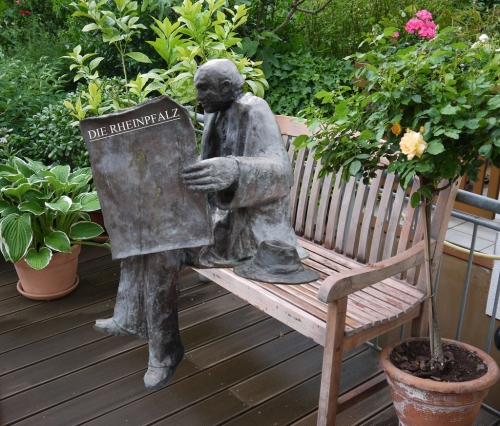
LINKE / KAMPF GEGEN RECHTS / ANTIFASCHISMUS / RECHTE
AfD-Anfrage
Fördermillionen für antideutsche Medienmacher
https://jungefreiheit.de/politik/deutschland/2018/foerder...
Öffentlich-rechtlicher Rundfunk
Antifa-Werbung im „Polizeiruf 110“ – AfD kündigt Beschwerde an
https://jungefreiheit.de/politik/deutschland/2018/antifa-werbung-im-polizeiruf-110-afd-kuendigt-beschwerde-an/
(SPD. Ein Fall für den Verfassungsschutz...)
SPD und Linksradikalismus
Ist Maaßen wirklich „irre“?
https://jungefreiheit.de/politik/deutschland/2018/ist-maa...
Sachsen-Anhalt
Innenminister wollen „rechtsextreme Strukturen“ aufdecken
https://jungefreiheit.de/politik/deutschland/2018/innenminister-wollen-rechtsextreme-strukturen-aufdecken/
Diskursverweigerung
Wehret den rechten Büchern
https://jungefreiheit.de/debatte/kommentar/2018/wehret-de...
Wissenschaftliche Buchgesellschaft
Hitler, Sarrazin und Harry Potter
von Felix Krautkrämer
https://jungefreiheit.de/kultur/2018/hitler-sarrazin-und-harry-potter/
Der Moralismus der „Vielen“ – Ein Offener Brief von Uwe Tellkamp
https://sezession.de/59871/der-moralismus-der-vielen-ein-offener-brief-von-uwe-tellkamp
Duschgel mit Haltung
St. Pauli will Antifa reinwaschen
https://jungefreiheit.de/kultur/gesellschaft/2018/st-pauli-will-antifa-reinwaschen/
https://www.fcsp-shop.com/de_DE/zubehoer/schlafen-waschen/anti-fa-duschgel-sp201717
Grüne: Europa nicht Orbans, Le Pens und Salvinis überlassen
https://www.zeit.de/news/2018-11/09/gruene-europa-nicht-o...
(Die Herzschmerz-Story. Guter SPD-Migrant rettet bösem biodeutschem Fascho das Leben...) SPD-Abgeordneter Serdar Yüksel rettet AfD-Mitarbeiter im NRW-Landtag das Leben
https://www.gmx.net/magazine/panorama/spd-abgeordneter-se...
Gedenkstunde zur Reichspogromnacht
Steinmeier: Nationalisten haben kein Recht auf Schwarz-Rot-Gold https://jungefreiheit.de/politik/deutschland/2018/steinme...
Das Migrationsabkommen als letzter Sargnagel für die linken Parteien
http://norberthaering.de/de/27-german/news/1049-migrationsabkommen-sargnagel
Linke, die gern Erfüllungsgehilfen des Kapitals sein wollen - aber bitte mit Haltung (mit Nachtrag zu Telepolis)
http://norberthaering.de/de/27-german/news/1066-sargnagel
Unvereinbarkeitsbeschluß
Verdi Mittelfranken erklärt AfD-Mitglieder für unerwünscht
https://jungefreiheit.de/politik/deutschland/2018/verdi-mittelfranken-erklaert-afd-mitglieder-fuer-unerwuenscht/
„Reichspogromnacht“
AfD bei Gedenken für ermordete Juden unerwünscht https://jungefreiheit.de/politik/deutschland/2018/afd-bei...
(dazu...)
Schnappatmung wegen blauer Blume
https://clauswolfschlag.wordpress.com/2018/11/27/schnappatmung-wegen-blauer-blume/
(und es geht weiter...)
Nazi-Symbol am Revers: Erneut Eklat um AfD-Politiker Andreas Wild
https://www.gmx.net/magazine/politik/nazi-symbol-revers-eklat-afd-politiker-andreas-wild-33441820
IST SO! Meuthen: „Altparteien treten Grundgesetz mit Füßen!“ | PK zur geplanten VS-AfD-Beobachtung
https://www.youtube.com/watch?v=j2Pw4Hg7xsk
Kommentar zur Pressekonferenz mit Meuthen, Gauland und Hartwig „Verfassungsschutzbeobachtung“: AfD auf dem richtigen Weg
http://www.pi-news.net/2018/11/verfassungsschutzbeobachtu...
AfD-Nachwuchsorganisation
Junge Alternative löst Landesverband Niedersachsen auf
https://jungefreiheit.de/politik/deutschland/2018/junge-a...
Drohende Beobachtung
AfD uneins über Umgang mit Verfassungsschutz
https://jungefreiheit.de/politik/deutschland/2018/afd-une...
Niedersachsen
Nach Verfassungsschutzpanne: Linksextreme enttarnen V-Mann
https://jungefreiheit.de/politik/deutschland/2018/nach-verfassungsschutzpanne-linksextreme-enttarnen-v-mann/
AfD fordert Verbot der Interventionistischen Linken
https://jungefreiheit.de/politik/deutschland/2018/afd-fordert-verbot-der-interventionistischen-linken/
Niedersachsens Bildungsminister Tonne übt Kritik an AfD-Meldeportal, aber:
Schulleiter vergleicht AfD mit Pogromnacht
http://www.pi-news.net/2018/11/schulleiter-vergleicht-afd-mit-pogromnacht/
Publikation der Amadeu-Antonio-Stiftung
Union fordert Anti-Rechts-Broschüre einzustampfen
https://jungefreiheit.de/politik/deutschland/2018/union-fordert-anti-rechts-broschuere-einzustampfen/
Amadeu-Antonio-Kahane-Stasi schnüffelt in Kitas nach „völkischen Familien“
http://www.pi-news.net/2018/11/amadeu-antonio-kahane-stasi-schnueffelt-in-kitas-nach-voelkischen-familien/
„Ene, mene, muh – und raus bist du!“
Anti-Rechts-Broschüre: Amadeu-Antonio-Stiftung wehrt sich gegen Kritik
https://jungefreiheit.de/kultur/2018/anti-rechts-broschuere-amadeu-antonio-stiftung-wehrt-sich-gegen-kritik/
Deutsche Bank kündigt AfD-Politiker Fest sämtliche Konten
https://jungefreiheit.de/politik/deutschland/2018/deutsche-bank-kuendigt-afd-politiker-fest-saemtliche-konten/
"Team Umvolkung?" Das T-Shirt des Schlepperkapitäns
https://www.youtube.com/watch?v=uxjbTPS3F2Y
(Vorgehen gegen linke Mafia)
Razzien in Berlin
Hunderte Polizisten gehen gegen linksextreme Tatverdächtige vor
https://jungefreiheit.de/politik/deutschland/2018/hunderte-polizisten-gehen-gegen-linksextreme-tatverdaechtige-vor/
Rigaer Straße 94
Nach Razzien: Linksextreme kündigen Attacken auf Polizisten an
https://jungefreiheit.de/politik/deutschland/2018/nach-razzien-linksextreme-kuendigen-attacken-auf-polizisten-an/
Medienbericht
Seehofer plant Verbot der Roten Hilfe
https://jungefreiheit.de/politik/deutschland/2018/seehofer-plant-verbot-der-roten-hilfe/
DGB vermietet keine Räume mehr an Antifa
https://jungefreiheit.de/politik/deutschland/2018/dgb-vermietet-keine-raeume-mehr-an-antifa/
Frankfurt
SPD, Grüne und die Pestpocken
Fehlende Distanz der Römer-Koalition zur linksradikalen Szene
http://www.bff-frankfurt.de/artikel/index.php?id=1357
(Gleiches Problem in den USA)
Linksextremismus in den USA
Trump droht der Antifa
https://jungefreiheit.de/politik/ausland/2018/trump-droht-der-antifa/
AfD-Gruppe an der Uni Düsseldorf
Nur noch mit Pfefferspray auf den Campus
Vor zwei Jahren gründete David Eckert eine AfD-Hochschulgruppe an der Uni Düsseldorf. Seitdem fühlt der 24-Jährige sich verfolgt, Flugblätter warnen vor dem "Brandstifter".
http://www.spiegel.de/lebenundlernen/uni/afd-gruppe-an-der-uni-duesseldorf-nur-noch-mit-pfefferspray-auf-den-campus-a-1105782.html
Antifa-Aktion
Mit Steckbriefen gegen den „Rassisten“
Vermummte Gestalten haben in Bockenheim Flugblätter und Plakate verteilt. Sie rufen darin zur Jagd auf ein AfD-Mitglied auf: mit Foto, vollem Namen und Wohnadresse. Doch der junge Mann will sich nicht aus dem Stadtteil vertreiben lassen.
http://www.fnp.de/lokales/frankfurt/Mit-Steckbriefen-gege...
Freiburger Polizei ermittelt nach Angriff auf Teilnehmer von AfD-Demo https://jungefreiheit.de/politik/deutschland/2018/freibur...
Blaue Narzisse
Büro-Kündigung nach Antifa-Attacken
https://www.blauenarzisse.de/buero-kuendigung-nach-antifa...
Leipzig
FDP vergleicht Anschlag auf AfD-Parteitag mit Reichspogromnacht
https://jungefreiheit.de/politik/deutschland/2018/fdp-vergleicht-anschlag-auf-afd-parteitag-mit-reichspogromnacht/
Kassel Protest gegen rechten Redner
Vor dem Haus der Kasseler Burschenschaft haben rund 60 Menschen gegen den Auftritt des rechtsextremen Publizisten Björn Clemens protestiert.
http://www.fr.de/rhein-main/kassel-protest-gegen-rechten-redner-a-1623259
Vizekanzler und Finanzminister
Anschlag auf Haus von Olaf Scholz verübt
https://jungefreiheit.de/politik/deutschland/2018/anschlag-auf-der-haus-von-olaf-scholz-veruebt/
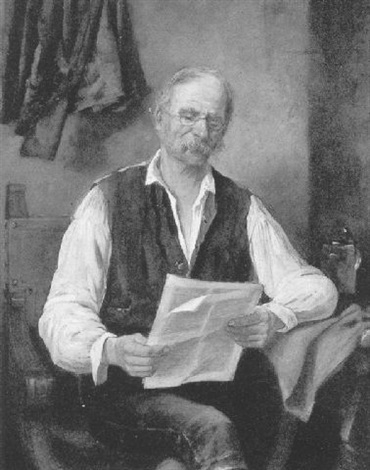
EINWANDERUNG / MULTIKULTURELLE GESELLSCHAFT
UN-Migrationspakt
Die Gefahr des weichen Rechts
von Dieter Stein
https://jungefreiheit.de/debatte/streiflicht/2018/die-gef...
Uno-Dokument
Auswärtiges Amt beklagt Stimmungsmache gegen Migrationspakt
https://jungefreiheit.de/politik/deutschland/2018/auswaer...
Widerstand gegen UN-Migrationspakt
Drum prüfe, wer sich ewig bindet
von Moritz Schwarz
https://jungefreiheit.de/debatte/kommentar/2018/drum-prue...
Bautzen: Identitäre setzen Zeichen gegen Migrationspakt
https://www.tagesstimme.com/2018/11/05/migrationspakt-sto...
(Gleiches Faktum, andere Tonlage des Berichtes)
Rechte stören Romantica
Während der Einkaufsnacht in Bautzen starteten acht Männer eine unangemeldete Protestaktion. Jetzt ermittelt die Polizei aus mehreren Gründen.
https://www.sz-online.de/nachrichten/rechte-stoeren-roman...
Germany Bautzen: Stoppt den Migrationspakt!!!
https://www.youtube.com/watch?v=lAY8owi1aV0
Video: Demo gegen Migrationspakt in Berlin
http://www.pi-news.net/2018/12/heute-14-uhr-gelbe-westen-demo-gegen-migrationspakt-in-berlin/
Grüne fordern deutsche Vorreiterrolle bei UN-Migrationspakt
https://jungefreiheit.de/politik/deutschland/2018/gruene-...
Einwanderung
Städte- und Gemeindebund unterstützt UN-Migrationspakt
https://jungefreiheit.de/politik/deutschland/2018/staedte...
Bundestag
Migrationspakt: Ausschuß blockiert kritische Petitionen https://jungefreiheit.de/politik/deutschland/2018/migrati...
SVP und Teile der FDP opponieren
Schweiz: Immer mehr Widerstand gegen UN-Migrationspakt
https://jungefreiheit.de/politik/ausland/2018/schweiz-imm...
Auch Tschechien steigt aus dem Migrationspakt aus
https://jungefreiheit.de/politik/ausland/2018/auch-tschechien-steigt-aus-dem-migrationspakt-aus/
Israel und Polen stellen sich gegen UN-Migrationspakt
https://jungefreiheit.de/politik/ausland/2018/israel-stellt-sich-gegen-un-migrationspakt/
Geheimdiplomatie statt Demokratie
Auch Israel sagt nein zum UN-Migrationspakt, der ein Pakt aus Berlin ist
https://www.tichyseinblick.de/daili-es-sentials/auch-israel-sagt-nein-zum-un-migrationspakt-der-ein-pakt-aus-berlin-ist/
Australien lehnt UN-Migrationspakt ab
https://jungefreiheit.de/politik/ausland/2018/australien-lehnt-un-migrationspakt-ab/
JF-TV Reportage
Migrationspakt der Eliten
https://jungefreiheit.de/politik/deutschland/2018/migrationspakt-der-eliten/
Dokumentation
Der UN-Migrationspakt und seine Gefahren
https://jungefreiheit.de/politik/deutschland/2018/der-un-migrationspakt-und-seine-gefahren1/
Fantastische Neuigkeiten! Bald 10 Millionen neue Mitbürger?
https://www.youtube.com/watch?v=LMiB78nhEIE
ARD-Chefredakteur zum Migrationspakt
Gniffke: Wir haben angemessen berichtet
von Felix Krautkrämer
https://jungefreiheit.de/debatte/interview/2018/gniffke-wir-haben-angemessen-berichtet/
Union streitet über UN-Migrationspakt
https://jungefreiheit.de/politik/deutschland/2018/union-streitet-ueber-un-migrationspakt/
Klage über „Fake News“
Maas bestreitet unzureichende Informationen über UN-Migrationspakt
https://jungefreiheit.de/politik/deutschland/2018/maas-bestreitet-unzureichende-informationen-ueber-un-migrationspakt/
Server abgestürzt
Riesiges Interesse an Petition gegen UN-Migrationspakt
https://jungefreiheit.de/politik/deutschland/2018/riesiges-interesse-an-petition-gegen-un-migrationspakt/
Zur Legitimierung ihrer Grenzöffnung für die Massen-Invasion
Merkel hat vermutlich den UN-Migrationspakt in Auftrag gegeben
http://www.pi-news.net/2018/11/merkel-hat-vermutlich-den-un-migrationspakt-in-auftrag-gegeben/
Person der Woche: Louise Arbour
Die Mutter des Migrationspaktes
https://www.n-tv.de/politik/politik_person_der_woche/Die-Mutter-des-Migrationspaktes-article20730614.html
Die Flüchtlingsmacher
Dem Rat derjenigen, die für die Flüchtlinge verantwortlich sind, ist nicht zu trauen.
https://www.rubikon.news/artikel/die-fluchtlingsmacher
Mißtrauen
von Johannes Poensgen
https://sezession.de/59909/misstrauen
Migration und wirtschaftliche Interessen
http://antides.de/migration-und-wirtschaftliche-interessen
Ohne AfD
Pistorius wünscht sich Migrationsfrieden
https://jungefreiheit.de/politik/deutschland/2018/pistorius-wuenscht-sich-migrationsfrieden/
(Angst vor Einfluss-Verlust...)
Interview
Clinton: Europa muß Masseneinwanderung stoppen
https://jungefreiheit.de/politik/ausland/2018/clinton-europa-muss-masseneinwanderung-stoppen/
„Vor dem Hintergrund der deutschen Geschichte“
Merz rudert in Asyl-Frage zurück
https://jungefreiheit.de/politik/deutschland/2018/merz-rudert-in-asyl-frage-zurueck/
Streit um Grenzöffnung
Flüchtlingspolitik: Stegner wirft Merz rechte Schauermärchen vor
https://jungefreiheit.de/politik/deutschland/2018/fluechtlingspolitik-stegner-wirft-merz-rechte-schauermaerchen-vor/
Geheimpapier
Grenze hätte 2015 geschlossen werden können
https://www.welt.de/politik/deutschland/article183625538/...
Kramp-Karrenbauer zur Flüchtlingspolitik
„Was 2015 passiert ist, ist Realität und kann nicht rückabgewickelt werden“
https://jungefreiheit.de/politik/deutschland/2018/was-201...
Baden-Württemberg
Abgelehnte Asylbewerber: Wer Pflegeberuf erlernt, darf bleiben
https://jungefreiheit.de/politik/deutschland/2018/abgelehnte-asylbewerber-wer-pflegeberuf-erlernt-darf-bleiben/
„Zynische Aktion“
Grüne verurteilen Werbung für Heimkehrkampagne
https://jungefreiheit.de/politik/deutschland/2018/gruene-verurteilen-werbung-fuer-heimkehrkampagne/
Grüne und Klimaflüchtlinge
Claudia Roth für großzügigeres Asylrecht
https://jungefreiheit.de/politik/deutschland/2018/claudia...
Holm: Greifswalder Asta unterstützt Schlepper im Mittelmeer
https://jungefreiheit.de/politik/deutschland/2018/holm-gr...
Musiker
Grönemeyer hält Flüchtlingsandrang für „Glücksfall“
https://jungefreiheit.de/kultur/2018/groenemeier-haelt-di...
Grenzsturm droht
Experten zu „Krone“: „Jetzt kommen ganz andere“ An Kroatiens Grenze, nur 224 Kilometer von Österreich entfernt, hoffen mehr als 20.000 Migranten auf die Chance eines Durchbruchs nach Mitteleuropa - die Exekutive ist besorgt. Alarmismus? Hysterie? Wird die Gefahr der illegalen Zuwanderung zu oft, zu laut von der Bundesregierung thematisiert? Die „Krone“ fragte bei Experten der Exekutive mit besten Beziehungen am Balkan nach.
Scheinehen zur illegalen Einwanderung
Bundespolizei verhaftet Drahtzieher einer Schleuserbande
https://jungefreiheit.de/politik/deutschland/2018/bundesp...
Berlin: Abschiebungen scheitern, weil Asylbewerber untertauchen
https://jungefreiheit.de/politik/deutschland/2018/berlin-...
Bayern
Abschiebung verhindert: Afrikaner zu Geldstrafen verurteilt
https://jungefreiheit.de/politik/deutschland/2018/abschie...
Christenverfolgung
AfD- und CDU-Politiker fordern Asyl für Asia Bibi
https://jungefreiheit.de/politik/deutschland/2018/afd-und...
Urteil des Landesarbeitsgerichts
Berlin muß Kopftuchträgerin entschädigen
https://jungefreiheit.de/politik/deutschland/2018/berlin-muss-kopftuchtraegerin-entschaedigen/
Islamismus im Sport
Bonner Fußballverein wirbt für Salafisten und Gangster-Rapper
https://jungefreiheit.de/politik/deutschland/2018/bonner-fussballverein-wirbt-fuer-salafisten-und-gangster-rapper/
(Zitat: "...von 2016 auf 2017 einen sprunghaften Anstieg"... Über mögliche Ursachen wird selbstverständlich geschwiegen.)
Quälender Juckreiz
Krätze bei Offenbacher Schülern
https://www.op-online.de/offenbach/kraetzefaelle-offenbacher-schulen-10653644.html
Neuköllner Schulleiterin
Fünf erste Klassen, nur ein Kind spricht zu Hause deutsch
https://www.bz-berlin.de/berlin/neukoelln/wir-sind-arabisiert-muttersprache-deutsch-fehlanzeige
(Und die Bürokraten meinen, mit ein bisschen Pädagogik und Sprachförderung das noch in den Griff bekommen zu können...)
B.Z.-Bericht über „arabisierte“ Klassen
Integrationsbeauftragte nennt Bericht der Schulleiterin einen „Hilferuf“
https://www.bz-berlin.de/deutschland/integrationsbeauftragte-nennt-bericht-der-schulleiterin-einen-hilferuf
(Zu Medienhelden mit Migratonshintergrund)
Sonntagsheld (82) – Can’t touch this
https://sezession.de/59799/sonntagsheld-82-cant-touch-this
Günstige Mieten und Arbeitslosigkeit
Wie sich kriminelle Clans in NRW ausbreiten
http://www.general-anzeiger-bonn.de/news/politik/deutschland/Wie-sich-kriminelle-Clans-in-NRW-ausbreiten-article3981085.html
Kriminelle Familien: Polizei beobachtet 50 Clans in NRW
https://rp-online.de/nrw/panorama/clans-in-nrw-polizei-beobachtet-50-kriminelle-familien_aid-34490381
Freiburg und die Dimension sexueller Gewalt
Wehrlose Beute
von Thorsten Hinz
https://jungefreiheit.de/debatte/kommentar/2018/wehrlose-...
Grabscher, Exhibitionisten, Vergewaltiger: Sextäter schlagen wieder zu
https://jungefreiheit.de/politik/deutschland/2018/grabsch...
Schweden
Grab der ermordeten Ebba (11) schon über 30 Mal von Flüchtlingen geschändet
http://unser-mitteleuropa.com/2018/11/06/grab-der-ermorde...
Vandalismus
Reinbek: 540.000 Euro für demolierte Wohnungen
https://www.abendblatt.de/region/stormarn/article21569165...
Reinbek
Renovierungskosten etwa 540.000 Euro
»Flüchtlinge« zerlegen bereitgestellte Wohnungen
https://www.freiewelt.net/nachricht/fluechtlinge-zerlegen...
Chemnitz: Syrischer Asylbewerber soll behinderte Frau vergewaltigt haben
https://jungefreiheit.de/kultur/gesellschaft/2018/chemnitz-syrischer-asylbewerber-soll-behinderte-frau-vergewaltigt-haben/
(Tochter ist Flüchtlingshelferin...)
Mecklenburg-Vorpommern
Caffier warnt nach Rentner-Mord vor Instrumentalisierung der Tat
https://jungefreiheit.de/politik/deutschland/2018/caffier-warnt-nach-rentner-mord-vor-instrumentalisierung-der-tat/
http://www.pi-news.net/2018/11/wittenburg-geduldeter-afghane-schneidet-rentner-die-kehle-durch/
Sie wurde massiv bedroht
Mädchen (15) von sechs Männern in Münchner Wohnungen vergewaltigt: Martyrium dauerte vier Tage lang
https://www.tz.de/muenchen/stadt/muenchen-ort29098/muenchen-maedchen-von-sechs-maennern-missbraucht-verdacht-erhaertet-sich-10411636.html
Königs Wusterhausen
Afghanen sollen 15jährige vergewaltigt haben
https://jungefreiheit.de/kultur/gesellschaft/2018/afghanen-sollen-15jaehrige-vergewaltigt-haben/
Klartext-Richter mit Hang zum Prinzip Hoffnung
https://jungefreiheit.de/debatte/kommentar/2018/klartext-richter-mit-hang-zum-prinzip-hoffnung/
Donauwörth
Streit um Brötchen: Asylbewerber randalieren in Unterkunft
https://jungefreiheit.de/politik/deutschland/2018/streit-um-broetchen-asylbewerber-randalieren-in-unterkunft/
(Hintergründe "unklar"...)
Berlin 100 Personen prügeln sich bei Massenschlägerei in U-Bahn-Station
In Berlin ist es in der Nacht zu Samstag zu einer heftigen Auseinandersetzung zwischen fast 100 Beteiligten gekommen. Die Polizei rätselt über die Hintergründe.
http://www.kn-online.de/Nachrichten/Panorama/100-Personen-pruegeln-sich-Massenschlaegerei-U-Bahn-Station
KULTUR / UMWELT / ZEITGEIST / SONSTIGES
(Das nächste Berliner Bau-Desaster)
Wasser dringt ein
Diesem Bundestagsneubau droht der Abriss
https://www.welt.de/politik/deutschland/article183650856/...
Bauten des Bundes Fast alle Projekte laufen aus dem Ruder
https://www.tagesspiegel.de/politik/bauten-des-bundes-fast-alle-projekte-laufen-aus-dem-ruder/22986458.html
Damanhur - Tempel der Menschheit
http://www.damanhur.org/de/kunst-und-kreativitat/tempel-der-menschheit
http://www.damanhur.org/de/was-ist-damanhur
Potsdam
Wiederaufbau Garnisonkirche
Thesen-Anschlag mit Turm-Kritik
http://www.maz-online.de/Lokales/Potsdam/Thesen-Anschlag-...
(Gesprengte Garnisonkirche auch in Hannover)
Ausstellung erinnert an Garnisonkirche
http://www.haz.de/Hannover/Aus-den-Stadtteilen/Nord/Ausstellung-erinnert-an-Garnisonkirche
Amberg
„Es gibt zu viele Kirchen für zu wenige Gläubige“
https://www.sueddeutsche.de/bayern/verfall-katholische-ki...
Hessen
Evangelische Kirche: mehr Steuern trotz Mitgliederverlust
https://www.welt.de/regionales/hessen/article184374032/Evangelische-Kirche-mehr-Steuern-trotz-Mitgliederverlust.html
Investorenfeindliche Stimmung
Google-Rückzug läutet Ende des Berlin-Booms ein
https://www.welt.de/wirtschaft/article182942374/Google-Rueckzug-Berlin-als-Standort-fuer-Start-ups-weniger-attraktiv.html
Mittelfreigabe durch den Bundestag
"House of One" erhält zehn Millionen Euro vom Bund
https://www.rbb24.de/politik/beitrag/2018/11/berlin-bund-house-of-one-synagoge-kirche-moschee-zehn-millionen-euro-vom-bund.html
Reichenberger Straße in Berlin-Kreuzberg
Google ist weg, Gentrifizierung geht weiter
https://www.tagesspiegel.de/berlin/reichenberger-strasse-in-berlin-kreuzberg-google-ist-weg-gentrifizierung-geht-weiter/23649746.html
(Deutsche Medien-Unternehmer und -Milliardäre)
Spieglein, Spieglein an der Wand … Friede ist trotzdem die Reichste im Medien-Land!
http://www.pi-news.net/2018/12/spieglein-spieglein-an-der-wand-friede-ist-trotzdem-die-reichste-im-medien-land/
(Pro Einwanderungs-Propaganda im öffentlich-rechtlichen Fernsehen)
Die Tagesthemen im Dienst des Bundespresseamtes
https://www.achgut.com/artikel/die_tagesthemen_im_dienst_des_bundespresseamtes
Peinliche Unterlassungserklärung wegen frei erfundener Bordellbesuche
Spiegel knickt vor AfD-Fraktion ein
http://www.pi-news.net/2018/11/spiegel-knickt-vor-afd-fra...
Gesetz gegen Fake News
Die verkappte Zensur
von Nicolaus Fest
https://jungefreiheit.de/debatte/kommentar/2018/die-verkappte-zensur/
"Lindenstraße"-Erfinder Geißendörfer kann Absetzung nicht verstehen
Den Erfinder der "Lindenstraße" hat die Absetzung der Serie ebenso kalt erwischt wie die Fans des Dauerbrenners. Nun hat sich Hans W. Geißendörfer per Twitter zu der Entscheidung geäußert.
http://www.spiegel.de/kultur/tv/lindenstrasse-erfinder-hans-w-geissendoerfer-kann-absetzung-nicht-verstehen-a-1238886.html
„Lindenstraße“
Ende einer Staats-Seifenoper
https://jungefreiheit.de/debatte/kommentar/2018/ende-einer-staats-seifenoper/
Kinder in gleichgeschlechtlichen Partnerschaften
Erklärbär versus Empörung
https://jungefreiheit.de/debatte/kommentar/2018/erklaerbaer-versus-empoerung/
Politische Korrektheit
Victoria Secret entschuldigt sich für Anti-Transgender-Äußerung
https://jungefreiheit.de/kultur/2018/victoria-secret-entschuldigt-sich-fuer-anti-transgender-aeusserung/
Debatte in der Landeshauptstadt: Sexismus-Vorwurf - Plakate für Düsseldorfer Leichtathletik-Meeting sollen verschwinden
https://rp-online.de/nrw/staedte/duesseldorf/duesseldorf-sexismus-debatte-um-plakate-fuer-duesseldorfer-leichtathletik-meeting_aid-34747087
Wirbel um Hallenweltmeisterin
Werbeplakat sorgt für Sexismus-Debatte
https://www.rga.de/rhein-wupper/sexismus-debatte-werbeplakat-10762867.html
Feminismus
Schauspielerin Pamela Anderson kritisiert die #metoo-Bewegung
https://jungefreiheit.de/kultur/2018/schauspielerin-pamel... https://www.vip.de/cms/pamela-anderson-feminismus-kann-zu...
„Genialer Mechanismus“
Historiker Münkler lobt EU als gelungene Antwort auf die Weltkriege
https://jungefreiheit.de/politik/deutschland/2018/histori...
Götz Aly erhält Geschwister-Scholl-Preis
https://jungefreiheit.de/politik/deutschland/2018/goetz-aly-erhaelt-geschwister-scholl-preis/
Gerechtigkeit für Hubertus Knabe
https://www.gerechtigkeitfuerhubertusknabe.de/
Nach Bekehrung zum Islam
Sängerin O’Connor: Weiße sind ekelerregend
https://jungefreiheit.de/kultur/2018/saengerin-oconnor-we...
(Es gibt ja noch Edeka, Aldi und Co.)
Rewe-Aktion
500 Gramm Vielfalt und Toleranz
https://jungefreiheit.de/debatte/kommentar/2018/500-gramm...
Weniger bei REWE kaufen
https://clauswolfschlag.wordpress.com/2018/11/27/weniger-bei-rewe-kaufen/
(Grusel, Grusel, Skandal...)
Mitglieder der Junge Union singen Wehrmachtslied
https://www.gmx.net/magazine/politik/mitglieder-junge-union-wehrmachtslied-33290686
(Grusel, Grusel...)
Digitalisierter Hass
Nazi-Sticker bei WhatsApp sorgen für Skandal!
Seit mehreren Wochen können WhatsApp-User eigene Sticker erstellen und nutzen. Eigentlich eine tolle Idee. Jetzt aber der Schock: Neonazis nutzen diese Funktion, um antisemitische Symbole zu verbreiten.
https://www.op-online.de/leben/digital/video-digitale-hakenkreuze-per-whatsapp-zr-10621772.html
China und Dolce & Gabbana
Ein Rassismusskandal zeigt, wie die Modewelt heute funktioniert
https://www.welt.de/icon/mode/article184467244/China-und-Dolce-Gabbana-Ein-Rassismusskandal-zeigt-wie-die-Modewelt-heute-funktioniert.html
(Zitat: "Die Leere ist Symbol", sagt Direktor Leopold. "Sie erinnert uns daran, dass Anne nicht mehr da ist...")
Annes Botschaft ist laut im stillen Hinterhaus
Das Amsterdamer Haus an der Prinsengracht ist weltberühmt. Dort schrieb das jüdische Mädchen Anne Frank im Versteck vor den Nazis ihr Tagebuch. Wie erzählt man Annes Geschichte heute?
https://www.welt.de/newsticker/dpa_nt/infoline_nt/boulevard_nt/article184306308/Annes-Botschaft-ist-laut-im-stillen-Hinterhaus.html
(Neuer Totalitarismus)
Moralistische Selbstverzauberung
von Götz Kubitschek
https://sezession.de/59874/moralistische-selbstverzauberung
Peter Sloterdijks „Neue Zeilen und Tage, Notizen 2011-2013“
In Björn Höckes Gesprächsband Nie zweimal in denselben Fluß findet sich eine Äußerung , aus der seine Gegner einen Skandal konstruieren wollten...
von Götz Kubitschek
https://sezession.de/59919/peter-sloterdijks-neue-zeilen-und-tage-notizen-2011-2013
Film über Debattenkultur
Das Paradogma der politischen Korrektheit
von Victoria van Delft
https://jungefreiheit.de/kultur/medien/2018/das-paradogma-der-politischen-korrektheit/
Ja, es gibt nationale Kulturen. Der echte Kosmopolit leugnet sie nicht, sondern weiss sie zu schätzen
Das Nationale zeigt sich nicht in verkündeten Leitkulturen, sondern im Alltag der Bürger. Wie gross die Unterschiede selbst zwischen zwei benachbarten Diktaturen sein können, habe ich in den 1960er Jahren in Portugal gelernt.
https://www.nzz.ch/feuilleton/nationale-kulturen-gibt-es-der-kosmopolit-weiss-und-schaetzt-dies-ld.1440204
Neue Technologie
Britische Angestellte sollen Mikrochips implantiert bekommen
https://jungefreiheit.de/politik/ausland/2018/britische-angestellte-sollen-mikrochips-implantiert-bekommen/
Digitaler Konsum und Konsensmeinung
https://sezession.de/59890/digitaler-konsum-und-konsensmeinung
(Stichwort: Zunehmende Gewalt gegen Rettungskräfte)
Wiesbaden
Unbekannte lösen Radmuttern von parkendem Rettungswagen
http://www.spiegel.de/panorama/justiz/wiesbaden-unbekannte-loesen-radmuttern-von-parkendem-rettungswagen-a-1240470.html
Experiment in China
Angeblich genmanipulierte Zwillinge geboren
Ein chinesischer Forscher behauptet, zwei kürzlich geborene Mädchen während der Embryonalentwicklung genetisch verändert zu haben. Die internationale Forschergemeinde ist entsetzt.
http://www.spiegel.de/gesundheit/diagnose/china-angeblich-genmanipulierte-zwillinge-geboren-a-1240404.html
(Dekadenter Nervenkitzel?)
Pub-Besuch mit besonderem Kick Diese Bar lockt mit Gefängniswärtern und Zellen
https://www.kleinezeitung.at/international/5532325/PubBesuch-mit-besonderem-Kick_Diese-Bar-lockt-mit
Wal strandet mit sechs Kilogramm Plastik im Bauch
In Indonesien ist ein Pottwal mit kiloweise Plastik im Magen gestrandet. Das Tier hatte Holz, Sandalen und Plastikflaschen in Bauch.
https://www.morgenpost.de/vermischtes/article215837777/Wal-strandet-mit-sechs-Kilogramm-Plastik-im-Bauch.html
Polens Ambitionen und Polens Weg zum Krieg 1939
Dr. Stefan Scheil
https://www.youtube.com/watch?v=mb4WrtVCBgs
Michael Köhlmeier: Bruder und Schwester Lenobel
https://sezession.de/59851/michael-koehlmeier-bruder-und-schwester-lenobel
10:51 Publié dans Actualité, Affaires européennes | Lien permanent | Commentaires (0) | Tags : actualité, allemagne, europe, affaires européennes, politique internationale, journaux, presse, médias |  |
|  del.icio.us |
del.icio.us |  |
|  Digg |
Digg | ![]() Facebook
Facebook
jeudi, 20 décembre 2018
Lumière allemande : sur le peintre symboliste Fidus, cofondateur du mouvement de « réforme de la vie »

Lumière allemande : sur le peintre symboliste Fidus, cofondateur du mouvement de « réforme de la vie »
Par Thomas Wyrwoll
En créant son œuvre intitulée « Prière à la Lumière », Fidus a donné au mouvement de jeunesse allemand l’image par excellence à laquelle celui-ci s’identifiait. Fidus était, en son temps, un illustrateur de livres parmi les plus connus.
De son vrai nom Hugo Höppener, ce peintre et ce réformateur de la vie, est né le 8 octobre 1869 à Lübeck. A l’âge de seize ans, ses parents l’envoient suivre les cours préliminaires de l’Académie de Munich. Il n’y resta pas longtemps. Après seulement trois mois, le futur Fidus rejoint Karl Wilhelm Diefenbach, peintre de son état et père fondateur du mouvement de « réforme de la vie ». Diefenbach venait de quitter la capitale bavaroise pour s’installer à Höllriegelskreuth. Dans cette petite localité bavaroise, il cherchait à échapper à l’étroitesse étouffante de la ville et à fonder une « communauté ». Les Munichois se moquaient de lui et le surnommaient « l’apôtre du chou-rave » (Kohlrabi-Apostel). Il prêchait le végétarisme et une vie proche de la nature, la culture nudiste et un rejet des rigidités exigées par les églises et la société. Höppener devint son principal disciple. Après avoir purgé une brève peine de prison pour nudité sur la voie publique, à la place de son maître-à-penser, celui-ci lui décerna le titre honorifique de « Fidus », le Fidèle.
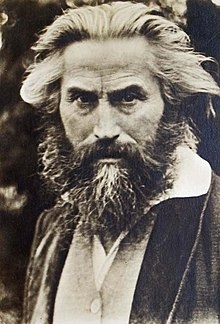 En 1889, Fidus reprend les cours réguliers qu’il s’était promis de suivre à Munich. Il y fait la connaissance de Wilhelm Hübbe-Schleiden, originaire, lui aussi, d’Allemagne du Nord, converti à la théosophie de l’occultiste Madame Blavatsky et partisan d’une politique coloniale allemande. Ce nati de Hambourg était un ami intime de Madame Blavatsky et de son adepte américain Henry Steel Olcott, qui avait fondé aux Etats-Unis une secte théosophique. La religiosité théosophique de Steel Olcott était un mélange obscur de bribes hétéroclites tirées des religions d’Asie et de trucs de prestigiditateur, qui avait pourtant acquis une notoriété internationale. Il faut aussi rappeler que ce cher Henry travaillait accessoirement pour le gouvernement américain. Pour rassembler leurs adeptes allemands, Hübbe-Schleiden édita une revue mensuelle, intitulée Sphinx, dont le graphiste principal fut évidemment le jeune Fidus. Cette collaboration dura trois ans. Influencé par les idées glanées dans la revue, Fidus fit siennes celles d’un « cercle de vie » et d’une « thérapie par la lumière ».
En 1889, Fidus reprend les cours réguliers qu’il s’était promis de suivre à Munich. Il y fait la connaissance de Wilhelm Hübbe-Schleiden, originaire, lui aussi, d’Allemagne du Nord, converti à la théosophie de l’occultiste Madame Blavatsky et partisan d’une politique coloniale allemande. Ce nati de Hambourg était un ami intime de Madame Blavatsky et de son adepte américain Henry Steel Olcott, qui avait fondé aux Etats-Unis une secte théosophique. La religiosité théosophique de Steel Olcott était un mélange obscur de bribes hétéroclites tirées des religions d’Asie et de trucs de prestigiditateur, qui avait pourtant acquis une notoriété internationale. Il faut aussi rappeler que ce cher Henry travaillait accessoirement pour le gouvernement américain. Pour rassembler leurs adeptes allemands, Hübbe-Schleiden édita une revue mensuelle, intitulée Sphinx, dont le graphiste principal fut évidemment le jeune Fidus. Cette collaboration dura trois ans. Influencé par les idées glanées dans la revue, Fidus fit siennes celles d’un « cercle de vie » et d’une « thérapie par la lumière ».

Il ne cessa d’entretenir des relations avec son vieux maître Diefenbach, pour lequel il élabora une frise monumentale « Per Aspera ad Astra », musique pour enfants. Cette grande œuvre enthousiasma les critiques à Vienne, suite à une exposition des travaux de Diefenbach, mais le grand public se montra beaucoup plus réticent. Diefenbach était quasi ruiné et s’enfuit en Egypte avant de revenir en 1897 à Vienne pour y fonder la communauté d’artistes « Humanitas » à Himmelhof.
 Fidus, lui, quitta Munich pour Berlin, où il travailla pour des revues telles Jugend, Pan et Simplicissimus. Plus tard, il collabora à Kraft und Schönheit et à Die Schönheit. Le regard de Fidus sur la beauté naturelle du corps humain et son style « Art Nouveau », quelque peu édulcoré, firent de lui le graphiste le plus connu d’Allemagne au tournant du siècle.
Fidus, lui, quitta Munich pour Berlin, où il travailla pour des revues telles Jugend, Pan et Simplicissimus. Plus tard, il collabora à Kraft und Schönheit et à Die Schönheit. Le regard de Fidus sur la beauté naturelle du corps humain et son style « Art Nouveau », quelque peu édulcoré, firent de lui le graphiste le plus connu d’Allemagne au tournant du siècle.
Dans les premières années du 20ème siècle, Fidus crée son œuvre picturale la plus connue, « la prière à la Lumière », dont l’artiste élabora, successivement, plus de dix versions différentes ainsi que de nombreuses œuvres connexes.
La peinture nous présente un homme jeune, très abstrait, debout sur un sommet de montagne, devant un ciel de lumière, tendant les bras, euphoriquement, vers le Soleil. Le motif devint immensément populaire après la « Fête de la jeunesse » tenue sur le mont Hoher Meissner en 1913. Ce fut l’image à laquelle le mouvement de jeunesse s’identifia spontanément. Le personnage de la peinture adopte, de fait, une posture spéciale, ressemblant -et ce n’est pas un hasard- à la rune Algiz ou Ehlaz, que l’écrivain viennois Guido « von » List, un ésotériste de la veine folciste (völkische) considérait, au début du 20ème siècle, comme la « rune de la vie ».
Le jeune homme, joyeux et plein de vie, qui se tourne vers la lumière, a fait vibrer l’époque : un nombre incalculable de reproductions de cette œuvre ont été imprimées, depuis la petite carte postale jusqu’aux impressions de qualité et de grand format.
Dans les années 1920, l’art de présenter les corps, propre à Fidus, devient quelque peu répétitif : sa créativité en souffre, son aura d’artiste en pâtit. Une partie de son œuvre sera interdite d’exposition par Hitler. Plus tard, les Soviétiques ne l’apprécieront pas davantage, même s’il peignit quelques portraits de Staline, pour survivre. Dans l’Allemagne en ruine de 1948, il est frappé d’une thrombose. Son œuvre sombra alors dans l’oubli pour longtemps.
Thomas Wyrwoll.
(article tiré de « zur Zeit », Vienne, n°45/2018, http://www.zurzeit.at ).
16:01 Publié dans art, Histoire | Lien permanent | Commentaires (0) | Tags : fidus, hugo höppener, art, art nouveau, mouvement de jeunesse, allemagne, wandervogel |  |
|  del.icio.us |
del.icio.us |  |
|  Digg |
Digg | ![]() Facebook
Facebook
lundi, 17 décembre 2018
Les Allemands appartiendront-ils encore à l’Allemagne dans un avenir proche ?

Les Allemands appartiendront-ils encore à l’Allemagne dans un avenir proche ?
Traduit par le blog http://versouvaton.blogspot.fr
La vitesse à laquelle la population allemande diminue semble être trop forte même pour les statisticiens de Destatis, le bureau officiel allemand des statistiques, qui partent du principe que d’ici 2060, avec un niveau zéro d’immigration nette, la population allemande aura diminué à 60,2 millions d’habitants. Cependant, notre équipe de recherche a découvert que ce chiffre est beaucoup trop optimiste : dans 40 ans, l’Allemagne comptera 52,6 millions d’habitants, soit une baisse considérable de 34% par rapport aux 81 millions d’habitants actuels, et d’ici la fin du siècle, la population autochtone allemande, les indigènes sans origine étrangère, aura diminué encore plus et approchera 21,6 millions. L’explication que Destatis nous a envoyée par mail équivaut à admettre que leurs projections sont irréalistes.
Si les élites allemandes parviennent à maintenir leur population à 80 millions d’habitants, en 2060, la majorité des Allemands naturalisés n’auront aucun lien historique avec les ancêtres de la nation qui furent autrefois de fiers sujets du Saint Empire romain. De plus, ils auront la même relation avec Albert Schweitzer, Johann Sebastian Bach, Karl Benz et Friedrich Nietzsche que Recep Tayyip Erdoğan avec les empereurs byzantins. Le nombre excessif de migrants aura à jamais modifié la nation allemande.
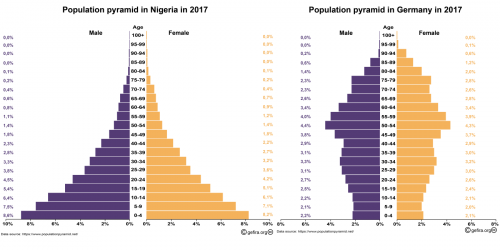
Il n’y aura aucune relation entre les futurs Allemands et le passé allemand
D’ici 2050, de nombreuses personnalités historiques allemandes, comme Albert Schweitzer [à ce détail près que le bon Dr Schweitzer est alsacien, donc français – même si à sa naissance l’Alsace faisait encore partie de l’Empire allemand, NdT] mentionné plus haut, seront démasquées en tant que racistes et par conséquent retirées des noms de rue et des livres d’histoire pour être remplacées par de nouveaux héros, un processus qui se déroule déjà aux États-Unis et aux Pays-Bas. Parmi les premiers, les monuments en hommage aux généraux du Sud sont attaqués, tandis que dans les seconds, les partis pro-migrants font pression pour que des personnalités historiques néerlandaises soient éradiquées des espaces publics, que les rues soient renommées et que leurs traditions les plus importantes, qui ne seraient pas inclusives, oppressives ou insultantes pour les minorités nationales, raciales ou religieuses soient interdites. L’histoire d’un pays devrait porter sur les actions passées de son peuple, mais lorsque les gens sont remplacés, il n’y a aucun lien avec le passé et il peut arriver qu’avant la fin de ce siècle, la majorité des citoyens allemands aient leurs racines culturelles et leurs ancêtres hors d’Allemagne ou même d’Europe.
Bien que l’on puisse qualifier ces prédictions d’alarmistes, cela ne les rend pas moins fiables. Les prévisions démographiques, à condition qu’il n’y ait pas de changements imprévisibles comme des épidémies ou des famines, sont remarquablement exactes. Considérons la comparaison des résultats obtenus par Destatis et nous pour le modèle de migration zéro.
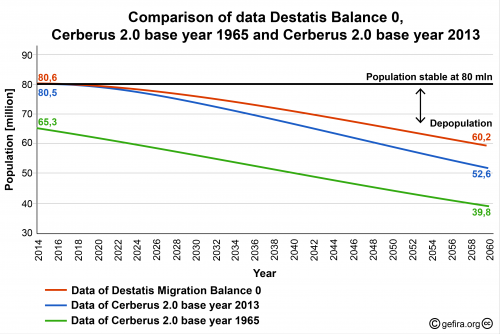
En Allemagne, une femme donne en moyenne naissance à 1,4 enfant, ce qui est inférieur au taux de fécondité de remplacement et n’a pas beaucoup changé depuis les années 1970. C’est pourquoi la population allemande a commencé à diminuer. La tendance s’est inversée en raison de l’arrivée de 1,3 million d’immigrants venant de pays hors UE dans le pays depuis 2015.
Cerberus 2.0 calcule l’avenir de la population allemande
L’équipe Gefira a développé Cerberus 2.0, un logiciel pour calculer comment une population augmente ou diminue en l’absence de migration. En utilisant uniquement les taux de mortalité et de natalité, Cerberus 2.0 peut calculer la taille de la société allemande sans l’afflux des étrangers et de leurs progénitures. L’application commence par faire les calculs sur la base du recensement de 1965 effectué par Destatis. Nous avons commencé en 1965 parce que nous voulions mesurer la croissance de la population allemande sans immigration, et nous avons supposé qu’il n’y avait pas beaucoup d’immigrants cette année-là. Nous n’avons pas utilisé les données officielles détaillées de Destatis pour les années suivantes, car elles incluaient les immigrants, c’est-à-dire le facteur que nous voulions exclure. Alors que Destatis donne le nombre total de migrants vivant actuellement en Allemagne, Cerberus 2.0 calcule indépendamment le développement de chaque groupe d’âge de la population autochtone allemande de 1965 à 2100, et pour toutes les années intermédiaires.
Nous sommes conscients qu’il y a des relations mixtes et qu’il y a aussi des Allemands qui ont quitté le pays. Comme certains parents mixtes germanisent leurs enfants, alors que d’autres font le contraire, nous supposons que cela n’affectera pas nos résultats. Ainsi, avec l’aide de Cerberus 2.0, nous avons calculé que s’il n’y avait pas eu de migration, la population allemande de 1965 aurait été de 64,99 millions de personnes en 2013. Ceci est confirmé par Destatis, qui estime à 64,29 millions le nombre d’Allemands sans origine migratoire pour la même année. Cela montre que nos calculs sont extrêmement précis, mais aussi qu’il n’y a pratiquement pas de migrants de troisième génération en Allemagne qui soient considérés comme des Allemands de naissance.
Le modèle démographique Destatis n’est qu’un fantasme
Nous avons également effectué le calcul pour les années 2013-2060, en prenant comme point de départ la population de 2013, et comparé nos résultats avec ceux prévus par Destatis pour la même période. Selon Destatis, en 2060, la population sera de 60,2 habitants, tandis que Cerberus 2.0 ne prévoit que 52,6 millions d’habitants en Allemagne. L’énorme différence de près de 8 millions entre les deux prévisions ne peut s’expliquer que si l’on suppose que Destatis est très créatif dans ses prévisions démographiques, comme nous l’expliquerons plus loin.
Pour l’Allemagne, Cerberus 2.0 a traité les taux de mortalité et de natalité fournis par Destatis. Les données démographiques – le pourcentage de mères qui ont donné naissance, c’est-à-dire le taux de fécondité par âge, et le pourcentage de personnes qui sont décédées – ont été ventilées par groupe d’âge. Le taux de fécondité par âge de 1965 a permis à Cerberus 2.0 de calculer le nombre d’enfants nés l’année suivante, c’est-à-dire le nombre de femmes d’un groupe d’âge particulier multiplié par ledit taux pour le groupe d’âge concerné. Le taux de mortalité de la même année a également été pris en compte. Après avoir calculé les naissances et les décès, l’application a augmenté l’âge de chaque groupe d’âge d’un an pour créer la population entière de 1966 sans l’influence de l’immigration. Ensuite, le programme a recommencé tout le processus pour calculer les données pour l’année 1967, l’année consécutive, et ainsi de suite. Pour les calculs au-delà de 2015, Cerberus 2.0 a utilisé les taux de mortalité et de fécondité par âge pour 2015.
Nous avons ensuite comparé les projections de Cerberus 2.0 avec celles de Destatis. Destatis et son équipe de recherche ont commencé avec une population initiale de 81 millions d’habitants en 2013, et nous avons tous deux utilisé le même taux de fécondité de 1,4. Ni l’un ni l’autre ne tenait compte des 1,3 million d’immigrants non occidentaux qui sont entrés en Allemagne après 2014. Les résultats obtenus sont très différents : Cerberus 2.0 prévoyait 52,6 alors que Destatis avance 60,2 millions d’habitants en Allemagne en 2060.
Les populations augmentent et diminuent en raison de seulement quatre facteurs : les naissances, les décès, l’immigration et l’émigration. Le modèle de migration zéro de Cerberus 2.0 n’utilise que les taux de mortalité et de natalité, tandis que Destatis ajoute 600.000 jeunes immigrants et retire chaque année 600.000 anciens émigrants de son modèle. Cela signifie que chaque année 600.000 jeunes hommes et femmes arrivent en Allemagne, portent des enfants et quand ces enfants atteignent l’âge adulte, les parents quittent le pays comme des coucous, une hypothèse assez étrange. Il en résulte que les immigrants eux-mêmes n’augmentent pas la population, mais ce n’est pas le cas de leurs enfants. Dans le modèle Destatis, le solde d’immigration et d’émigration est maintenu à zéro.
Comment Destatis parvient-il à ces chiffres ? En 2014, 331 000 femmes sont nées. Après sept ans, ce même groupe de femmes devrait, selon Destatis, atteindre 333 000, et après 27 ans, en 2041, il devrait atteindre un sommet de 350 000, c’est-à-dire qu’en 2021 il y aura moins de femmes nées qu’en 2041 ! Comment est-ce possible ? Seulement si les femmes immigrantes sont incluses dans les statistiques.
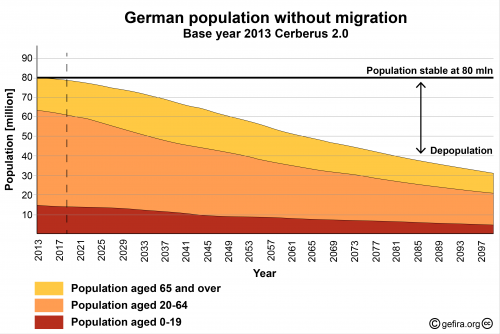
Étant donné que dans ce modèle, il y a autant de migrants qui entrent dans le pays qu’il n’en sort, les migrants de la première génération ne s’ajoutent pas à la population totale. Cependant, ces migrants ont en moyenne 170 000 enfants par an. Ces enfants élargissent la population allemande, mais Destatis ne les considère pas comme des étrangers. Le pronostic d’immigration zéro de Destatis est donc fallacieux et donne une projection beaucoup trop « neutre » pour l’avenir de l’Allemagne. La réponse de Destatis sur la différence entre nos résultats et les leurs est que leur projection est formellement exacte et que la différence est le résultat du fait que nous avons supposé un modèle de migration zéro – aucune migration du tout, alors qu’ils ont supposé un modèle de migration zéro à l’« équilibre ».
L’Allemagne, comme la majeure partie de l’Occident, est soumise à une immigration massive d’une ampleur sans précédent et, selon le nouveau gouvernement allemand, le processus va se poursuivre dans un avenir prévisible.
En raison de la réinstallation des réfugiés, le nombre de personnes n’appartenant pas à l’UE a augmenté de 1,3 million entre janvier 2015 et juin 2017. Le nouveau gouvernement a décidé que le pays devrait croître de 200 000 demandeurs d’asile par an. Pour comprendre l’effet de cette politique sur la société allemande, il faut comparer ce nombre avec le nombre de nouveau-nés allemands. Selon Cerberus 2.0, le nombre d’Allemands natifs qui naissent passera d’environ 450 000 en 2020 à 315 000 dans les vingt prochaines années. L’arrivée, année après année, de 200 000 demandeurs d’asile relativement jeunes et de leurs progénitures va profondément modifier la société allemande d’ici 40 à 60 ans et l’Allemagne va cesser d’être un pays allemand.
D’ici la fin du siècle, il restera 22 millions d’Allemands
La population allemande de 1965 passera à 37,8 millions d’habitants au cours des quarante prochaines années et à 21,6 millions à la fin du siècle. En 2060, le nombre d’Allemands autochtones représentera la moitié de celui de l’Allemagne de l’Est et de l’Ouest réunies en 1945. Compte tenu du taux de natalité inférieur au taux de remplacement chez les autochtones, les gouvernements allemands ne peuvent maintenir le nombre actuel d’habitants à 80 millions qu’en important des immigrants, donc à long terme, à toutes fins utiles, en remplaçant les Allemands autochtones.
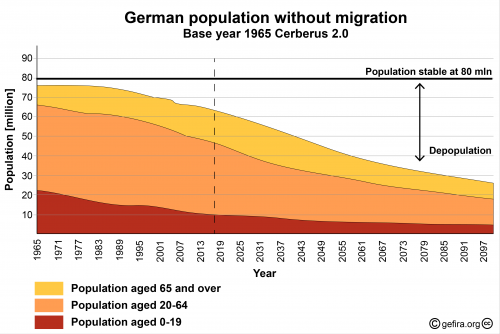
L’idée que les nouveaux arrivants s’intègrent ou s’assimilent est complètement absurde, c’est-à-dire que les nouveaux Allemands ne seront pas allemands. La principale raison pour laquelle les gens s’installent en Allemagne est le bien-être personnel plutôt que la culture allemande. Les immigrants conservent leur religion et leur patrimoine, forment des partis politiques, construisent des institutions religieuses, ont leurs propres magasins et veulent même avoir leur propre système juridique. Étant donné le nombre de personnes qui affluent en Allemagne, il est impossible que les Allemands puissent maintenir leur structure politique, leur langue et leur identité culturelle.
Il faut beaucoup de temps pour qu’un super tanker change de cap. De même, les changements démographiques ne sont visibles qu’après au moins 15 à 30 ans. L’accueil de 1,3 million d’étrangers en deux ans et l’ajout de 200 000 migrants non européens par an à la population allemande qui diminue rapidement auront déjà eu un effet dévastateur sur la population allemande en 2030.
Les résultats de Cerberus 2.0 nous montrent que la discussion sur la migration ne porte pas sur l’acceptation et la protection des droits des minorités, mais plutôt sur une question existentielle, sur la préservation des Allemands. Quand les élites dirigeantes allemandes commenceront à comprendre leurs politiques défaillantes, il sera trop tard. Il n’y a pas d’exemples dans l’histoire où ce genre de changements massifs se soient bien terminé.
12:38 Publié dans Actualité, Affaires européennes | Lien permanent | Commentaires (5) | Tags : allemagne, europe, affaires européennes, démographie, démographie allemande, actualité, europe centrale, mitteleuropa, déficit démographique |  |
|  del.icio.us |
del.icio.us |  |
|  Digg |
Digg | ![]() Facebook
Facebook
samedi, 01 décembre 2018
German Youth Movement and its conservative-revolutionary foundations
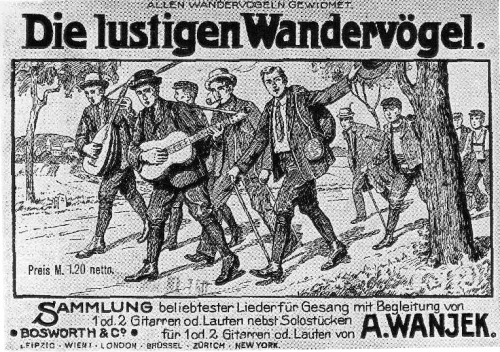
German Youth Movement and its conservative-revolutionary foundations
Ex: https://phosphorussite.wordpress.com“The basic experience of the Youth Movement was the conflict between the bourgeois world and individual life. It was also a conflict between generations, in which, strangely enough, the fathers were the liberals and the sons the conservatives. This was a marked reversal since the days of the earlier youth movement the Burschenschaften of 1815. Then the new generation, which had fought in the Wars of Liberation, was in the fore in the struggle for a unified German state and for constitutionalism. Now liberalism, so it seemed to the sons, had lost its vitality and had come to stand for a world of confinement and convention. The young generation was tired of the state and tired of constitutions just as the early conservatives had been distrustful of them. In the Youth Movement there was a touch of the anarchic. It was antiauthoritarian, but it was also in search of authority and allegiances. This was its conservatism.
The Youth Movement derived its conservatism from Nietzsche and the traditions of nineteenth century irrationalism. Nietzsche, Lagarde, Stefan George became its heroes and were read, quoted, imitated, and freely plagiarized. They had given sanction to the struggle between the generations. Nietzsche had called upon the “first generation of fighters and dragon-slayers” to establish the “Reich of Youth.” Lagarde had defended German youth against the complaint that it lacked idealism: “I do not complain that our youth lacks ideals: I accuse those men, the statesmen above all, who do not offer ideals to the young generation.” To a searching youth, the irrationalists, all experimenters in conservatism, pointed a way to a conservatism through rebellion and radicalism, thus setting the tone for a revolutionary conservatism. Hegel and Bismarck were squarely repudiated. And Nietzsche, in lieu of traditions long lost, postulated the “will of tradition” a variation only of the ominous “will of power” as the foundation of a new conservatism. All the more did Stefan George’s symbolism appeal to the young. They learned to see themselves as the “new nobility” of a “new Reich”:
New nobility you wanted
Does not hail from crown or scutcheon!
Men of whatsoever level
Show their lust in venial glances,
Show their greeds in ribald glances…
Scions rare of rank intrinsic
Grow from matter, not from peerage,
And you will detect your kindred
By the light within their eyes.
Twentieth century knights were they, united by secret codes. They claimed to be dedicated to a “mission”; more correctly they were in search of one. Heinrich Heine, had he lived to see those Wandervogel, would have called them “armed Nietzscheans.”
The revolutionary temper of the Youth Movement is evident from its famous declaration, formulated at a meeting near Kassel on the Hohen Meissner hill in October 1913. It stated that “Free German Youth, on their own initiative, under their own responsibility, and with deep sincerity, are determined independently to shape their own lives. For the sake of this inner freedom they will under any and all circumstances take united action…”.“
– Klemens Von Klemperer, “Germany’s New Conservatism: Its History and Dilemma in the Twentieth Century” (1968)
00:27 Publié dans Mouvements de jeunesse, Révolution conservatrice | Lien permanent | Commentaires (0) | Tags : mouvements de jeunesse, jeunesse, allemagne, wandervogel, wandervögel, révolution conservatrice |  |
|  del.icio.us |
del.icio.us |  |
|  Digg |
Digg | ![]() Facebook
Facebook
jeudi, 29 novembre 2018
Wilhelm Heinrich Riehl: A Völkish Visionary
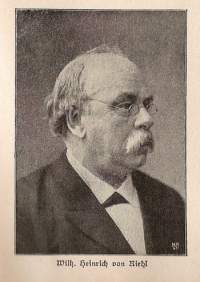
Wilhelm Heinrich Riehl:
A Völkish Visionary
Ex: https://phosphorussite.wordpress.comWilhelm Heinrich Riehl (6 May 1823 – 16 November 1897) was a German journalist, novelist and folklorist.
Riehl was born in Biebrich in the Duchy of Nassau and died in Munich.
Riehl’s writings became normative for a large body of Volkish thought. He constructed a more completely integrated Volkish view of man and society as they related to nature, history, and landscape. He was the writer of the famous ‘Land und Leute’ (Places and People), written in 1857-63, which discussed the organic nature of a Volk which he claimed could only be attained if it fused with the native landscape.
“Personally Riehl applied the bulk of his labors to the two contiguous fields of Folklore and Art History. Folklore (Volkskunde) is here taken in his own definition, namely, as the science which uncovers the recondite causal relations between all perceptible manifestations of a nation’s life and its physical and historical environment. Riehl never lost sight, in any of his distinctions, of that inalienable affinity between land and people; the solidarity of a nation, its very right of existing as a political entity, he derived from homogeneity as to origin, language, custom, habitat.”
Otto Heller – The German Classics of the Nineteenth and Twentieth Centuries
“Riehl’s writings became normative for a large body of Volkish thought…he constructed a more completely integrated Volkish view of man and society as they related to nature, history, and landscape….in his famous Land und Leute (Land and People), written in 1857-63,” which “discussed the organic nature of a Volk which he claimed could only be attained if it fused with the native landscape….Riehl rejected all artificiality and defined modernity as a nature contrived by man and thus devoid of that genuineness to which living nature alone gives meaning…Riehl pointed to the newly developing urban centers as the cause of social unrest and the democratic upsurge of 1848 in Hessia”….for many “subsequent Volkish thinkers, only nature was genuine.”
“Riehl desired a hierarchical society that patterned after the medieval estates. In Die bürgerliche Gesellschaft(Bourgeois Society) he accused those of Capitalist interest of “disturbing ancient customs and thus destroying the historicity of the Volk.”
George Mosse
“We must save the sacred forest, not only so that our ovens do not become cold in winter, but also so that the pulse of life of the people continues to beat warm and joyfully, so that Germany remains German.”
“In the contrast between the forest and the field is manifest the most simple and natural preparatory stage of the multiformity and variety of German social life, that richness of peculiar national characteristics in which lies concealed the tenacious rejuvenating power of our nation.”
“In our woodland villages—and whoever has wandered through the German mountains knows that there are still many genuine woodland villages in the German Fatherland—the remains of primitive civilization are still preserved to our national life, not only in their shadiness but also in their fresh and natural splendor. Not only the woodland, but likewise the sand dunes, the moors, the heath, the tracts of rock and glacier, all wildernesses and desert wastes, are a necessary supplement to the cultivated field lands. Let us rejoice that there is still so much wilderness left in Germany. In order for a nation to develop its power it must embrace at the same time the most varied phases of evolution. A nation over-refined by culture and satiated with prosperity is a dead nation, for whom nothing remains but, like Sardanapalus, to burn itself up together with all its magnificence. The blasé city man, the fat farmer of the rich corn-land, may be the men of the present; but the poverty-stricken peasant of the moors, the rough, hardy peasant of the forests, the lonely, self-reliant Alpine shepherd, full of legends and songs—these are the men of the future. Civil society is founded on the doctrine of the natural inequality of mankind. Indeed, in this inequality of talents and of callings is rooted the highest glory of society, for it is the source of its inexhaustible vital energy.”
Wilhelm Heinrich Riehl – Field and Forest
10:23 Publié dans Philosophie | Lien permanent | Commentaires (0) | Tags : wilhelm heinrich riehl, philosophie, idéologie folciste, folcisme, idéologie völkisch, allemagne |  |
|  del.icio.us |
del.icio.us |  |
|  Digg |
Digg | ![]() Facebook
Facebook
dimanche, 25 novembre 2018
Dr. Rainer Rothfuß: Feindbild Russland, Syrien, Geopolitik verstehen, menschliche Begegnung, Frieden

Dr. Rainer Rothfuß: Feindbild Russland, Syrien, Geopolitik verstehen, menschliche Begegnung, Frieden
12:40 Publié dans Actualité, Affaires européennes, Géopolitique | Lien permanent | Commentaires (0) | Tags : actualité, géopolitique, politique internationale, europe, russie, allemagne, afaires européennes, eurasie |  |
|  del.icio.us |
del.icio.us |  |
|  Digg |
Digg | ![]() Facebook
Facebook
samedi, 24 novembre 2018
Un tournant dans la politique étrangère allemande

Un tournant dans la politique étrangère allemande
par Irnerio Seminatore
L'alliance pour le multilatéralisme et l'autonomie stratégique de l'Europe dans la redéfinition des relations euro-atlantiques.
La nouvelle responsabilité franco-allemande face à une géopolitique planétaire.
Heiko Maas et l'UE, "pilier de l'ordre international".
La tribune du quotidien allemand Handelsblaat du 22 août, portant la signature du Ministre des Affaires Étrangères Heiko Maas a marqué un tournant historique dans la diplomatie de la République Fédérale Allemande depuis sa constitution en 1949.
Heiko Maas a plaidé pour une révision de la politique étrangère de son pays et pour une "autonomie stratégique" de l'Europe, en faisant de l'Union Européenne "un pilier de l'ordre international".
Cette convergence, de l'Allemagne et de l'Union Européenne, permettra-t-elles d'instaurer "un partenariat équilibré" avec les États-Unis d'Amérique?
Pour l'heure c'est un tournant marquant de la diplomatie du Mittelage.
Après avoir surmonté les "limites de la politique rhénane"de H.Khol et de la "voie allemande" de Schröder, la politique étrangère allemande a-t-elle tourné le dos à la "puissance discrète" de A.Merkel, en réagissant aux provocations souverainistes de D.Trump et à la fragmentation décisionnelle de l'U.E, face aux nouveaux défis de l'ordre mondial?
Suffira-t-il à l'Allemagne et, avec elle, à l'Europe, de remplacer le concept global d'hégémonie par l'idéologie juridique du multilatéralisme et de la sécurité collective aux promesses aléatoires, en oubliant la décomposition géopolitique de la suprématie américaine, qui a pris la forme, sous Obama, d'une série de "deals régionaux" conçus pour la pérenniser?
La déclaration de Heiko Maas, évoquant sa prise de distance avec les États-Unis évoque implicitement trois moments significatifs de l'histoire allemande et souligne ainsi la lente maturation de sa politique étrangère depuis la fin de la bipolarité:
- le "Rapport K.Lamers-W.Schauble" de 1994 sur les nouvelles responsabilités de l'Allemagne, suite à la réunification du 3 octobre 1990 et à la lecture d'une Europe reconfigurée, à partir des "intérêts nationaux allemands", jusqu'ici tabou.
- la déclaration informelle de M.me Merkel à Munich, en mai 2017, sur l'émancipation de l'Europe vis à vis des États-Unis et sur l'impératif des européens "de prendre en main leur destin". Ajoutons, dans le même sens, la déclaration du Président de la République française à l’Élysée du 27 août 2018, à l'occasion de la réunion annuelle des Ambassadeurs de France, sur "l'indispensable"autonomie stratégique de l'Europe" et sur une redéfinition générale de la politique extérieure et de défense de l'Europe".
- le Sommet de l'Otan des 12 et 13 juillet 2018 à Bruxelles, sur le partage du fardeau de la défense euro-atlantique et sur la menace du retrait des États-Unis de l'Alliance. La remise en cause de celle-ci s'est exprimée sous la forme du "veto", adressé par Trump à la Chancelière A.Merkel, à propos de la réalisation du " Nord Stream 2" et d'une politique énergétique moins dépendante de la Russie.
Quant au chef de la diplomatie allemande, Heiko Maas, dans son interview du 22 août au journal "Handelsblaat" redessine les contours d'une "nouvelle stratégie américaine" vis à vis de l'Allemagne et définit les bases "d'un renouveau de la collaboration" avec l'allié transatlantique, en partenariat avec les autres pays européens.
Ce renouveau aurait pour fondement "le multilatéralisme", déjà rejeté antérieurement par D.Trump, qui lui préfère le souverainisme et s’appuierait sur deux piliers:
- un "partenariat équilibré" entre les USA et l'UE
- une alliance avec tous les pays attachés au droit, aux règles contraignantes et à une concurrence loyale, au delà de l'U.E et sur la scène internationale. La carence de cette alliance est de ne pas tenir compte ni des rapports des forces, ni de l'esprit de système, autrement dit, des regroupements multipolaires du monde. Elle apparaît, de ce fait, en décalage avec les référents permanents de la politique globale et en syntonie avec les positions d'une négociation permanente et toujours précaire de l'ordre mondial.
Le changement de cap de la politique américaine vis à vis de l'U.E.- confirme le ministre allemand - a commencé bien avant l'élection de Trump - et devrait survivre à sa présidence".
En effet, constate-t-il, " l'Atlantique est devenu politiquement plus large" de ce qu'il n'était à l'époque de la bipolarité, car la profondeur stratégique de l'Eurasie replace la menace et les dangers vers l'Asie-Pacifique.
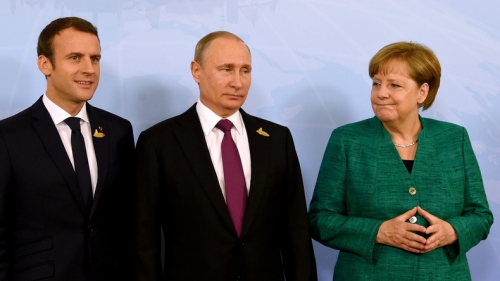
Les implications de la notion "d'autonomie stratégique "européenne
Les implications de ce tournant, qui sont imposées aux européens, comportent un double volet, interne et extérieur:
-à l'extérieur,
-induisant une reconsidération des relations de l'U.E.avec la Russie dans le cadre d'une architecture régionale de sécurité
-faisant de l'Europe "une puissance d'équilibre" entre Washington et Moscou. Ce positionnement inverserait la logique du "triangle stratégique" Washington- Moscou-Bruxelles, par l'adoption des recommandations de Kissinger des années 1970, selon lesquelles l'Europe doit être toujours plus proche de Washington ou de Moscou,que l'Amérique de la Russie ou Moscou de Washington.
à l'intérieur,
-poussant à une révision des fondements de toute construction politique, concernant la légitimité et la souveraineté, bref les conceptions de la démocratie, du pluralisme et des autres formes de gouvernement.
- faisant évoluer les relations entre institutions européennes et États-membres vers un modèle politique, organisé sur la base d'une hiérarchie contraignante , sans avoir résolu les deux aspects majeurs de l'histoire européenne, ceux de unité politique et du leadership.
Macron/Merkel, l'"armée européenne" et la nouvelle responsabilité franco-allemande
Or l'imprégnation de cette notion est revenue à la surface le 6 novembre dernier, à l'avant-veille des commémorations du centenaire de la "Grande Guerre 14-18",
dans l’exhortation aux européens du Président Macron, de créer une "armée européenne", pour protéger l'Europe des visées russes, américaines et chinoises.
Cette expression, reformulée en terme de "défense européenne", a été reprise par Macron dans l'enceinte du Bundestag allemand, le dimanche 11 novembre, lors des cérémonies du Volkstrauertag, consacrées aux victimes de guerre, dans le but "de ne pas laisser glisser le monde vers le chaos" et de "construire les outils de souveraineté", afin que l'Europe ne soit pas "effacer du jeu" par les grandes puissances.
"Nous devons élaborer une vision, nous permettant d'arriver un jour à une véritable armée européenne", a repris Angela Merkel à Strasbourg, devant le Parlement Européen le mardi 13, mais"pas une armée contre l'Otan", situant sa constitution dans un avenir lointain; le temps de corriger le strabisme divergent entre la France et l'Allemage. la première fixant ses priorités au Sud, la deuxième à l'Est.
Il a été observé (J.H.Soutou) que trois conditions doivent être remplies, pour répondre à ce défi:
- l'existence d'une culture stratégique commune et, de ce fait, d'une lecture partagée du système international et de ses menaces
- des moyens de défense adéquats, inclusifs d’États-majors doués de capacités de commandement opérationnels, en complément de l'Otan
- d'un budget européen, dont on ignore l'ordre de grandeur.
Les européens confrontés à l'hostilité de l'administration américaine.
Devenir un pilier de l'ordre international et instaurer une fonction de puissance d'équilibre entre Washington et Moscou, d'après le ministre allemand des affaires étrangères, sont-ils des objectifs compatibles avec l'exercice d'un "vrai dialogue de sécurité avec la Russie", prôné par les vœux du Président Macron?
En effet, dans le contexte de la nouvelle donne de sécurité transatlantique, l'autonomie stratégique de l'Europe pour se protéger des États-Unis, pouvait-elle échapper à la réaction de Trump, la jugeant "très insultante" pour le pays qui a volé au secours de la France par deux fois au cours du XXème siècle?
Le nouvel état d'insécurité du monde laisse les européens divisés et tétanisés, car le système immunitaire sur lequel a été bâtie la suprématie allemande,est aujourd'hui anéanti.
Le stress de l'urgence efface, en République Fédérale, le tabou du leadership et la faiblesse de l'économie ne compense pas, en France, l'hardiesse rhétorique des propos de Macron.
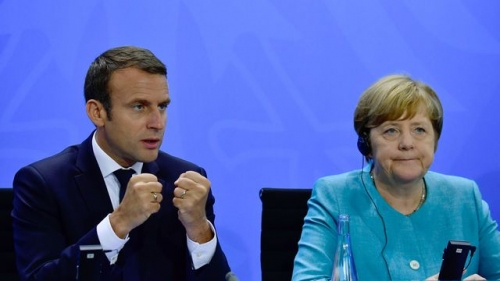
Mais comment l'Europe peut-elle bâtir son unité, si la compétition pour le primat fertilise les esprits et la Pologne, porteuse de nouvelles perspectives stratégiques, se propose comme l'allié le plus sûr des États-Unis et si elle fédère autour d'elle des projets et des pays (l'initiative des trois mers,Baltique, Adriatique et Mer Noire), en matière d'énergie et de conceptions politiques et culturelles, qui allègent la dépendance de l'Europe vis à vis de Moscou et accroissent l’indépendance politique de la Pologne vis à vis de l'U.E?
Comment par ailleurs le divorce de la Grande Bretagne de l'Union Européenne et son choix, inacceptable pour les brexiters durs, entre la vassalisation à l'Union et le chaos d'une reddition sans conditions, pourrait -il ne pas se répercuter à l’intérieur du continent, plongeant l'Europe dans la solitude et dans la division?
La rétrospective historique et ses enseignements
Déjà le choix entre l'Europe européenne et l'Europe atlantique s'était posé dans les années cinquante/soixante, associé aux deux conceptions de la construction européenne, l'Europe des Patries et l'Europe intégrationniste, la première indépendante mais alliée des États-Unis, la deuxième tributaire d'une allégeance, qui mettra sa sécurité, au travers de l'Otan, dans les mains tutélaires du "Grand Frère" anglo-saxon et cherchera sa lumière dans les yeux de son maître.
Ce même dilemme se propose aujourd'hui, dans un système international devenu multipolaire, où la priorité n'est plus la révision de Yalta et de ses sphères d'influences et, par conséquent, des périls d'une confrontation permanente et générale, imputable à la "question allemande",mais d'entrer pleinement dans une géopolitique planétaire, où le monde sera post-américain et post-occidental et imposera à l'Europe, sur tous les échiquiers, une montée en puissance d'autres acteurs et une diversification des fonctions d'influence, de dissuasion et de contrainte.
Dans ce nouvel environnement stratégique, l'accroissement des inconnues et des incertitudes, est signalé par la dégradation de la confiance des européens vis à vis de la nouvelle administration américaine et par le déploiement aux marges orientales du continent du projet russe d'ouverture eurasienne, ressenti comme une menace géopolitique.
C'était dès lors inévitable, qu'un rééquilibrage de l'axe euro-atlantique s'impose et que l'idée d'une armée européenne, à dominante franco-allemande, soit sortie de l'amnésie et proposée aux opinions et aux gouvernants, si l'Europe ne veut être effacée par les rivalités des grandes puissances.
On rajoutera à ces observations la fin du processus d'unification fonctionnelle de l'UE ( ordo-libéral ou bismarcko-keynésien), et l'urgence, pour l'Europe, de se positionner vis à vis de la Chine montante et d'autres grands pays asiatiques (Iran, Inde,Pakistan, Japon ), par le retour sur la scène mondiale des unités politiques rodées par l'expérience séculaire de la diplomatie et de l'histoire, les Nations.
Ça sera désormais par les alliances et par la coopération organisée entre les États européens, que seront abordées les relations de sécurité et d'équilibre du système pluripolaire, en bannissant les prétentions universalistes de l'Occident et en embrassant en commun, comme "une vérité transcendante", les besoins mystiques et immanents de la foi.
Dans ce cadre, la pérennité des nations, qui vivent dans le temps, prévaudra sur la précarité des régimes et des formules de gouvernement, qui sont les produits de rapports aléatoires dans la vie turbulente des peuples et des conjonctures civilisationnelles.
Par ailleurs l'extension planétaire des "sociétés civiles" et la compétition entre "système de valeurs", supportant la compétition stratégique entre les États, englués dans le brouillard d'une guerre globale contre le terrorisme islamiste et dans le maelström d'une immigration invasive et conquérante, imposeront au monde une configuration éthico-politique aux pôles raciaux et religieux multiples et, de ce fait, à une démultiplication des menaces, démographiques et culturelles.
C'est dans ce contexte, assombri et déstructuré par le rejet de la démocratie et de la "raison", que l'idée émancipatrice d'une volonté armée tire sa justification et sa légitimité, celles d'une nécessité défensive et existentielle, dictée par le "Struggle for Life" et éclairé par la foudre tardive d'une prise de conscience humiliante sur la solitude géopolitique et stratégique de l'Europe, que seul un rappel du réalisme politique, de l’égoïsme des intérêts et de la logique de la force peuvent soustraire au glissement désespéré et irrésistible vers la pente de la guerre, du déclin et de la mort.
Bruxelles, le 21 novembre 2018
01:44 Publié dans Actualité, Affaires européennes, Géopolitique | Lien permanent | Commentaires (0) | Tags : politique internationale, allemagne, europe, affaires européennes, russie, france, vladimir poutine, heiko maas, angela merkel, emmanuel macron, géopolitique |  |
|  del.icio.us |
del.icio.us |  |
|  Digg |
Digg | ![]() Facebook
Facebook
jeudi, 22 novembre 2018
La perfection de la technique...
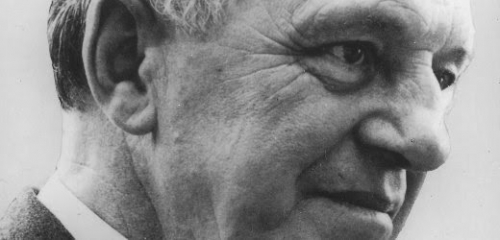
La perfection de la technique...
 Les éditions Allia publient cette semaine un essai de Friedrich-Georg Jünger intitulé La perfection de la technique. Frère d'Ernst Jünger. Auteur de très nombreux ouvrages, Friedrich-Georg Jünger a suivi une trajectoire politique et intellectuelle parallèle à celle de son frère Ernst et a tout au long de sa vie noué un dialogue fécond avec ce dernier. Parmi ses oeuvres ont été traduits en France un texte écrit avec son frère, datant de sa période conservatrice révolutionnaire, Le nationalisme en marche (L'Homme libre, 2015), et un recueil d'essais sur les mythes grecs, Les Titans et les dieux (Krisis, 2013).
Les éditions Allia publient cette semaine un essai de Friedrich-Georg Jünger intitulé La perfection de la technique. Frère d'Ernst Jünger. Auteur de très nombreux ouvrages, Friedrich-Georg Jünger a suivi une trajectoire politique et intellectuelle parallèle à celle de son frère Ernst et a tout au long de sa vie noué un dialogue fécond avec ce dernier. Parmi ses oeuvres ont été traduits en France un texte écrit avec son frère, datant de sa période conservatrice révolutionnaire, Le nationalisme en marche (L'Homme libre, 2015), et un recueil d'essais sur les mythes grecs, Les Titans et les dieux (Krisis, 2013).
“ « L’ère de la technique excelle certes à susciter des organisations mais est incapable de fonder des institutions. Elle s’entend toutefois à transformer les institutions existantes en organisations, à en faire des organisations, c’est-à-dire à les mettre en relation avec l’appareillage technique. Le progrès technique ne tolère plus que des organisations qui dans leur ensemble ont quelque chose de mobile, qui correspondent donc foncièrement à la grande mobilisation de ce temps. Or le concept d’institution implique qu’elle soit posée, ou du moins pensée comme immuable, comme un édifice immobile qui a quelque chose de statique et qui résiste aux outrages du temps. Les organisations livrent à la technique les moyens pour ses plans de travail ; c’est là une vocation que l’on discerne toujours plus nettement. »
La perfection de la technique, c’est la rationalité absolue des procédés qui ont mécanisé et automatisé le travail depuis le début de la Révolution industrielle. Une efficacité implacable, pourtant délétère dans le contexte de la société humaine tout entière. Reliées en réseau à l’échelle planétaire, les machines fixent le but à atteindre et dominent l’activité du travailleur, désormais détaché de tout ancrage local. En favorisant une pensée économique uniquement fondée sur une partie du processus, en envisageant les ressources naturelles sur lesquelles elle s’appuie comme une manne inépuisable, la technique pourrait bien précipiter elle-même sa propre fin.
Dans cet essai visionnaire, inédit en français, Friedrich Georg Jünger dénonce les illusions que suscite la technique moderne, ses promesses d’un accroissement de la richesse et du temps libre. Après la destruction de la composition typographique du livre dans un bombardement allié en 1942, une première édition a pu voir le jour en 1944, rapidement réduite en cendres par une attaque aérienne. La Perfection de la technique paraît enfin, en deux livres séparés, en 1946 et 1949, avant de connaître de multiples éditions en un seul volume par la suite."
Source: http://metapoinfos.hautetfort.com
10:35 Publié dans Ecologie, Littérature, Livre, Livre, Révolution conservatrice | Lien permanent | Commentaires (2) | Tags : technique, écologie, livre, friedrich-georg jünger, allemagne, révolution conservatrice, littérature, lettres, lettres allemandes, littérature allemande |  |
|  del.icio.us |
del.icio.us |  |
|  Digg |
Digg | ![]() Facebook
Facebook
Kulturbruch '68?

Kulturbruch '68?
Diskussion mit Bettina Röhl, Cora Stephan, Jörg Friedrich und Gerd Held
00:20 Publié dans Histoire | Lien permanent | Commentaires (0) | Tags : histoire, débat, 1968, mai 68, années 60, allemagne |  |
|  del.icio.us |
del.icio.us |  |
|  Digg |
Digg | ![]() Facebook
Facebook
mardi, 20 novembre 2018
Schröder dénonce l’«occupation» de l’Allemagne par les USA

Schröder dénonce l’«occupation» de l’Allemagne par les USA
Ex: https://echelldejacob.blogspot.com
Dans une interview accordée à la chaîne allemande N-TV, Gerhard Schröder a dénoncé la politique commerciale américaine à l'égard de l'Allemagne.
«Nous ne pouvons pas tolérer d'être traités comme un pays occupé. Lorsque j'observe les actions de l'ambassadeur américain en Allemagne, j'ai l'impression qu'il se croit un officier d'occupation et non l'ambassadeur des États-Unis dans un État souverain», a-t-il déclaré.
Selon l'ancien chancelier allemand, Berlin doit chercher des partenaires qui ont des intérêts semblables. Parmi de tels pays, il a indiqué la Chine.
«Il est impossible d'empêcher que ceux qui souffrent des conflits déclenchés par les États-Unis se rapprochent», a-t-il résumé.
En mars dernier, la Maison-Blanche a imposé des tarifs douaniers supplémentaires à hauteur respectivement de 25 et 10% sur les importations d'acier et d'aluminium, en exemptant de manière permanente l'Argentine, le Brésil et l'Australie notamment, en échange toutefois de quotas.
Le 25 juillet, Jean-Claude Juncker s'était rendu aux États-Unis afin de rencontrer le Président américain. À l'issue de négociations, ils avaient annoncé une série de mesures sur l'agriculture, l'industrie et l'énergie pour apaiser le conflit commercial qui déchire les relations entre les États-Unis et l'Union européenne.
Donald Trump avait promis de «résoudre» la question de l'augmentation des tarifs douaniers américains de 25% sur l'acier et de 10% sur l'aluminium européens. Ce sont précisément ces taxes, appliquées depuis le 1er juin, qui ont mis le feu aux poudres entre Washington et Bruxelles. Il n'a cependant pas indiqué si cela signifiait que son administration avait l'intention de suspendre ces taxes.
11:41 Publié dans Actualité, Affaires européennes, Géopolitique | Lien permanent | Commentaires (0) | Tags : actualité, europe, affaires européennes, allemagne, gerhard schroeder, politique internationale, états-unis |  |
|  del.icio.us |
del.icio.us |  |
|  Digg |
Digg | ![]() Facebook
Facebook
jeudi, 15 novembre 2018
In the Valley of the Fat & Impotent

In the Valley of the Fat & Impotent
By Michael WalkerTo listen in a player, click here [2]. To download the mp3, right-click here [2] and choose “save link as” or “save target as.” To subscribe to the CC podcast RSS feed, click here[3].
The political system of the German Republic is so fashioned as to favor long periods of stable rule under the same head of state, but even by its own standards the term of office of Angela Merkel (uninterrupted since 2005) has been very long. People had begun to experience it as a natural law, a fact of life to be endured because it could not be changed.Rivals were eased out of office or silenced, tempted away by highly remunerative posts outside politics, or overthrown by scandal.
Dr. Merkel (nobody to this writer’s knowledge has investigated the possibility that her doctoral thesis was plagiarized to obtain the title in a country where such plagiarism is common) enjoys a sobriquet which suggests – in its caricaturish, specious innocence – a name lifted from the horror movie genre: Mutti, mommy. Since 2005, and still at the time of this writing, there has been an unbroken line of Merkel governments which have presided over the morphing of a nation called Germany into a location on the map of Europe which defines itself not in terms of history or race, but only in terms of economic growth. Merkel’s German Republic has become Europe’s Silicon Valley. At last, however, the end of Mutti‘s chancellorship seems imminent. She has announced that she will not stand again as party Chairman of her governing party, the Christian Democratic Union (CDU), although she wishes to continue until the next general election as Chancellor. It is therefore an opportune moment to review the impact of her prolonged administration and the kind of “democracy” which enabled such a person to remain head of state for so long.
To understand politics in the Federal Republic of Germany, it is necessary to have at least a rudimentary understanding of the state’s post-war Constitution, the so-called Grundgesetz (literally “basic law”), also called the Verfassung, which was established in 1949 with the approval of the occupying forces, and which constituted the legal and ideological basis of what was at that time the West German state. From the very beginning, West Germany and West German patriotism was based not on ethnicity, but on law; a patriotism of the Constitution (Verfassungspatriotismus), for citizens of the Republic, a majority of whom were and are uneasy about expressing any loyalty to their nation, and yet happily affirm their loyalty to their Constitution. Indeed, not to pay lip service to the Grundgesetz guarantees that one will be excluded from all influential positions of office; and the livelihood of anyone – certainly anyone in a prestigious position – who openly criticizes the Constitution is in jeopardy.
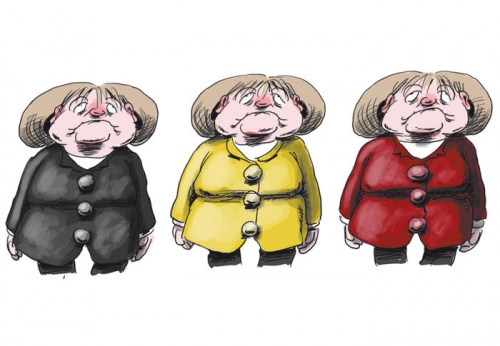
The Grundgesetz aims to uphold a system of values fully integrated into the worldview of the Western powers. It does so by enshrining a constitutional system of checks and balances and a notion of equal rights, both before the law and in respect of ever-more aspects of daily life. The principle purpose of the Grundgesetz can be summarized thus: to ensure that nobody comparable to Hitler or a person of that ilk, and nothing like his party (or indeed any movement propounding an “anti-democratic” vision – or at least what is interpreted as such by the establishment) – ever holds sway in Germany again.
The Grundgesetz borrowed many features from the American Constitution. There is a President (whose role is principally symbolic); a head of state called the Chancellor (whose role roughly corresponds to a weakened version of the American presidency); two legislative houses, the Bundestag and the Bundesrat, which are comparable to the House of Representatives and the Senate; the equivalent of the Supreme Court, the Bundesverfassungsgericht; and a body called the Verfassungsschutz (Defense of the Constitution). The Bundestag is (more or less) directly elected. The regional parliament (Landrat) elects members to the Bundesrat. For decades, as in the United States and the United Kingdom, West Germany, and then reunified Germany, has had an essentially two-party system. The two principal parties have always been the Social Democratic Party (SDP) and the Christian Democratic Union-Christian Social Union (CDU-CSU), with a shadow liberal party, the Free Democratic Party (FDP) in attendance to catch protest votes. The SDP was founded in 1863 as a socialist party, and is the only political party in the German Republic to have existed before the war; the CDU-CSU (sometimes called “the Union”) claims to be Christian, social, and pro-free market; the FDP is also a strongly free market-oriented party.
As head of state, the Chancellor does not have the same powers as the American President. The Federal Court is appointed by the legislature, not the President, and enjoys retrospective powers (that is to say, it can declare laws which have already been passed as “unconstitutional,” and therefore per definition null and void). The governing committees of the major parties exercise effective control over who is selected as a parliamentary candidate on their respective party tickets. Thanks to a seniority list and a highly complex system of proportional representation combined with direct voting – a system so complicated that even educated Germans are hard-put to explain it to outsiders – a political loose cannon will not be able to make his or her way to the top of a list of candidates without falling under close establishment scrutiny. Another notable feature of this self-serving system is that the political parties are financed in large part by the taxpayer, and receive state funding in proportion to the number of votes they garner in a general election, specifically an initial eighty cents for every vote they receive. The CDU received over eleven million euros from the German taxpayer out of the 2017 general election alone. Even a small nationalist party like the National Democratic Party (NPD), which appears to boast more members of the Verfassungsschutz in its ranks than genuine nationalists, is funded in this way by the taxpayer.
Members of Parliament are payed handsomely, earning a salary of 9,541.74 euros per month. This does not include an additional expense account bonus (travelling, entertainment, etc.) of another 4,300 euros a month. As public employees, or Beamter, German parliamentarians are exempt from pension deductions from their salary. Nevertheless, they receive a substantial state pension for every year they sit in Parliament. It seems that the work of an elected representative is not so hard as to exclude the opportunity of taking up additional jobs on the side. Thus it is that all those who take part in German politics, including those who seek change, are sucked into a machinery of massive self-enrichment. I know of no state in the world where the system so effortlessly and successfully corrupts its harshest critics. Anyone who enters their local or national parliament is showered with privilege and munificence. On the other hand, there is a stick to go with the carrot: A member of any organization deemed by the state to be an enemy of the Grundgesetz is automatically disqualified from holding public office, and will find it difficult to obtain or hold any good job, or indeed any job in the public sector at all, if his status becomes public knowledge.
Article Five of the Grundgesetz enshrines the “right to free speech,” but theory and practice in this case are different beasts. Firstly, the Grundgesetz also enshrines the right to “peaceful” political protest, and, to take one example, all opposition to non-European immigration will be obstructed from day one by “peaceful” protests organized by groups which are often state-funded. Secondly, the word “peaceful” is very loosely interpreted indeed, and permits loud music to be played to disrupt events, and for demonstrators to physically obstruct conference attendees from entering a venue. Thirdly, said “peaceful” protest will be invariably accompanied by a fringe whose main form of protest will be physical intimidation, the destruction of property, and threats to any establishment which hosts any “unconstitutional,” “undemocratic,” or “fascist” group. If compelled against their will to acknowledge the existence of such non-peaceful protest at all, the “peaceful” protesters – which will include members of all the establishment political parties – will shed crocodile tears and mendaciously claim that the fringe activities in question were exceptional, but nevertheless understandable, in view of the “provocation” involved. Thus, it is the case that while free speech and free assembly are in theory guaranteed by the Constitution, in reality anyone stepping out of the narrow, and ever-narrowing, internationalist liberal and “democratic” consensus of the Republic will invite severe repercussions on their heads.
Anyone deemed to be conspiring against the Constitution is regarded ipso facto as an enemy of the state, and will be “placed under observation” by state intelligence, aka the Verfassungschutz, an organization which is directed by government appointees. The Verfassungschutz itself decides what group or movement is acting outside the limits of constitutional order. Being “placed under observation” is a political and social kiss of death. Those who receive notice that they are being “observed” by the Verfassungsschutz may attempt to “improve” their behavior, and thus be rewarded with the removal of their group from the list of those under observation – for if they do not, they run the risk of being further adjudged by the Verfassungsschutz after a period of observation to be “enemies of the Constitution” (Verfassungsfeind), after which they will be banned. The group’s being banned is not only a matter of declaring members to be outlaws, but also entails losing the right to propagate its message, and it will of course no longer benefit from state subsidies.
In recent years, this self-serving system which, since the war, has ensured that the little German state remained entirely subservient to the ideology of the West, has come under strain. The two-party system has been seriously eroded, firstly as a result of the emergence of a Green (Grünen) party in the 1980s – a party which was originally conservative, but which was soon taken over by extreme internationalists. Even though it is entirely loyal to the system, it has nevertheless disrupted the two-party balance that was an important part of the system’s stability. After the reunification of East and West in 1990, there followed other “new kids on the block”: firstly, the repackaged ex-Communist Party, which was called – with that lack of imagination for which Germans are justly famous – die Linke (“the Left”); and finally, in more recent years, a party “to the right of the CDU” called Alternative für Deutschland (Alternative for Germany, or AfD) – a name conceived as a riposte to Merkel’s famous statement that there existed “no alternative” to her policies.
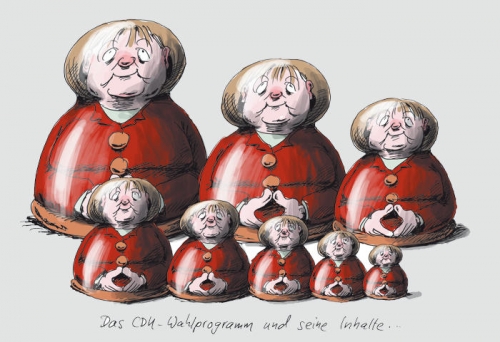
The expression “to the right of the CDU” has special resonance. It is an expression which is often repeated by establishment speakers, and refers to the Republic’s red line of “democracy.” From its foundation, the German state dedicated itself to ensuring that no party would flourish which espouses views further to the political Right than the suburban “growth and security” mantras of the CDU-CSU. Not having a party of any significance “to the right of the CDU” is seen as proof of the dedication of the “new Germany” to the “values of democracy.” In this respect, all the establishment parties are in complete accord. Any group or individual daring to utter views deemed to be “to the right of the CDU” will be mocked, denounced in the press, its representatives will be hounded from public office, its organizations will be infiltrated by the Verfassungsschutz, and its activities will at every turn be intimidated by the “anti-fascist” Left with the tacit approval of the “democratic” and “peaceful” politicians of the establishment. All the time, the Sword of Damocles of “observation by the Verfassungsschutz” hangs over every movement “to the right of the CDU.”
For years, the German Republic has been at the forefront of promoting a pan-European democratic order throughout all of Europe. During the long chancellorship of Angela Merkel, who was party Chairman of the CDU as well, the aim of replacing the indigenous German population through mass immigration on such a scale as to destroy German identity forever is no longer a matter of circumspection or conspiracy, since the intention is quite open. Merkel received the Charlemagne Prize in 2008 for her services towards European unity. Significantly, the first winner of the prize was Richard von Coudenhove-Kalegri in 1950, the half-Asian writer who founded the Pan-European Union, a project for a mulatto Europe. “Germans” are, as Merkel herself defines it, “those who live in this country.” No public figure ever questioned her definition of nationhood.
Many times over the years, parties have arisen “to the right of the CDU,” but until recently the checks and hindrances briefly mentioned here have effectively thwarted every attempt by such parties to become a permanent feature of the political landscape. The two-party system was able to accommodate the Grünen, who governed in coalition with the SPD from 1998 until 2005. Since 2005, there has been a gradual decline in support for the two major parties – the so-called Volksparteien (peoples’ parties) – both in terms of votes, but also in respect of membership. With a cynicism extreme even by the low standards of the German Republic, the CDU and the SPD now govern together, while the largest opposition party, the AfD, is frozen out of all cross-party initiatives in and out of the Bundestag. So long as erosion of support is reflected in terms of abstentions, the system at least ensures that the other political parties receive the same generous funding. However, when a new party emerges and gains seats in the Bundestag, it effectively takes money away from the other parties. Since its inception in 2013, the AfD, which is now represented in every regional parliament as well as the Bundestag, is not only siphoning off votes, it is syphoning euros away from them as well, which is seen by them as an intolerable affront to what the leader of the FDP calls the “coalition of democracy.”
The system is biased to ensure that one of the two main parties remains in power even when the share of the votes for the party is low. In the 2017 election, the CDU-CSU share fell from 41.5 percent to 32.9 percent. Merkel remained in power, but it was an unwelcome warning to the “Volksparteien” that the SPD share of the vote fell as well, from 25.7 percent to 20.5 percent. Up to this time the results for the two parties have see-sawed, with results for one party rising as results for the other fell. Both parties now cling to each other in an uneasy governmental alliance.

The success of the Afd is owing to two main factors: one is the courage of its members, many of whom risk intimidation, the loss of their jobs, and threats to their family just by publicly acknowledging their membership; the other is Merkel’s decision to allow a million pesudo-refugees to cross the German border in 2015. This outrageous decision was seen by many – and not only in the AfD – as an abuse of the constitutional provision which allows the acceptance of genuine refugees, as well as being a flagrant disregard of parliamentary privilege, since she took the step without consulting the Bundestag or even her own government colleagues. Some have even suggested that the decision was unconstitutional. Klaus Rüdiger Mai, writing for the ultra-internationalist Die Zeit on September 22, 2017, dismissed all such objections. It is in any case irrelevant, he opined, what the federal law or constitutional provision may stipulate, because “the European provisions override the constitutional right to asylum, which effectively has no further role to play.” Observers of the European political scene will be all too familiar with this blame-shifting game, where the national government and its supporters in the media intimate that an unpopular or legally questionable enactment or law is Brussels’ responsibility, while Brussels affirms that it is the national governments which make the decisions.
Be that as it may, the 2015 decision, which followed the bungling of the euro crisis in 2010, as well as populist sentiment growing elsewhere in Europe, has accelerated the decline of the two so-called “Volksparteien.” In spite of this, no prominent CDU member has dared challenge Mutti until this year. In an unstable world, voters in the German Republic are fearful of change, and Merkel’s non-ideological, tedious, unemotional platitudes appealed to voters feeling insecure and threatened in an age of political and environmental upheaval. So Mutti acted as a bromide. Her message, insofar as we might concede that her dreary sermons hold any substantial message at all, could be summarized as “everything is fine, we can manage, we are growing every day, there is no alternative.”
Mutti governments were especially adept at manipulating green issues to create economic growth. Every “environmentally friendly” provision, from the installation of filters in diesel cars, to the insulation of buildings with costly cladding, to new regulations for building materials and new safety provisions, all – as though by chance – have brought with them full order books in the affected branch of the economy and opened new business opportunities. The Chancellor always had an open ear for business opportunities of every kind, so long as they promote growth, boost her popularity, and pump up the GDP. The year Merkel opened the gates to a million “refugees” was the first of a series of good years for the construction industry, which had been suffering from the knock-on effect of stagnating birth rates in the form of declining demand for housing. A million “new citizens” gave the industry a shot in the arm, in addition to ongoing support in the form of complex energy-saving provisions for buildings, state-backed renewable energy investment, and costly and legally enforceable building “improvements.” It is no coincidence that costly regulations fall less heavily on the public sector than they do on the private sector. In the end, the cliché – like so many national clichés – about German obedience and awe of authority goes some way toward explaining the astonishing fear and subservience which Merkel enjoyed from the majority of citizens. CDU party conferences were not easily distinguishable from the former Communist Party conferences in East Germany, from where Merkel herself originates – and they were about as exciting.

Signs of real dissatisfaction with Mutti first made themselves felt in the CDU’s sister party, the CSU. The CSU is the equivalent of the CDU in Bavaria, to which it is confined. It has traditionally operated as the conservative wing of the CDU-CSU, and has been ruling Bavaria without interruption since the founding of the Republic. With opinion polls indicating a strong shift away from the CSU and towards the AfD in Bavaria, the President of the CSU, a trimmer named Horst Seehofer, began to take a tone more critical of “refugees,” presumably in an attempt to win back votes; it was an attempt which failed, but marked a precedent in that a member of the ruling coalition had plainly taken a line in unequivocal opposition to Mutti‘s. It was as though a sheep had barked.
The precedent was soon followed. On September 25, 2018, the CDU elected its new parliamentary Chairman, a fast-speaking, shrill stuffed shirt named Ralph Brinkhaus. This, although in itself unremarkable, thrilled mainstream journalists. It was seen as significant because Brinkhaus won in competition (practically unknown in itself) with Merkel’s favorite, Volker Kauder. It says a lot about how politics in the Republic works when one learns that Kauder, Merkel’s unquestioning and obedient servant, had been reelected at each party conference, unchallenged ever since she first became Chancellor in 2005. This little shock was followed by another, in the elections for the Bavarian regional parliament on October 14. The CDU and SPD each lost 10 percent of their vote compared to 2013, while the Grünen and AfD each gained 10 percent.
The results of the election in Hesse on October 28 were very similar, being accompanied by a sinister precedent: along with the normal ballot paper, the electors in Hesse were handed a list of fifteen questions introduced by the Grünen-CDU regional government which were described as “proposals to amend the regional constitution.” This so-called referendum, consisting of questions on a paper handed to voters at the same time as their voting slip, put forward single-sentence proposals principally aimed at linking the state constitution to the ideology of internationalism. The simplistic proposals were explained in a separate pamphlet which was not given to the voters on election day. Among other measures which were proposed not as new legislation, but as texts to be added to the state’s constitution, were the right of the state to decide on the well-being of children, the passing of laws electronically, and the existing description of Hesse as “part of the Republic of Germany” to be amended to include “and part of the EU and a united Europe.” Voters put their cross to a document of apparently harmless generalizations whose import it was not intended they should understand. All fifteen proposals for amendments to the constitution were approved with massive majorities.
In the wake of the electoral affronts to her dignity, Angela Merkel announced that she would not be standing as a candidate for Chairman of the CDU in December. Wholly in character is the non-consultative style of the woman who seems to have made this announcement without previously discussing it with her colleagues: the surprise of even her closest party comrades to the announcement seems genuine. However, her intention of resigning as party Chairman has been accompanied by her declared intention to soldier on as Chancellor. This arrogant gesture, contemptuous of both her party and the people she claims to govern, has been a bit too much even for some servants of the system to swallow. The leader of the FDP, Christian Lindner, while paying the usual obsequious tribute to Mutti, has argued that a fresh impetus is as desirable in the nation as it is in the CDU, meaning in the diplomatic language of establishment politicians that she should resign as Chancellor as well. Merkel’s curious resignation/continuation statement possibly serves two purposes: to ensure minimum disruption in her party and to the system as a whole, and to assist her preferred candidate in succeeding her. Her decision means that the Chairman of the governing party and the head of state would be two different people, something impossible in many countries, and without precedent in the Federal Republic.
A slew of candidates have rushed to apply for the job of CDU Chairman, of whom three are regarded as having a serious chance of being elected. The candidates are not chosen by party members, but rather by party delegates at the national conferences. One candidate is a woman who looks like a man, and enjoys the silly, tongue-twisting name (even for Germans) of Annegret Kamp-Karrenbauer. She/he is the Merkel favorite – if not clone – and seems to have worked for years as the Chancellor’s characterless factotum. Another candidate is the Health Minister Jens Spahn, who some consider “unsound” because he has expressed the view that an overgenerous policy regarding immigration has driven CDU voters into the arms of the AfD.
The third candidate is none other than Merkel’s personal enemy, Friedrich Merz, who happens to be a member of the exclusive Trilateral Commission, a passionate free-marketer, and a lawyer who has made himself fabulously rich advising and liaising in company takeovers and mergers after retiring from politics since Merkel beat him to the CDU chairmanship in 2005. He also sits on several supervisory boards, including BlackRock. Merz once unsuccessfully appealed to the Verfassungsgericht against a law obliging members of the Bundestag to publicly reveal what jobs they had outside of being parliamentary deputies. Unlike Merkel and his two opponents, Merz is an able and relaxed speaker. He has not been a member of the Bundestag since 2009, but no doubt the CDU could settle that small problem were he to become its Chairman. Merz also has good connections in the United States, and would undoubtedly seek to improve European-American relations, whoever happens to be the American President. There is a hint that he is not entirely unsympathetic to the Europe-as-a-superpower thesis of writers such as Jean Thiriart, a view which sees a united Europe not as a way towards a one-world state, but rather as a superpower comparable to the US or China. Sebastian Kurz in Austria also seems to be inclined to this view. But to what extent an Atlanticist like Merz would really close the borders or expel illegal “refugees” is very doubtful. The two male candidates have expressed their desire to attract dissatisfied AfD voters back into the CDU fold. From the point of view of the AfD, Merkel’s favorite should arguably be the optimal choice, since a continuation of the Chancellor’s extremist internationalism would be the best way to bolster a genuine opposition – but such a point of view is too cynical for the AfD, whose leaders have publicly declared that an AfD-CDU coalition under Merz or Spahn is conceivable, with no mention of a Kamp-Karrenbauer one.

Whatever happens in Germany in the coming months and years, the damage caused by the outgoing Chancellor is probably irreparable. The ethnic base of the German people, which was first decimated by war and then weakened by massive Turkish immigration, is unlikely to survive the final death blow of the million pseudo-refugees she welcomed in. The ethnic base is not even reproducing itself while the newcomers flourish, a development which became an established pattern during the term of a woman who, appropriately enough, is herself childless.
Churchill famously said that “our intention is to make Germany fat, but impotent.” Impotent the Germans may be, and they are also fat, literally and in terms of economic prosperity. The Federal Republic of Germany is the financial powerhouse of Europe, is profoundly sympathetic to internationalist NGOs, and endeavors to excel as the financial engine which drives the euro and the EU project as a whole. (Having been expelled from Budapest, it is no surprise to learn that George Soros’ Open Society Foundations decided to move to the more congenial political climate offered by Berlin.) Citizens of the Republic are coddled by all kinds of social insurance, rental protection, and job security. In relation to income, the prices for food, drink, and household goods are among the lowest in Europe.
If there is hope for any kind of reaction to the slow genocide of the German indigenous population, it lies, among other things, in the falling support for both wings of the dreary CDU-SPD coalition, as well as in the increasing and justified distrust of the mainstream media’s propaganda and the Republic’s “democratic” swindle, coupled with fear of and the real possibility of economic turbulence to come. Public weariness with the “same old song” of the old parties and their media friends is evident, as is widespread disquiet at Mutti‘s increasing high-handedness. Also, the AfD has achieved the feat of being the first party “right of the CDU” to be represented in all regional parliaments at the same time.
How can it be that a woman whose total personal, intellectual, physical, moral, and rhetorical mediocrity is evident at every step she takes – and from the first words she utters – has remained head of state for so long? Even more than most, German voters are drawn to authority, stability, and reassurance. Shrillness and insecurity frightens them. Merkel was very successful in presenting a picture of low-key but hugely complacent economic security and superiority, a formula which pleased millions. The German Republic, bar a few “refugee” outrages, has remained a sea of tranquility in a troubled world, and a sea of prosperity, too; both are perceived, rightly or wrongly, as Merkel achievements. She represented the benefits of a non-confrontational style of government which benignly blessed economic prosperity, especially in terms of nearly full employment, which was itself fuelled by a successful and expanding export market.
Whenever she has been confronted with strong criticism, mostly from the Linke or the AfD, she does not respond to it. She ignores it. Denounced in the Bundestag for encouraging massive income disparity by Sarah Wagenknecht, leader of Die Linken, Merkel pointedly played with her mobile phone for the duration of Wagenknecht’s speech; when attacked by the AfD’s Alice Veidel in the Bundestag, she simply rose and left the chamber.
But while Merkel made a virtue of her vacuity, German business has played another tune. Politically inept and hardly independent on the world stage, behind the scenes the German Republic has been tough in business matters, placing good sales pitches for German goods and closing many lucrative deals. A notoriously complex domestic tax system offers substantial opportunities for tax relief to companies and the self-employed, and helps to keep the wheels of the economy well-oiled. However, were for any reason those wheels to slow down or halt, such as if the export boom upon which German prosperity is wholly dependent to founder, the security-loving Germans who would be cheated of their cherished Wohlstand (prosperity) may well become less placid and complacent about the political system than they have been until now.
The democratic alliance of parties not “to the right of the CDU” will be doing all it can in the coming months to ensure that the Federal Republic remains just as Churchill wanted it to be: fat and impotent. It is not talk or logic, nor any kind of romanticism, which would lead to a collapse or rejection of the present system. A sea change can only come about if the average Hans loses the benefits and security of the post-war German consumer society – if he began, so to speak, to lose weight. A lean and hungry Germany would look very different from the docile Federal Republic that was created in 1949. It might look more like the Weimar Republic of 1929. The priority for Merkel’s successor, whoever he or she may be, will be to ensure that such a catastrophe does not befall the land of the impotent and the fat.
10:58 Publié dans Actualité, Affaires européennes | Lien permanent | Commentaires (0) | Tags : angela merkel, michael walker, allemagne, europe, affaires européennes, politique internationale |  |
|  del.icio.us |
del.icio.us |  |
|  Digg |
Digg | ![]() Facebook
Facebook
dimanche, 11 novembre 2018
Presseschau November 2018

Presseschau
November 2018
AUßENPOLITISCHES
Bargeldabschaffung: So weit ist es schon gekommen - Interview Dr. Norbert Häring
https://www.youtube.com/watch?v=S3R6Dx8jT9A&t=3s
Vier von fünf Deutschen glauben an die EU
https://jungefreiheit.de/politik/ausland/2018/vier-von-fu...
Ungarns Regierung erhöht Druck
Soros-Stiftung zieht von Budapest nach Berlin
https://jungefreiheit.de/politik/deutschland/2018/soros-s...
(Italien-EU-Krise)
Fragwürdige Stellungnahme im Italien-Konflikt
Da liegt Alice Weidel leider falsch
von Wolfgang Hübner
http://www.pi-news.net/2018/10/da-liegt-alice-weidel-leid...
Frankreich
Stinkefinger-Foto mit Macron löst Ärger aus
https://www.welt.de/politik/ausland/article181722320/Emmanuel-Macron-Aerger-um-Stinkefinger-Foto-in-Saint-Martin.html
https://twitter.com/MLP_officiel/status/1046427743905353729/photo/1
Saint-Martin
Oben-Ohne-Foto mit Macron: Krimineller Schwarzer muß in Haft
https://jungefreiheit.de/politik/ausland/2018/oben-ohne-f...
Vortrag bei der Gates-Stiftung
Macron: Nur ungebildete Frauen kriegen viele Kinder
https://jungefreiheit.de/politik/ausland/2018/macron-nur-...
Emanuel Macron
Le Zeitgeist c‘est moi
https://jungefreiheit.de/debatte/kommentar/2018/le-zeitge...
Jeremy Hunt
Nach Sowjetunion-Vergleich: EU-Politiker fordern Entschuldigung von britischem Außenminister
https://jungefreiheit.de/politik/ausland/2018/nach-sowjetunion-vergleich-eu-politiker-fordern-entschuldigung-von-britischem-aussenminister/
Österreich
Strache enthüllt Denkmal für Trümmerfrauen
https://jungefreiheit.de/politik/ausland/2018/strache-enthuellt-denkmal-fuer-truemmerfrauen/
Griechenland fordert weiter Reparationen von Deutschland - Gregor Gysi macht Vorschlag für Zwangskredit
https://web.de/magazine/politik/griechenland-reparationen...
Wahlen in einem zerrissenen Land
Eliten in Bosnien wollen das Chaos erhalten
https://www.n-tv.de/politik/Eliten-in-Bosnien-wollen-das-...
Vorläufiges Endergebnis nach Parlamentswahl in Lettland
https://www.zeit.de/news/2018-10/07/vorlaeufiges-endergeb...
Vorsitzender der belgischen Islam-Partei: „Islamischer Staat ist mit dem belgischen Gesetz konform“
https://www.epochtimes.de/politik/europa/vorsitzender-der...#
Norwegen entschuldigt sich bei „Deutschenflittchen“
https://www.welt.de/geschichte/zweiter-weltkrieg/article1...
Mittelamerikaner marschieren Richtung USA
Trump warnt vor Migranten: „Das ist ein Angriff“
https://jungefreiheit.de/politik/ausland/2018/trump-warnt...
(Diese Studie zeigt offenbar das Forschungsniveau in Kalifornien und Arizona)
Studie
Wegen Trump: Studenten leiden an Posttraumatischem Belastungssyndrom
https://jungefreiheit.de/politik/ausland/2018/wegen-trump...
Verwaltungsräte
Kalifornien beschließt Frauenquote und Bußgelder
https://jungefreiheit.de/politik/ausland/2018/kalifornien...
Abstimmung im Senat
Brett Kavanaugh als Richter am Supreme Court vereidigt
https://www.welt.de/politik/ausland/article181789522/Abst...
(Richterwahl in den USA)
Was uns das angeht
Die Vereinigten Staaten haben als „Elitenation“ (offizieller Terminus Technicus der Medienwissenschaften!) einen besonderen Nachrichtenwert.
https://sezession.de/59481/was-uns-das-angeht
Transgender-Politik
Trump gegen die Apostel der Vielfalt
von Boris T. Kaiser
https://jungefreiheit.de/debatte/kommentar/2018/trump-geg...
Attentate: Die obszöne Schuld-Verlagerung auf Trump
https://www.achgut.com/artikel/attentate_obszoene_schuldv...
Richtungsweisende Wahlen : Wie weit nach rechts rutscht Brasilien?
http://www.faz.net/aktuell/politik/ausland/wahlen-wie-wei...
Präsidentschaftswahl in Brasilien
Rechtspopulist Bolsonaro gewinnt erste Runde deutlich
Es ist eine der wichtigsten Wahlen in Brasilien seit Jahrzehnten: In der ersten Runde hat der rechte Kandidat Jair Bolsonaro gewonnen. Im Kampf um das Präsidentenamt muss er gegen den Linken Fernando Haddad in die Stichwahl.
http://www.spiegel.de/politik/ausland/brasilien-jair-bols...
Wahlamt bestätigt
Rechtspopulist Bolsonaro wird nächster Präsident Brasiliens
Jair Bolsonaro hat die Stichwahl um das Präsidentenamt in Brasilien gewonnen. In einer ersten Reaktion kündigte der ultrarechte PSL-Kandidat an: "Ich werde das Schicksal des Landes verändern."
http://www.spiegel.de/politik/ausland/brasilien-jair-bols...
Fall Khashoggi
Merkel gegen weitere Rüstungsexporte nach Saudi-Arabien
https://jungefreiheit.de/politik/deutschland/2018/merkel-...
Graffiti an altem Gebäude in Thailand – Touristen droht Haft
https://orf.at//stories/3070261/

INNENPOLITISCHES / GESELLSCHAFT / VERGANGENHEITSPOLITIK
Wachsendes Wohlstandsgefälle
Deutschland driftet auseinander
Digitalisierung, Rente, Landflucht und eine alternde Bevölkerung - das sind die Herausforderungen, denen sich Deutschland bis zum Jahr 2045 stellen muss. Während der
Süden und die Städte weiter aufblühen, droht der Osten abgehängt zu werden.
https://www.n-tv.de/politik/Deutschland-driftet-auseinander-article20648998.html
Über 67. Lebensjahr hinaus
Rentenexperte Rürup für noch späteres Renteneintrittsalter
https://jungefreiheit.de/wirtschaft/2018/rentenexperte-ru...
Tag der Deutschen Einheit
Ein gespaltenes Land
https://jungefreiheit.de/debatte/kommentar/2018/ein-gespaltenes-land/
Debatte in der CDU
„Mit Konservatismus wird man nicht weit kommen“
Aus Sicht des Politologen Jens Hacke hat Konservatismus als ideologischer, übergreifender Terminus ausgedient. Die Themen, die damit aktuell in Verbindung gebracht würden – etwa Heimat oder Familie – fielen gar nicht in die Zuständigkeit der Politik. Die aktuelle Debatte innerhalb der CDU bezeichnete Hacke als „typische Reanimationsversuche“.
https://www.deutschlandfunk.de/debatte-in-der-cdu-mit-konservatismus-wird-man-nicht-weit.694.de.html?dram:article_id=415057
Parteitag der Saar-CDU
Merkel warnt vor Nationalismus: „Wehret den Anfängen“
https://jungefreiheit.de/politik/deutschland/2018/merkel-...
Die „Austriakisierung“ Deutschlands und der VS
von Martin Sellner
https://sezession.de/59482/die-austriakisierung-deutschla...
Bosbach möchte nicht mehr nach Merkel gefragt werden
https://www.welt.de/regionales/nrw/article181714752/Bosba...
Proteste gegen Frauenmarsch
Demonstrationsblockade: Grünen-Abgeordnete soll Immunität verlieren
https://jungefreiheit.de/politik/deutschland/2018/demonst...
Hamburger Bürgerschaftswahl
Grüner Wahlhelfer soll Dutzende Unterlagen gefälscht haben
https://jungefreiheit.de/allgemein/2018/gruener-wahlhelfe...
Neue Parteigruppierung
Arbeitsgruppe „Juden in der AfD“ gründet sich in Wiesbaden
https://jungefreiheit.de/politik/deutschland/2018/juden-i...
AfD in Bayern: Erfolg und Ernüchterung
http://www.pi-news.net/2018/10/afd-in-bayern-erfolg-und-e...
Landtagswahl
Bayern bebt
von Dieter Stein
https://jungefreiheit.de/debatte/streiflicht/2018/bayern-...
Bedford-Strohm: Bayernwahl war Zeichen gegen Hetze
https://jungefreiheit.de/politik/deutschland/2018/bedford...
Der Höhenflug der Grünen
„Generation Schulze“ will die Welt retten
von Boris T. Kaiser
https://jungefreiheit.de/debatte/kommentar/2018/generatio...
Der Abstieg der SPD
Das verdiente Ende
von Guido Reil
https://jungefreiheit.de/debatte/kommentar/2018/das-verdi...
Bundestag
Großer Andrang: Petitionsausschuß berät über „Erklärung 2018“
https://jungefreiheit.de/politik/deutschland/2018/grosser...
Aufruf zur Stärkung der EU
Ex-Minister werben für Kampf gegen Nationalismus
https://jungefreiheit.de/politik/deutschland/2018/ex-mini...
Schleswig-Holstein
Grüne fordern Imame im Religionsunterricht
https://jungefreiheit.de/politik/deutschland/2018/gruene-...
"Isch arbeite bei der Polizei"
Berliner Polizei rappt für Toleranz und Multikulti
https://jungefreiheit.de/politik/deutschland/2018/berliner-polizei-rappt-fuer-multikulti/
Rap-Video
Islamisten-Filmemacher drehte Video für Berliner Polizei
https://jungefreiheit.de/politik/deutschland/2018/islamis...
Rap-Video
Berliner Polizei verteidigt Kooperation mit Filmemacher von Islamisten-Video
https://jungefreiheit.de/politik/deutschland/2018/berline...
"Landgerichte lassen zu viel Milde walten"
Amtsrichter rechnet mit Kuschel-Justiz ab
https://jungefreiheit.de/politik/deutschland/2018/amtsric...
Angebliche Terrorgruppe
Verfahren gegen mutmaßlichen Helfer von Franco A. Eingestellt
https://jungefreiheit.de/politik/deutschland/2018/verfahr...
(Gesellschaftliche Zustände)
Bar-Streit auf St. Pauli eskaliert
42 Streifenwagen im Einsatz – fünf Festnahmen
https://www.mopo.de/hamburg/polizei/bar-streit-auf-st--pa...
Entrüstung nach Aussagen zur Kolonialzeit
Abgeordnete werfen Afrika-Beauftragtem der Bundesregierung Rassismus vor
https://jungefreiheit.de/politik/deutschland/2018/abgeord...
Stasi-Gedenkstätte Hohenschönhausen
Drei Stiftungsbeirat-Mitglieder erheben Vorwürfe und treten zurück
https://jungefreiheit.de/politik/deutschland/2018/drei-st...
AfD wirft Bundesregierung Untätigkeit bei Benes-Dekreten vor
https://jungefreiheit.de/politik/deutschland/2018/afd-wir...
Diskussion nach Tauber-Tweet
Grünen-Politiker fordert Umbenennung von Rommel-Kasernen
https://jungefreiheit.de/politik/deutschland/2018/gruenen...
(Indoktrination unbedarfter Schüler)
Schüler beteiligen sich an Wanderausstellung
„Der Weg der Sinti und Roma“: Minderheit als Sündenbock
https://www.op-online.de/region/muehlheim/sinti-roma-schu...

LINKE / KAMPF GEGEN RECHTS / ANTIFASCHISMUS / RECHTE
Neue Hysterie gegen Rechts
Die Reihen schließen sich
von Kurt Zach
https://jungefreiheit.de/debatte/kommentar/2018/die-reihe...
(Gewaltapologie in der jungen Medien-Kaste)
Alexander Gaulands und Michael Seemanns Populismus
von Martin Lichtmesz
https://sezession.de/59476/alexander-gaulands-und-michael...
(Sündenbock gefunden)
Debattenkultur
Barley beklagt Demokratieverachtung in Deutschland
https://jungefreiheit.de/politik/deutschland/2018/barley-...
Sprecherin für Antifaschismus
Niedersachsen will auch Linksextremismus bekämpfen – Kritik von Grünen
https://jungefreiheit.de/politik/deutschland/2018/nieders...
„Keine Plattform für extreme Positionen“
Stiftung Bauhaus untersagt ZDF Konzert mit „Feine Sahne Fischfilet“
https://jungefreiheit.de/kultur/gesellschaft/2018/stiftun...
Nach Bauhaus-Entscheidung
Streit um abgesagtes Konzert von „Feine Sahne Fischfilet“
https://jungefreiheit.de/politik/deutschland/2018/streit-...
Linksradikale Punkband
„Feine Sahne Fischfilet“: Bauhaus bedauert Konzert-Absage
https://jungefreiheit.de/kultur/2018/feine-sahne-fischfil...
Debatte um Konzert-Absage Feine Sahne Fischfilet:
Bauhaus Dessau entschuldigt sich für Absage
https://www.mdr.de/kultur/bauhaus-dessau-entschuldigung-f...
Punkband sucht Konzertort: Stadt und Theater in Dessau für Auftritt von Feine Sahne Fischfilet
http://www.faz.net/aktuell/feuilleton/stadt-und-theater-d...
(Zu Feine Sahne Fischfilet und der Bauhaus-Geschichte)
Stützen der Gesellschaft
Druck auf das Bauhaus Stalin, Ulbricht und dem NKWD gefällt das
https://www.welt.de/kultur/stuetzen-der-gesellschaft/arti...
Die erwachsenen Kinder der sozialen Frage
Die sozialistische Linke als Handlanger der Hochfinanz. Der Vorwurf ist über hundert Jahre alt und trifft noch immer.
https://www.blauenarzisse.de/die-erwachsenen-kinder-der-s...
Angst und Hetze
https://www.blauenarzisse.de/angst-und-hetze/
Christliche Kirchen verurteilen Gründung jüdischer AfD-Gruppe
„Missbrauch der religiösen Botschaft zur Propaganda“
https://www.op-online.de/offenbach/offenbach-christliche-...
Heinrich Bedford-Strohm und Josef Schuster
Schuldig im Sinne ihrer eigenen Anklage
von Karlheinz Weißmann
https://jungefreiheit.de/debatte/kommentar/2018/schuldig-im-sinne-ihrer-eigenen-anklage/
Globalisierung
Warum die Anti-Internationalisten gefährlich sind
Da scheinen sich Donald Trump und Sahra Wagenknecht einig: Das Globale ist ein Problem, wir brauchen nationale Lösungen. Alexander Gauland will sogar lieber deutsch als "Mensch" sein. Das ist kurzsichtig - und entlarvend.
Eine Kolumne von Christian Stöcker
http://www.spiegel.de/wissenschaft/mensch/globalisierung-warum-die-anti-internationalisten-gefaehrlich-sind-a-1230569.html
„unteilbar“-Demonstration
Wagenknecht: Forderung nach offenen Grenzen irreal
https://jungefreiheit.de/politik/deutschland/2018/wagenkn...
(Das interessiert den Verfassungsschutz nicht.)
Berlin
Grüne solidarisieren sich mit Hausbesetzern
https://jungefreiheit.de/politik/deutschland/2018/gruene-...
Verfassungsschutz sammelt Material über AfD
http://www.faz.net/aktuell/verfassungsschutz-sammelt-material-ueber-afd-15816492.html
Drohung gegen die AfD
Verfassungsschutz und Machtmißbrauch (II)
von Thorsten Hinz
https://jungefreiheit.de/debatte/kommentar/2018/verfassungsschutz-und-machtmissbrauch-ii/
„Höchst problematisch“
Staatsrechtler kritisiert Verfassungsschutzäußerungen zur AfD
https://jungefreiheit.de/politik/deutschland/2018/staatsr...
Weißer Ring macht AfD für möglichen Gewaltanstieg verantwortlich
https://jungefreiheit.de/politik/deutschland/2018/weisser...
AfD im (Schul)-Klassenkampf
https://www.achgut.com/artikel/afd_im_schul_klassenkampf
Der Lehrer-Pranger der AfD: Stasi mit Stasi beantwortet?
https://www.tichyseinblick.de/kolumnen/alexander-wallasch...
(Linke Attacke gegen Zahid Khan)
Wahlkampf in Hessen : AfD-Helfer zieht Waffe
http://www.faz.net/aktuell/rhein-main/wahlkampf-in-hessen...
Wegen „rechtspopulistischer“ Äußerungen
SPD-Gruppe will Heinz Buschkowsky aus Partei ausschließen
https://jungefreiheit.de/politik/deutschland/2018/spd-gruppe-will-heinz-buschkowsky-aus-partei-ausschliessen/
Frankfurter Buchmesse gegen die JF
Partymeile statt Sackgasse
von Dieter Stein
https://jungefreiheit.de/debatte/streiflicht/2018/partyme...
(dazu...)
Repressionsformen eines (fast) totalitären Gesinnungsstaates
Die neue BRD-Apartheid gegen Patrioten
http://www.pi-news.net/2018/10/die-neue-brd-apartheid-geg...
(dazu...)
Isolierung der Jungen Freiheit
Der Freiheit eine Sackgasse
https://jungefreiheit.de/kultur/2018/der-freiheit-eine-sa...
(dazu...)
Frankfurter Buchmesse
Sackgasse der Freiheit
https://jungefreiheit.de/kultur/2018/sackgasse-der-freihe...
(Linksradikalisierung der Fußball-Fan-Szene)
Zwei Fans der FC Bayern München-Amateure schlugen alles kurz und klein
Video: Interview zur Zerstörung des AfD-Infostandes in München-Giesing
http://www.pi-news.net/2018/09/video-interview-zur-zerstoerung-des-afd-infostandes-in-muenchen-giesing/
Rechtsextreme aus dem Raum Chemnitz sollen eine Terrorgruppe gegründet haben
https://www.nzz.ch/international/deutschland/rechtsextreme-aus-dem-raum-chemnitz-sollen-eine-terrorgruppe-gegruendet-haben-ld.1424701
Polizei nimmt sechs mutmaßliche Rechtsterroristen fest
https://jungefreiheit.de/politik/deutschland/2018/polizei-nimmt-sechs-mutmassliche-rechtsterroristen-fest/
Von Sachsen aus sollte "rechtsradikaler Umsturz Deutschlands" erfolgen
Revolution mit Luftgewehr und Schlagstöcken?
http://www.pi-news.net/2018/10/revolution-mit-luftgewehr-und-schlagstoecken/
Umsturz mit dem Luftgewehr? Was steckt hinter "Revolution Chemnitz"
https://www.youtube.com/watch?v=OZ1SOAyLSso
Mecklenburg-Vorpommern
Reservisten unter Rechtsextremismusverdacht ohne Beweise ausgeschlossen
https://jungefreiheit.de/politik/deutschland/2018/reservi...
Politische Korrektheit im Profifußball
Werder Bremen will AfD-Anhängern Dauerkarten entziehen
https://jungefreiheit.de/politik/deutschland/2018/werder-...
(Proletengepöbel ist Meinungsfreiheit)
AfD unterliegt Eintracht-Chef : Verfahren gegen Peter Fischer eingestellt
http://www.faz.net/aktuell/rhein-main/verfahren-gegen-ein...
Nach der Hessenwahl
Eintracht-Präsident kündigt weiteres Engagement gegen AfD an
https://jungefreiheit.de/politik/deutschland/2018/eintrac...
Arbeiter-Samariter-Bund
Keine Erste-Hilfe-Kurse für AfD
Unbarmherzige Samariter
https://jungefreiheit.de/politik/deutschland/2018/unbarmh...
Keine Erste-Hilfe-Kurse
Arbeiter-Samariter-Bund verteidigt AfD-Ablehnung
https://jungefreiheit.de/politik/deutschland/2018/arbeite...
Das war’s. Diesmal mit: Mietklauseln gegen rechts … (Und den Hass-Rappern von K.I.Z.)
https://sezession.de/59796/das-wars-diesmal-mit-mietklaus...
(Historikertag in Münster betreibt politische Instrumentalisierung von Geschichte)
Kritik an Resolution
Historiker beklagen „Einheitsfront der Wohlmeinenden“
https://jungefreiheit.de/wissen/geschichte/2018/historike...
Historikertag
Volkspädagogisches Programm
von Thorsten Hinz
https://jungefreiheit.de/debatte/kommentar/2018/volkspaed...
Bremer Linkspartei spielt Weimarer Republik
https://www.achgut.com/artikel/bremer_linkspartei_spielt_...
SPD warnt vor Paralleljustiz
Linksextreme veröffentlichen Fotos von Berliner Polizisten
https://jungefreiheit.de/politik/deutschland/2018/linksex...
Kundgebung gegen Rechts und PAG
CSU wirft SPD und Grünen Schulterschluß mit Linksradikalen vor
https://jungefreiheit.de/politik/deutschland/2018/csu-wir...
Zehntausende demonstrieren in Berlin gegen Rassismus
https://www.gmx.net/magazine/politik/zehntausende-demonst...
#unteilbar
Zehntausende demonstrieren für offene Grenzen und gegen Rechts
https://jungefreiheit.de/politik/deutschland/2018/zehntau...
Wohlfühlen - kostenlos - bei #UNTEILBAR
„Eine Viertelmillion“ beim nächsten großen Gratis-Event
http://www.pi-news.net/2018/10/eine-viertelmillion-beim-n...
„Ich glaube nicht, daß das intolerant ist“
#Unteilbar-Demo: Deutschlandfahnen waren unerwünscht
https://jungefreiheit.de/politik/deutschland/2018/unteilb...
(kritische linke Analyse)
Aufbruch ins Ungefähre
Verfasst von Dagmar Henn am 12. Oktober 2018
Kritik eines Aufrufs
https://daskalteherz.blog/2018/10/12/aufbruch-ins-ungefae...
#Wirsindmehr
Tausende demonstrieren in Frankfurt gegen Rechts
https://www.hessenschau.de/gesellschaft/tausende-demonstr...
(SPD und Grüne mit DKP und Punkern)
Frankfurt
Demonstration
Linke Gruppen rufen zur Großkundgebung gegen Rechts auf
http://www.fnp.de/lokales/frankfurt/Linke-Gruppen-rufen-z...
(Grüne mit MLPD)
Offener Brief
CSU wirft Schulze gemeinsame Sache mit Linksextremisten vor
https://jungefreiheit.de/politik/deutschland/2018/csu-wir...
Dresden: Tausende Menschen demonstrieren gegen Pegida
https://www.zeit.de/video/2018-10/5851553806001/dresden-t...
Wird Freiburg instrumentalisiert? Ja, mit guten Gründen!
https://www.achgut.com/artikel/wird_freiburg_instrumental...
Faktencheck Freiburg: Von „friedlich“ bei linken Gegendemos keine Spur
http://www.pi-news.net/2018/10/faktencheck-freiburg-von-f...
(Gleichgeschaltete Kunstszene)
"Künstler mit Herz": Reaktion auf das AfD-Ergebnis
Ein Video gegen die AfD, gedreht von der Initiative "Künstler mit Herz" und auf Facebook mehr als 2,6 Millionen Mal geklickt: Das war vor der Wahl. Und jetzt? Danach? Den Protestwählern den Wind aus den Segeln nehmen, sagt Liedermacher Roland Hefter.
https://www.br.de/nachrichten/kultur/roland-hefter-bayern...
(Linke Staatskünstler)
Vor der Landtagswahl in Hessen
Künstler rufen zur Wahl von Thorsten Schäfer-Gümbel auf
Mehr als 100 Künstler und Kulturschaffende haben wenige Tage vor der hessischen Landtagswahl ihre Unterstützung für SPD-Spitzenkandidat Thorsten Schäfer-Gümbel bekundet
https://www.monopol-magazin.de/kuenstler-rufen-zur-wahl-v...
Niedersachsen
Osnabrücker Asta verteilt Stoffbeutel mit linksextremer Parole
https://jungefreiheit.de/politik/deutschland/2018/osnabru...
http://www.pi-news.net/2018/11/fuer-deutschland-keinen-fi...
(Prozesse gegen Lügenpresse)
Café Schnellroda und Prozeßverläufe
von Götz Kubitschek
https://sezession.de/59687/cafe-schnellroda-und-prozessve...
Politisch Motivierte Kriminalität
Hitlergrüßender Afghane läßt rechte Straftaten wachsen
https://jungefreiheit.de/politik/deutschland/2018/hitlerg...
Auch rote Farbe an weiterem Denkmal
Unbekannte sprühen Hammer und Sichel an Bremer Dom
https://www.weser-kurier.de/bremen/bremen-stadt_artikel,-...
Weitere beschmiert und zerstört
AfD-Wahlplakate in Heusenstamm angezündet
https://www.op-online.de/region/heusenstamm/heusenstamm-p...
Götz Kubitschek in Frankfurt überfallen
Der umstrittene Verleger Götz Kubitschek ist vor einer Pizzeria beschimpft und angegriffen worden.
https://www.nzz.ch/international/goetz-kubitschek-in-fran...
Frankfurt
Überfall auf Verlegerpaar Kubitschek und Kositza
https://jungefreiheit.de/politik/deutschland/2018/ueberfa...
Resultat von Hetze gegen alles, was „rechts“ ist
Überfall auf Kubitschek und Kositza in Frankfurt hat viele Mittäter
http://www.pi-news.net/2018/10/ueberfall-auf-kubitschek-u...
Climate March Tübingen
Nach Gewalt-Aufforderung: Boris Palmer rüffelt Antifa
https://jungefreiheit.de/politik/deutschland/2018/nach-ge...
Politisch motivierte Gewalt
Linksextreme feiern Farbanschlag auf Steinbachs Wohnhaus
https://jungefreiheit.de/politik/deutschland/2018/linksex...
http://www.pi-news.net/2018/10/farbanschlag-auf-haus-von-...

EINWANDERUNG / MULTIKULTURELLE GESELLSCHAFT
Vorstoß zum Nationalfeiertag
Migrantenverbände fordern „Tag der deutschen Vielfalt“
https://jungefreiheit.de/politik/deutschland/2018/migrant...
Spurwechsel
Schleusenöffnungsgesetz
von Michael Paulwitz
https://jungefreiheit.de/debatte/kommentar/2018/schleusen...
AfD-Bundestagsabgeordnete über einen verhängnisvollen UN-Plan
Der „Globale Pakt für Migration“ ist eine große Gefahr für Deutschland
http://www.pi-news.net/2018/10/der-globale-pakt-fuer-migr...
Österreichs Regierung erwägt Ausstieg aus UN-Migrationspakt
https://jungefreiheit.de/politik/ausland/2018/oesterreich...
UN-Migrationspakt
Auch Österreich macht nicht mit
https://www.tagesschau.de/ausland/migrationspakt-103.html
(UN-Migrationspakt)
Unfairer Journalismus
Wir verwahren uns gegen eine durch nichts gerechtfertigte Unterstellung
https://www.tichyseinblick.de/daili-es-sentials/wir-verwa...
Der Große Austausch als „Verschwörungstheorie“
von Martin Lichtmesz
https://sezession.de/59515/der-grosse-austausch-als-versc...
„Vorurteile und Panikmache“
Migranten-Journalisten kritisieren „Bild“-Berichterstattung
https://jungefreiheit.de/politik/deutschland/2018/migrant...
Meuternde Fluggäste
England: Passagiere verhindern Abschiebung eines Vergewaltigers
https://jungefreiheit.de/politik/ausland/2018/england-pas...
(Luftnummer)
Asylpolitik
Seehofer-Erlaß führt zu drei Zurückweisungen
https://jungefreiheit.de/politik/deutschland/2018/seehofe...
„Spurwechsel“ in der Flüchtlingspolitik
Handwerkspräsident fordert Bleibeperspektive für abgelehnte Asylbewerber
https://jungefreiheit.de/politik/deutschland/2018/handwerkspraesident-fordert-bleibeperspektive-fuer-abgelehnte-asylbewerber/
Vor Abstimmung im Rathaus lautstarkes Skandieren für Seenotrettung
Video: Junge Migrationsfanatiker in Münster fordern mehr „Flüchtlinge“
http://www.pi-news.net/2018/09/video-junge-migrations-fan...
(Selbst zahlen möchten sie nicht)
Nordrhein-Westfalen
Essener Flüchtlingsbürgen sollen zahlen
https://jungefreiheit.de/politik/deutschland/2018/essener...
AfD-Anfrage
Arbeitslose Ausländer verursachen Wohnkosten in Milliardenhöhe
https://jungefreiheit.de/politik/deutschland/2018/arbeits...
„Seenotrettung“
Kardinal Marx spendet 50.000 Euro an „Mission Lifeline“
https://jungefreiheit.de/politik/deutschland/2018/kardina...
Geld für neues Flüchtlingsschiff
Fantastische 4 spenden 30.000 Euro an „Mission Lifeline“
https://jungefreiheit.de/politik/deutschland/2018/fantast...
Diskussion über Erdogan-Besuch
Erhellendes vom AKP-Mann
https://jungefreiheit.de/kultur/medien/2018/erhellendes-v...
Flüchtlinge und Hidschab-Trägerinnen sollen Polizisten werden
https://philosophia-perennis.com/2018/09/23/fluechtlinge-...
Schleswig-Holstein will Migrantenanteil im öffentlichen Dienst erhöhen
https://jungefreiheit.de/politik/deutschland/2018/schlesw...
Darmstadt
Durch Versorgungsschacht Flüchtlinge fliehen beim Toilettengang aus Abschiebegefängnis
https://www.hessenschau.de/panorama/fluechtlinge-fliehen-...
(Ismail Tipi)
Wahlplakate von CDU-Landtagsabgeordnetem beschmiert
„Gezielter Angriff auf meine Person“
https://www.op-online.de/region/dietzenbach/dietzenbach-w...
Sonntagsheld (79) – Schlag ins Gesicht für den Rechtsstaat
Till-Lucas Wessels
„Der Bayer schlägt genauso zu wie der Eritreer“
https://sezession.de/59475/sonntagsheld-79-schlag-ins-ges...
Ulm: Massenschlägerei am Busbahnhof – Zeugen sprechen von bis zu 40 jungen Männern
https://www.epochtimes.de/politik/deutschland/massenschla...
Nordrhein-Westfalen
Gericht verhängt Haftstrafen gegen bulgarische Gruppenvergewaltiger
https://jungefreiheit.de/politik/deutschland/2018/gericht...
Volksfest in Weimar
Ausländische Täter belästigen Frau und verletzen ihren Freund
https://jungefreiheit.de/politik/deutschland/2018/auslaen...
Köln: Geiselnehmer soll sich als IS-Mitglied bekannt haben
Nach der beendeten Geiselnahme am Kölner Bahnhof schließt die Polizei einen terroristischen Hintergrund nicht aus. Der Verdächtige soll Gaskartuschen gehortet haben.
https://www.zeit.de/gesellschaft/zeitgeschehen/2018-10/ko...
Ermittler prüfen terroristischen Hintergrund
Köln: Geiselnehmer ist polizeibekannter Asylbewerber
https://jungefreiheit.de/politik/deutschland/2018/koeln-g...
Spektakulärer Goldmünzen-Raub
Staatsanwaltschaft erhebt Anklage gegen drei Tatverdächtige
http://www.spiegel.de/panorama/justiz/goldmuenzen-diebsta...
Fürstenfeldbruck
10.000 Euro Sachschaden
Großeinsatz mit Hubschrauber nach Auseinandersetzung in Erstaufnahmeeinrichtung
https://www.kreisbote.de/lokales/fuerstenfeldbruck/grosse...
Köthener Todesfall: Anklage gegen Afghanen erhoben
https://jungefreiheit.de/politik/deutschland/2018/koethen...
Frankfurt
Anklage: Ex-Freundin mit Kabel von Haarglätter erdrosselt?
http://www.fnp.de/rhein-main/Anklage-Ex-Freundin-mit-Kabe...
Festnahmen nach Sexualdelikt
Iraner und Afghane vergewaltigen geistig beeinträchtigte Frau
https://jungefreiheit.de/politik/deutschland/2018/iraner-...
Gruppenvergewaltigung in Freiburg: Sieben Syrer sitzen in U-Haft
https://jungefreiheit.de/politik/deutschland/2018/gruppen...
Polizei nimmt zwei Afghanen in Gewahrsam, ein weiterer flüchtet
Zwei Frauen in Cottbuser Innenstadt sexuell belästigt
https://www.lr-online.de/lausitz/cottbus/zwei-frauen-in-c...
Zeugen gesucht
Frau wird von drei Männern überfallen
Burgsteinfurt - Eine junge Frau ist am Mittwochvormittag in Burgsteinfurt von drei bisher unbekannten Tätern beraubt worden.
https://www.wn.de/Muensterland/Kreis-Steinfurt/Steinfurt/...
Brutaler Überfall am Klinikum Nord – Dortmunderin (54) schwer verletzt
https://www.rundblick-unna.de/2018/10/24/brutaler-ueberfa...
Bedroht, angegriffen und geschlagen
Brutale Überfälle auf Frauen in Frankfurt
https://www.op-online.de/region/frankfurt/brutale-ueberfa...
Das sind die Täter, die den Leipziger Straßenbahnfahrer vermöbelt haben
https://www.tag24.de/nachrichten/oeffentlichkeitsfahndung...
Somalier sticht mit Messer in Schweriner Bus zu
https://www.nordkurier.de/mecklenburg-vorpommern/somalier...
Wachmann verletzt
Blutige Wunde nach Flaschenwurf auf Hettstedter Zwiebelmarkt
https://www.mz-web.de/hettstedt/wachmann-verletzt-blutige...
Bielefeld
Fremder fragt in Bielefeld nach dem Weg - und wird von Räubern bewusstlos geprügelt
https://www.nw.de/lokal/bielefeld/heepen/22277621_Fremder...
Gelsenkirchen: Fünf Unbekannte beleidigen Jugendlichen an Haltestelle – dann schlagen sie ihn vor den Augen seiner Freundin zusammen
https://www.derwesten.de/staedte/gelsenkirchen/gelsenkirc...
Backnang
Unbekannter schlägt auf 72-Jährigen ein
https://www.zvw.de/inhalt.backnang-unbekannter-schlaegt-a...
Stephansposching
Video: Großeinsatz in Außenstelle des Ankerzentrums bei Plattling
https://www.pnp.de/mobile/?cid=3115739
In Italien : Zwei Festnahmen nach dem Tod einer Jugendlichen
http://www.faz.net/aktuell/gesellschaft/kriminalitaet/in-...
http://www.pi-news.net/2018/10/italien-unter-schock-16-ja...
Er verging sich an Frauen und Tieren
Freiburger Polizei nimmt Sextäter fest
https://jungefreiheit.de/politik/deutschland/2018/freibur...
Täter in Untersuchungshaft
Bericht: Afghanen vergewaltigen 15jährige in München
https://jungefreiheit.de/politik/deutschland/2018/bericht...
Vorzeigemigrant
Flüchtlingsblogger Aras B. wegen sexueller Belästigung vor Gericht
https://jungefreiheit.de/kultur/medien/2018/fluechtlingsb...

KULTUR / UMWELT / ZEITGEIST / SONSTIGES
Gute Architektur ist Menschenrecht! - Filmdokumentation der Frankfurter Altstadt-Tagung
https://www.youtube.com/watch?v=e5GpTyX_PG0
Eröffnungsfeierlichkeiten
Frankfurts Neue Altstadt ist nichts für „Modernisten“
http://www.pi-news.net/2018/09/frankfurts-neue-altstadt-i...
Immerather Mühle wegen Tagebau abgerissen
https://www1.wdr.de/nachrichten/rheinland/immerather-mueh...
(Kolonialismusvorwürfe nach 100 Jahren)
Humboldt-Forum Berlin
In Deutschland reißt ein neues Museum alte Wunden auf
https://www.nytimes.com/2018/10/12/arts/design/humboldt-f...
Museum der Bildenden Künste
Orbán: Kulturelle Vergangenheit schützen
Inmitten des europäischen Kulturkampfes müssen wir jetzt unsere kulturelle Vergangenheit, Identität und Souveränität schützen, erklärte Ministerpräsident Viktor Orbán am Dienstag bei der feierlichen Eröffnung des modernisierten Museums der Bildenden Künste am Budapester Heldenplatz.
https://www.budapester.hu/2018/10/30/orban-kulturelle-ver...
Kritik an der Bauhaus-Architektur
https://www.sfa.de/files/Buero/Veroeffentlichung/Zeitschr...
Warum schöne Dinge uns glücklich machen - Schönheit erklärt
https://www.youtube.com/watch?v=-O5kNPlUV7w
Barcelonas Wahrzeichen, die Kathedrale Sagrada Familia, kann offiziell fertiggestellt werden. Die Stadt hat der Kirche die Genehmigung erteilt – 130 Jahre nach Baubeginn.
https://www.swr3.de/aktuell/nachrichten/Sagrada-Familia-b...
(Angebliche Diskriminierung von Frauen...)
Staatssekretäre
Was Hänschen nicht bremst, twittert Göring-Eckardt nimmermehr
von Boris T. Kaiser
https://jungefreiheit.de/debatte/kommentar/2018/was-haens...
Antrag von Grünen und Rosa Liste
München verbietet angeblich sexistische Werbung
https://jungefreiheit.de/politik/deutschland/2018/muenche...
(Die nächste Anti-Rechts-/Anti-AfD-Schmonzette)
Neulich in der ARD: „Die Story“
Wenn der WDR eine Serie politischer Dokumentationen für ARD „Die Story“ nennt - was wird dann daraus?
https://sezession.de/59513/neulich-in-der-ard-die-story
Gniffke und Frey bei der AfD
ARD und ZDF zu Gast in Dunkeldeutschland
von Fabian Schmidt-Ahmad
https://jungefreiheit.de/debatte/kommentar/2018/ard-und-z...
(Verein Neue Deutsche Medienmacher)
Ziel ist die Eroberung der „Migrationsvielfalt“ in den Redaktionsstuben
Merkels 5. Kolonne lebt von Staatsknete
http://www.pi-news.net/2018/10/merkels-5-kolonne-lebt-von...
(Abgestumpfte Medien)
Innere Sicherheit
Fahrlässig herbeigeführt
von Michael Paulwitz
https://jungefreiheit.de/debatte/kommentar/2018/fahrlaess...
Insider-Report von Bernhard Riegler
Mein irres Date mit der ORF-Lady: In der Welt der linken Schickeria
https://www.wochenblick.at/mein-irres-date-mit-der-orf-lady-in-der-welt-der-linken-schickeria/
(Negative Klischees zu Burschenschaften im öffentlich-rechtlichen Fernsehen)
Sonntagsheld (80) – Wo sind sie, die vom breiten Stein…
...nicht wankten und nicht wichen?
https://sezession.de/59506/sonntagsheld-80-wo-sind-sie-di...
(Ein linkes Magazin weniger)
Musikzeitschrift "Spex" wird eingestellt
https://www.zeit.de/kultur/musik/2018-10/popkultur-spex-z...
Konservative Revolution
Anschwellender Revolutionsgesang (1/2)
Über die neuen und alten Rechten
https://www.deutschlandfunk.de/konservative-revolution-anschwellender-revolutionsgesang-1-2.1184.de.html?dram:article_id=426551
Konservative Revolution
Anschwellender Revolutionsgesang (2/2)
Über die neuen und alten Rechten
https://www.deutschlandfunk.de/konservative-revolution-anschwellender-revolutionsgesang-2-2.1184.de.html?dram:article_id=426640
Philip Stein / Identitäre Bewegung - Europa Nostra in Dresden
https://www.youtube.com/watch?v=jGQpaWUCGM0
Götz Kubitschek / Identitäre Bewegung - Europa Nostra in Dresden
https://www.youtube.com/watch?v=Taz6lf9mOQc
Martin Sellner / Identitäre Bewegung - Europa Nostra in Dresden
https://www.youtube.com/watch?v=q8Htg24zW6c
Hängt die Weißen!
Martin Lichtmesz
Während Wolfgang Schäuble am 3. Oktober zu "mehr Zusammenhalt in einer offenen Gesellschaft" aufrief, ...beklagten mehrere Einwandererverbände, daß die deutsche Einheit „aus einer rein weißen Sicht“ betrachtet werde.
https://sezession.de/59466/haengt-die-weissen
"Deutschland spricht": "Du bist auch ein guter Kerl"
Zwei Männer, beide 50 Jahre alt, beide in Hannover geboren und geblieben. Der eine vertritt neurechte Ideen, der andere wählt grün. Gibt es noch etwas, das sie verbindet?
https://www.zeit.de/gesellschaft/2018-09/deutschland-spricht-dirk-gieselmann-diskussion-hannover/komplettansicht
Warum muss es Populismus sein?
von Alexander Gauland
http://www.faz.net/aktuell/politik/inland/alexander-gaula...
Wie viel Hitler steckt in Gauland? Ein Gastbeitrag des AfD-Chefs in der «FAZ» löst Empörung aus
https://www.nzz.ch/feuilleton/wieviel-hitler-steckt-in-ga...
Interview mit Ida-Marie Müller
„Die Heuchelei und die Realitätsferne widern mich schon lange an“
https://jungefreiheit.de/politik/deutschland/2018/die-heu...
Rettet den Umweltschutz vor den Linken
https://www.blauenarzisse.de/rettet-den-umweltschutz-vor-...
Der Historikerverband und die Gefährdungen der Demokratie
von Martin Lichtmesz
https://sezession.de/59462/der-historikerverband-und-die-gefaehrdungen-der-demokratie
Europaparlament
Britischer Abgeordneter vergleicht Nazis mit Sozialisten
https://jungefreiheit.de/politik/ausland/2018/britischer-...
(Das immer gleiche "Kunstwerk" auf politisch korrekter Wanderschaft)
„Die Wölfe sind zurück?“
Wegen AfD: Mahnwache gegen rechte Hetze kommt nach Cottbus
https://jungefreiheit.de/kultur/gesellschaft/2018/wegen-a...
(Das nächste Politisch korrekte Kunstprojekt, von der Presse breitgetreten)
Flüchtlingsschicksale erlebbar machen
Aktion Moving People: Asylkreis verteilt Plastikfiguren auf dem Darmstädter Ludwigsplatz, die Erlebnisse erfahrbar machen.
https://www.echo-online.de/lokales/darmstadt/fluchtlingsschicksale-erlebbar-machen_19095122
https://www.movingpeople.nu/
(Dieser Kelch scheint an Kassel vorüber gegangen zu sein.)
Umstrittenes Kunstwerk : documenta-Obelisk muss weichen
http://www.faz.net/aktuell/rhein-main/kassel-laesst-docum...
https://www.hessenschau.de/kultur/documenta-obelisk-in-ka...
(Der nächste Pseudo-Künstler beruft sich für seine menschenverachtenden Beleidigungen auf die Kunstfreiheit)
Türkisches Generalkonsulat übte Druck aus
Wegen Erdogan-Bild: Drohungen gegen Duisburger Kunsthalle
https://jungefreiheit.de/kultur/2018/wegen-erdogan-bild-d...
(Alt 68er-Thesen bei der Verleihung des Friedenspreises des Deutschen Buchhandels)
Friedenspreis des Deutschen Buchhandels
Die Erinnerungskultur liegt Aleida und Jan Assmann am Herzen
Aleida und Jan Assmann erhielten den Friedenspreis des Deutschen Buchhandels - Für "Vogelschiss"-Thesen haben sie nichts übrig
https://www.rnz.de/kultur-tipps/kultur-regional_artikel,-...
«Der Mensch lässt sich nicht beliebig zurichten»
Freiheit endet da, wo der Staat für das Glück der Bürger sorgen will, sagt Jörg Baberowski. Im Gespräch erzählt der Berliner Historiker, wie er vom Linken zum Liberal-Konservativen wurde.
https://www.nzz.ch/feuilleton/der-mensch-laesst-sich-nich...
Britischer Komiker verteidigt freie Rede
Rowan Atkinson: Recht auf Beleidigung gehört zur Meinungsfreiheit
https://jungefreiheit.de/kultur/2018/rowan-atkinson-recht...
Kultfigur
Die Simpsons: Apu muß der Political Correctness weichen
https://jungefreiheit.de/debatte/kommentar/2018/die-simps...
(Der nächste künstlich aufgebauschte „Rechtsextremismus-Skandal“...)
C&A hatte Nazi-Pullover für Kinder im Sortiment
https://www.gmx.net/magazine/panorama/nazi-pullover-kinde...
(Die Wirtschaft will den großen Austausch fördern. Werden solche Diversity-Debatten auch bei der Werbung in afrikanischen Ländern geführt? Zu wenige Weiße?)
Mehr Vielfalt
Outdoor-Hersteller entschuldigt sich für zu viele weiße Models
https://jungefreiheit.de/politik/ausland/2018/outdoor-her...
Auf der Werbeseite der Firma wurde das neue Konzept schon umgesetzt:
Buchmessen-Ausbeute (2): Höcke, Trio, Lengsfeld
von Götz Kubitschek
https://sezession.de/59555/buchmessen-ausbeute-2-hoecke-t...
Die bürgerliche Mitte und die Gleichheit I
https://sezession.de/59532/die-buergerliche-mitte-und-die...
Die bürgerliche Mitte und die Gleichheit II
https://sezession.de/59534/die-buergerliche-mitte-und-die...
Wie sich Spanien gegen den Liberalismus stemmte
https://www.blauenarzisse.de/wie-sich-spanien-gegen-den-l...
(Bizarr und geschmacklos)
Tova Ringer ist «Miss Holocaust Survivor»
https://www.welt.de/newsticker/dpa_nt/infoline_nt/bouleva...
https://www.focus.de/wissen/mensch/tova-ringer-93-jaehrig...
Amazon hat einen Shop mit völlig neuem Konzept eröffnet — und viele Kunden sind verwirrt
https://www.businessinsider.de/amazon-hat-einen-shop-mit-...
Wissenschaftler: Smartphone-Sucht korreliert mit Spielsucht
https://www.heise.de/newsticker/meldung/Wissenschaftler-S...
Gestörte Gehirn-Entwicklung : Forscher für Smartphone-Nutzung erst ab 18 Jahren
https://rp-online.de/leben/gesundheit/medizin/manfred-spi...
Genetik: Sie werden, was sie sind
Eltern können auf die Persönlichkeit ihrer Kinder kaum Einfluss nehmen. Jahrzehntelange Forschungen zeigen: Die wichtigsten Charaktermerkmale von Menschen sind von der Geburt an festgelegt – sagt der Verhaltensgenetiker Robert Plomin.
https://www.zeit.de/2018/41/genetik-kinder-verhalten-erzi...
https://www.finanznachrichten.de/nachrichten-2018-10/4492...
Weltwoche-Veranstaltung
Sarrazin sieht Europa auf dem Weg zum islamischen Kontinent
https://jungefreiheit.de/kultur/2018/sarrazin-sieht-europ...
Sinead O'Connor ist zum Islam konvertiert – und hat einen neuen Namen
https://www.gmx.net/magazine/unterhaltung/stars/sinead-oc...
00:05 Publié dans Actualité, Affaires européennes | Lien permanent | Commentaires (0) | Tags : actualité, europe, allemagne, affaires européennes, politique internationale, presse, médias, journaux |  |
|  del.icio.us |
del.icio.us |  |
|  Digg |
Digg | ![]() Facebook
Facebook
vendredi, 09 novembre 2018
Philippe Granarolo présente son dernier livre « En chemin avec Nietzsche »
00:55 Publié dans Livre, Livre, Philosophie | Lien permanent | Commentaires (0) | Tags : livre, philosophie, allemagne, nietzsche |  |
|  del.icio.us |
del.icio.us |  |
|  Digg |
Digg | ![]() Facebook
Facebook
samedi, 13 octobre 2018
Robert Steuckers: Sur et autour de Carl Schmitt

Robert Steuckers:
Sur et autour de Carl Schmitt
Sur Carl Schmitt
La décision dans l’œuvre de Carl Schmitt
Carl Schmitt a quitté la vie
Une doctrine de Monroe pour l’Europe
Carl Schmitt, Donoso Cortés, la notion du politique et le catholicisme
allemand
Du droit naturel et de l’essence du politique chez Carl Schmitt
L’Europe entre déracinement et réhabilitation des lieux : de Schmitt à Deleuze
Une bibliographie biographique de Carl Schmitt
Sources et postérité de Carl Schmitt
Pourquoi lire Clausewitz ?
Sur Gustav Ratzenhofer (1842-1904)
Othmar Spann et l’État vrai
La leçon du sociologue et philosophe Hans Freyer
Otto Koellreutter (1883-1972)
L’État comme machine ou les théories politiques pré-organiques
Le Triomphe, fondement du politique ?
Sur le politologue Rüdiger Altmann
Bernard Willms (1931-1991)
Der « Ganze » Rationalismus : réponse de Helmut F. Spinner au rationalisme critique par une relecture de Max Weber et Carl Schmitt
Autour des concepts de Carl Schmitt
La notion d’Ernstfall
L’ère de la pyropolitique a commencé
Carl Schmitt : État, Nomos et « Grands espaces » par Theo Hartman
Annexes
Hommage à Piet Tommissen pour ses 75 ans par Günter Maschke
Adieu au Professeur Piet Tommissen (1925-2011)
Piet Tommissen, gardien des sources
Le livre est disponible à la vente au lien suivant :
http://www.ladiffusiondulore.fr/home/693-sur-et-autour-de...
298 pages - 26 euro
09:00 Publié dans Livre, Livre, Révolution conservatrice, Théorie politique | Lien permanent | Commentaires (0) | Tags : robert steuckers, carl schmitt, piet tommissen, livre, révolution conservatrice, allemagne, théorie politique, politologie, sciences politiques, philosophie politique |  |
|  del.icio.us |
del.icio.us |  |
|  Digg |
Digg | ![]() Facebook
Facebook
mercredi, 10 octobre 2018
Presseschau - Oktober 2018
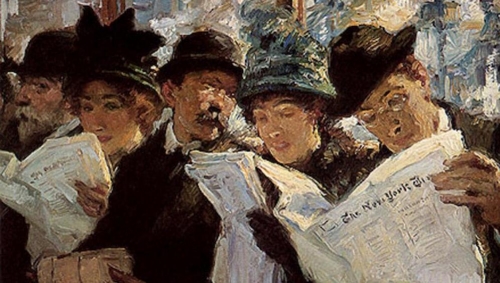
Presseschau
Oktober 2018
AUßENPOLITISCHES
Wir sind die Laborraten im größten geldpolitischen Experiment der Geschichte
https://www.goldseiten.de/artikel/386985--Wir-sind-die-La...
Die Wahrheit über die "Target-2- Salden" - Verständlich erklärt
https://www.goldseiten.de/artikel/386806--Die-Wahrheit-ue...
EU-Sperrklausel
Gewählte Vielfalt
https://www.nwzonline.de/kommentare-der-redaktion/gewaehl...
Schwedens Wohlfahrtsstaat bröckelt an vielen Enden
https://www.nzz.ch/international/schwedens-wohlfahrtsstaa...
Historische Wahl in Schweden: Sozialdemokraten bleiben stärkste Kraft
http://www.faz.net/aktuell/politik/ausland/historische-wa...
(Mainstream-Medien hoffen auf "antifaschistische" Großkoalitionen, um "Rechtspopulismus" auszusitzen)
Politikwandel
Schweden nach der Wahl: Ratlos im Reichstag
https://www.dw.com/de/schweden-nach-der-wahl-ratlos-im-re...
Italien warnt: Ende von QE könnte Eurozone zum Kollabieren bringen
https://www.goldseiten.de/artikel/386214--Italien-warnt~-...
Die Identitätssuche Mazedoniens treibt komplizierte Blüten
https://www.nzz.ch/feuilleton/die-identitaetssuche-mazedo...
Die Folgen der Strafzölle
Türkische Lira fällt und fällt – und zieht den Euro mit sich
https://www.t-online.de/nachrichten/ausland/international...
Homosexualität ist in Indien nicht mehr strafbar – ein Meilenstein für sexuelle Minderheiten im Land
https://www.nzz.ch/international/ein-meilenstein-fuer-ind...
Philippinen
Duterte traf israelischen Präsidenten in Jerusalem
https://www.vol.at/duterte-traf-israelischen-praesidenten...
Entwicklungspolitik in Afrika: Was plant China und welche Gefahren lauern?
https://www.gmx.net/magazine/politik/entwicklungspolitik-...
Kuba dreht die Uhr zurück – ein neues Gesetz soll die Kunstfreiheit massiv beschneiden
https://www.nzz.ch/feuilleton/kuba-dreht-die-uhr-zurueck-...
Rede vor den Vereinten Nationen
Trump: Patriotismus statt Globalismus
https://jungefreiheit.de/politik/ausland/2018/trump-patri...
Englisch wird in Amerikas Städten Minderheitensprache
https://jungefreiheit.de/politik/ausland/2018/englisch-wi...
Ein Schlag ins Gesicht der Vernunft: In den USA eröffnet bald der erste LSD-Tempel
https://www.nzz.ch/feuilleton/goetter-waren-gestern-heute...

INNENPOLITISCHES / GESELLSCHAFT / VERGANGENHEITSPOLITIK
Parteinahe Stiftungen
Kolonialismus im Namen Friedrich Eberts und mit viel Steuergeld
https://jungefreiheit.de/politik/deutschland/2018/kolonia...
SPD-Mitglieder: Alte Protestanten im Öffentlichen Dienst
https://www.ruhrbarone.de/spd-mitglieder-alte-protestante...
Schreiben an Erstklässler
Zirndorf: SPD empört mit Wahlempfehlung für Grundschüler
https://jungefreiheit.de/politik/deutschland/2018/zirndor...
Meuthen über die Methoden des SPD Asozialdemokraten Johannes Kahrs: „Ich krieg dich, Du Schlampe“
https://politikstube.com/meuthen-ueber-die-methoden-des-s...
Ausbeutung der Steuerzahler
Dramatisches Endspiel in der Schuldenkrise
von Henning Lindhoff
https://jungefreiheit.de/debatte/kommentar/2018/dramatisc...
Steuergeldverschwendung
Rechnungshof rügt hohe Zahlungen an Ex-Bundespräsidenten
https://jungefreiheit.de/politik/deutschland/2018/rechnun...
(Billiglöhner)
Arbeitsmarkt
Anteil der Leiharbeiter erreicht neuen Höchststand
https://jungefreiheit.de/politik/deutschland/2018/anteil-...
(Soziales Elend)
Porta Westfalica
70-Jährige stürzt sich während Zwangsräumung aus dem Fenster
https://www.nw.de/lokal/kreis_minden_luebbecke/porta_west...
Energiewende
Aus von Solarworld: Bürger zahlen doppelt
von Henning Lindhoff
https://jungefreiheit.de/wirtschaft/2018/aus-von-solarwor...
(Linke Hetze in Bundestagsräumlichkeiten)
Plakate im Bundestag
Linker Flurschaden
https://jungefreiheit.de/allgemein/2018/linker-flurschaden/
Ein Jahr AfD im Bundestag
Demokratie ist anstrengend
von Dieter Stein
https://jungefreiheit.de/debatte/streiflicht/2018/demokra...
Verfassungsschutz
Die AfD bringt sich selbst in die Bredouille
von Karlheinz Weißmann
https://jungefreiheit.de/debatte/kommentar/2018/die-afd-b...
Drohung gegen die AfD
Verfassungsschutz und Machtmißbrauch (I)
von Thorsten Hinz
https://jungefreiheit.de/debatte/kommentar/2018/verfassun...
Nach Gespräch mit AfD-Politiker
Künstliche Aufregung um Verfassungsschutzchef Maaßen
von Felix Krautkrämer
https://jungefreiheit.de/politik/deutschland/2018/kuenstl...
AfD, Maaßen und Verfassungsschutz
https://sezession.de/59415/afd-maassen-und-verfassungssch...
Streit um Verfassungsschutzchef
Merkel will Maaßens Ablösung
https://jungefreiheit.de/politik/deutschland/2018/merkel-...
AfD und Verfassungsschutz
Verzweifelte Attacke
von Kurt Zach
https://jungefreiheit.de/debatte/kommentar/2018/verzweife...
Willkommen Hans Georg! Was an Maaßens Rauswurf gut ist.
https://www.youtube.com/watch?v=9XwsFd_FCIQ
Maaßen muß gehen
Zeckenbiß mit Folgen
https://jungefreiheit.de/debatte/kommentar/2018/zeckenbis...
Verfassungsschutz und AfD – keine Fehler machen!
von Götz Kubitschek
https://sezession.de/59429/verfassungsschutz-und-afd-kein...
Hamburger AfD-Fraktionschef tritt aus Partei aus
https://www.gmx.net/magazine/politik/hamburger-afd-frakti...
(Wahlkampf in Hessen)
Bouffier rügt Gauland: „Brandstifter im karierten Sakko“
http://www.faz.net/aktuell/rhein-main/bouffier-uebt-schar...
AfD-Vertreter als "Brandstifter im karierten Sakko" bezeichnet
Hessens oberster Opportunist heißt Volker Bouffier (CDU)
http://www.pi-news.net/2018/09/hessens-oberster-opportuni...
(Wahlkampf in Hessen)
Regierungserklärung im Landtag
Bouffiers Attacke gegen die AfD reicht der Opposition nicht
https://www.hessenschau.de/politik/bouffiers-attacke-gege...
AfD als Sargnagel für die Volkspartei, die längst keine mehr ist
SPD: Tobsuchtsanfälle einer verzweifelten Partei
http://www.pi-news.net/2018/09/spd-tobsuchtsanfaelle-eine...
(Geld für eine SPD-geführte Organisation darf in Zukunft gespart werden)
Hilfsorganisation für Kriminalitätsopfer
Weißer Ring will keine AfD-Spenden mehr
https://jungefreiheit.de/politik/deutschland/2018/weisser...
Juden wollen Verein in der AfD gründen
https://www.gmx.net/magazine/politik/juden-verein-afd-gru...
Verlegerpreis für Angela Merkel
Die Bundeskanzlerin – sie lebe hoch, hoch, hoch!
von Felix Krautkrämer
https://jungefreiheit.de/debatte/kommentar/2018/die-bunde...
Vera Lengsfeld: So tickt Angela Merkel! Meine persönlichen Erfahrungen mit der Kanzlerin
https://www.youtube.com/watch?v=j-V7IDD58fo
Truppenaufstockung
Weitere 1.500 US-Soldaten kommen nach Deutschland
https://jungefreiheit.de/politik/deutschland/2018/weitere...
Migration, Heimat, Asyl
Wettbewerb Museum Friedland entschieden
https://www.baunetz.de/meldungen/Meldungen-Wettbewerb_Mus...

LINKE / KAMPF GEGEN RECHTS / ANTIFASCHISMUS / RECHTE
Diskriminierung von Rechten
Hoffen auf mehr Anstand
von Karlheinz Weißmann
https://jungefreiheit.de/debatte/kommentar/2018/hoffen-au...
Spiegel-Interview
Denunzieren, aber richtig
von Boris T. Kaiser
https://jungefreiheit.de/debatte/kommentar/2018/denunzier...
Rechtsextreme auf Demonstrationen
Leicht zu durchschauen
von Thorsten Hinz
https://jungefreiheit.de/kultur/2018/leicht-zu-durchschau...
(Zum geistigen Zustand der Linken)
Nachtgedanken (6): „Aufstehen“? Selbsterdrosselung!
von Götz Kubitschek
https://sezession.de/59336/nachtgedanken-6-aufstehen-selb...
Vor Gericht gegen Franziska Schreiber
von Götz Kubitschek
https://sezession.de/59425/vor-gericht-gegen-franziska-sc...
Fragen an Dagen
Der Buchhändlerin Susanne Dagen wurde am vergangenen Mittwoch bei einer Tagung in Dresden die Tür gewiesen.
https://sezession.de/59426/fragen-an-dagen
Politischer Fundamentalismus. „Waldorfschulen gegen Rechts“
https://sezession.de/59440/politischer-fundamentalismus-w...
Auch die Linke kennt eine Erbsünde: ein Mensch zu sein. Vor allem im Westen
Die radikale Linke erklärt allem den Krieg, was westlich und weiss ist. Die Universalität der Menschenrechte wird oft gleich mit in die Tonne geworfen. Damit erschafft sie Monster.
https://www.nzz.ch/feuilleton/auch-die-linke-kennt-eine-e...
Omas gegen rechts - Ein Beitrag von Christa Ritter
http://www.textland-online.de/index.php?article_id=225
(Matthias Matuschik. Der nächste linke Vorkämpfer und Spaltpilz)
Landtagswahl in Bayern: Wofür steht die neue Partei mut?
https://www.gmx.net/magazine/politik/landtagswahl-bayern-...
(Evangelische Schule Köpenick)
„Kampf gegen Rechts“
Schüler, höret die Signale!
https://jungefreiheit.de/politik/deutschland/2018/schuele...
Landtagswahl
Linkspartei in Brandenburg zeigt sich offen für Koalition mit CDU
https://jungefreiheit.de/politik/deutschland/2018/linkspa...
(SPD am Agitations-Endpunkt angelangt...)
Dunkle Stunde des Parlaments
Im Bundestag entgleist der voll besetzte Schulz-Zug
https://www.tichyseinblick.de/kolumnen/alexander-wallasch...
(Interview mit Dr. Rolf Schlierer)
AfD und Verfassungsschutz
„Schritt um Schritt wird die Schlinge zugezogen“
https://jungefreiheit.de/debatte/interview/2018/schritt-u...
Lehrerausbildung
Bundeszentrale für politische Bildung will Neutralitätsgebot für Beamte aufweichen
https://jungefreiheit.de/politik/deutschland/2018/bundesz...
(Verlogene Scheindebatten-Messe)
Frankfurter Buchmesse steckt unbequeme Verlage ins Ghetto
https://jungefreiheit.de/kultur/2018/frankfurter-buchmess...
#WirSindMehr
Alerta, Alerta, Gratis-Cola!
von Felix Krautkrämer
https://jungefreiheit.de/politik/deutschland/2018/alerta-...
(Zum Konzert #WirSindMehr)
Chemnitz
Hirn statt Hysterie
von Boris T. Kaiser
https://jungefreiheit.de/debatte/kommentar/2018/hirn-stat...
#WirSindMehr
Der totale Kampf gegen Rechts | Laut Gedacht #095
https://www.youtube.com/watch?v=gp-3TAxXYdI
(Einsetzende Altersdemenz?...)
„Wir sind mehr“-Konzert
Chemnitz: Bundespräsident phantasiert von Hakenkreuzfahnen
https://jungefreiheit.de/politik/deutschland/2018/chemnit...
Chemnitz: Angriff auf unsere Wahrheitssysteme!
Von Martin Lichtmesz
https://sezession.de/59360/chemnitz-angriff-auf-unsere-wa...
In eigener Sache
Korrektur zu unserer Chemnitz-Berichterstattung
https://www.t-online.de/nachrichten/deutschland/gesellsch...
„Jeder sollte Position beziehen“
Merkel: Kampf gegen Rassismus muß Botschaft aus Chemnitz sein
https://jungefreiheit.de/politik/deutschland/2018/merkel-...
Proteste in Chemnitz
„Hetzjagden“: Verfassungsschutzchef Maaßen widerspricht Bundesregierung
https://jungefreiheit.de/politik/deutschland/2018/hetzjag...
Chemnitz
„Hetzjagd“: Unionsvize Vaatz kritisiert Regierungssprecher Seibert
https://jungefreiheit.de/politik/deutschland/2018/hetzjag...
„Hetzjagd“
CDU-Abgeordneter kritisiert Chemnitz-Berichterstattung
https://jungefreiheit.de/politik/deutschland/2018/cdu-abg...
("einen Angriff auf einen Migranten zeigt…")
Generalstaatsanwaltschaft hält Chemnitzer Video für echt
https://www.gmx.net/magazine/politik/generalstaatsanwalts...
Entlarvung einer dreisten Medienlüge
Video: Jasinna analysiert „Hetzjagd“-Video von Chemnitz
http://www.pi-news.net/2018/09/video-jasinna-analysiert-h...
Zeitung: Attacke auf jüdisches Restaurant in Chemnitz
https://www.gmx.net/magazine/politik/zeitung-attacke-jued...
Berichterstattung über Chemnitz
Neue Mythen gegen Rechts
von Thorsten Hinz
https://jungefreiheit.de/debatte/kommentar/2018/neue-myth...
Chemnitz
Das Gift der Lüge
von Matthias Matussek
https://jungefreiheit.de/debatte/kommentar/2018/das-gift-...
„Mob mit Schlagstöcken“
Erzbischof Woelki zeigt sich besorgt über Chemnitz und warnt vor AfD
https://jungefreiheit.de/politik/deutschland/2018/erzbisc...
Evangelische Kirche
Landesbischof: AfD-Mitgliedschaft und Christsein schließen sich nicht aus
https://jungefreiheit.de/kultur/gesellschaft/2018/landesb...
(Präsident des Deutschen Evangelischen Kirchentags Leyendecker ist SPD-Mitglied...)
Evangelischer Kirchentag schließt AfD aus
https://jungefreiheit.de/kultur/2018/evangelischer-kirche...
Sorge vor Rechtsextremismus
Künast sieht Fortbestand der Demokratie durch AfD gefährdet
https://jungefreiheit.de/politik/deutschland/2018/kuenast...
(Die nächste Einschüchterungs-Demo der Eliten-Anhänger)
10.000 demonstrieren in Hamburg lautstark gegen rechte Hetze
https://www.gmx.net/magazine/politik/10000-demonstrieren-...
Hamburg
10.000 Teilnehmer
Anti-Rechts-Demonstranten attackieren Polizei und Merkel-Gegner
https://jungefreiheit.de/politik/deutschland/2018/anti-re...
Rostock: 4.000 gegen AfD auf der Straße
https://www.endstation-rechts.de/news/rostock-4000-gegen-...
(„Antifaschistische“ Anti-AfD-Demonstration auch in Offenbach; vor allem von Alt-Sozis und herangekarrten Schülern)
"Wir sind mehr" - Demonstration in Offenbach im Video
https://www.op-online.de/offenbach/wir-sind-mehr-demonstr...
https://www.op-online.de/offenbach/wir-sind-mehr-demo-off...
Nach Todesfall
Rechte demonstrieren erneut in Köthen
Nach dem Tod eines 22-Jährigen in Köthen rufen Rechte in Sachsen-Anhalt nochmals zu Demonstrationen auf - darunter nun auch das fremdenfeindliche Dresdner Pegida-Bündnis. 1300 Menschen gehen auf die Straße.
https://www.n-tv.de/politik/Rechte-demonstrieren-erneut-i...
Guido Reil AfD wird trotz Polizeischutz von linken Chaoten angegriffen. 24.09.2018
https://www.youtube.com/watch?v=V6jp9tWOLMI
Feine Sahne Fischfilet im „Polizeiruf“
Soundtrack zur politisch korrekten Propaganda
https://jungefreiheit.de/debatte/kommentar/2018/soundtrac...
Hochschulpolitik
Greifswald: Studentenparlament grenzt Verbindungen aus
https://jungefreiheit.de/politik/deutschland/2018/greifsw...
„Plädoyer für einen neuen Schutzwall“
Politikwissenschaftler weist Rechtsextremismus-Vorwürfe zurück
https://jungefreiheit.de/politik/deutschland/2018/politik...
(Das nächste Neusprech aus der SPD-Trickkiste: "Demokratiefördergesetz")
Nach Protesten
Giffey will Demokratieförderungsgesetz – Merkel nach Chemnitz
https://jungefreiheit.de/politik/deutschland/2018/giffey-...
(Angela Marquardt)
SPD und Antifa
Die lammfromme Angela
https://jungefreiheit.de/politik/deutschland/2018/die-lam...
Nach G20-Ausschreitungen
CDU fordert Schließung von Linksextremen-Treff „Rote Flora“
https://jungefreiheit.de/politik/deutschland/2018/cdu-for...
«Die Propaganda der Tat» – in Deutschland übernehmen radikale Rechte linke Methoden
Kletteraktionen, Blockaden, Sit-ins, aber auch Adrenalin, Spass und Spontaneität: Die Identitäre Bewegung bewundert die Protestformen der Linken – und imitiert sie.
https://www.nzz.ch/international/die-propaganda-der-tat-i...
Aktuelle Studie
Rechtspopulismus immer attraktiver für Frauen
https://www.dw.com/de/rechtspopulismus-immer-attraktiver-...
(Mobbing, Diskriminierung…)
Universität Bremen
Asta prangert öffentlich angeblich rechtsextreme Studentin an
https://jungefreiheit.de/politik/deutschland/2018/asta-pr...
Offenbach
Anonyme Mail legt Spur zur autonomen Szene
Bekenntnis zu Brandstiftung vor dem Polizeipräsidium
https://www.op-online.de/offenbach/bekenntnis-brandstiftu...
Nordrhein-Westfalen
Linksextremisten bekennen sich zu Anschlag auf Bahnstrecke
https://jungefreiheit.de/politik/deutschland/2018/linksex...
Cyber-Kriminalität
Hacker legen RWE-Homepage lahm
https://jungefreiheit.de/politik/deutschland/2018/hacker-...
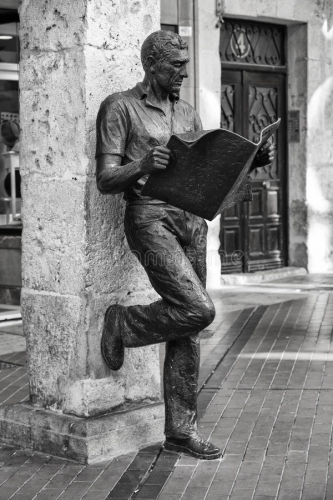
EINWANDERUNG / MULTIKULTURELLE GESELLSCHAFT
Flüchtlingslügen 2018 – Videoreportage
https://www.youtube.com/watch?v=qcggoM2AOb8
(Zitat: „Medienforscher Thomas Hestermann (Macromedia-Hochschule Hamburg) kommt zu einem ganz anderen Schluss: "Das Land ist trotz Flüchtlingswelle insgesamt sicherer geworden. Es ist so sicher wie lange nicht mehr - aber es fühlt sich für viele nicht so an."“)
Ist es in Deutschland (un-)sicher?
Wie Kriminalität und gefühlte Kriminalität auseinanderklaffen - und warum
"Messer-Migranten" und Vergewaltiger, die das Land mit Kriminalität überfluten - die AfD spricht von einer "dramatisch verschärften Sicherheitslage". Ist das wirklich so?
https://www.stern.de/panorama/gesellschaft/wie-kriminalit...
Zuwanderung: Ostdeutsche und Männer skeptischer
Die Ereignisse in Chemnitz und Köthen haben den Dialog über Zuwanderung nochmals verschärft. Integrationsforscher warnen vor Panikmache. Einer neuen Studie zufolge beurteilen die Deutschen die Zuwanderung im Alltag positiver als weithin angenommen.
https://www.evangelisch.de/inhalte/152294/17-09-2018/zuwa...
Europäische Asylpolitik
UN-Kommissar: In Europa gibt es keine Flüchtlingskrise
https://jungefreiheit.de/politik/ausland/2018/un-kommissa...
Antrittsrede
UN-Kommissarin verurteilt Gewalt gegen Migranten in Deutschland
https://jungefreiheit.de/politik/ausland/2018/un-kommissa...
(Wirtschaft sorgt sich um weiteren Zustrom von Billiglöhnern)
Migrationspolitik
Handelsverband warnt vor Klima der Angst
https://www.mdr.de/nachrichten/politik/inland/handelsverb...
(Wirtschaft sorgt sich um weiteren Zustrom von Billiglöhnen und Exporte, Teil 2)
DIHK
Wirtschaftsverband: Rechtsextremismus ist Gefahr für Deutschland
https://jungefreiheit.de/wirtschaft/2018/wirtschaftsverba...
(Wirtschaft sorgt sich um weiteren Zustrom von Billiglöhnen und Exporte, Teil 2)
Deutsches Institut für Wirtschaftsforschung
DIW-Präsident: „Haß von Chemnitz“ schadet deutscher Wirtschaft
https://jungefreiheit.de/wirtschaft/2018/diw-praesident-h...
UN Migrationspakt stoppen - Nicht in unserem Namen!
https://www.youtube.com/watch?v=VK6h14l3A60
Sie wollen den Pakt zur grenzenlosen Migration. Wir wollen das nicht!
https://migrationspakt-stoppen.info/
US-Regierung senkt Flüchtlingsobergrenze erneut
https://jungefreiheit.de/politik/ausland/2018/us-regierun...
Seenotrettung
Panama will Flüchtlingsschiff die Zulassung entziehen
https://jungefreiheit.de/politik/ausland/2018/panama-will...
Villingen-Schwenningen
SPD-Oberbürgermeister: Es gibt keine Flüchtlingskrise
https://jungefreiheit.de/politik/deutschland/2018/spd-obe...
Veranstaltung in Düsseldorf
Laschet: Seehofer spricht wie Saddam Hussein
https://jungefreiheit.de/politik/deutschland/2018/laschet...
Ausreisepflichtiger Afghane
Schwedin droht Haftstrafe wegen verhinderter Abschiebung
https://jungefreiheit.de/politik/ausland/2018/schwedin-dr...
(Islamisches Bilderverbot führt zum Ende der Klassenfotos)
Datenschutz und Kinderfotos
Die Zeit der Gesichtslosen
https://www.op-online.de/offenbach/offenbach-immer-mehr-e...
Pegida in Chemnitz
„Perverse Verdrehung von Sophias Leben“ – Familie kritisiert AfD-Demo
https://www.welt.de/politik/deutschland/article181426208/...
AfD-Anfrage
Hetzjagd in Chemnitz: Seibert beruft sich auf „Schilderungen aus sozialen Medien“
https://jungefreiheit.de/politik/deutschland/2018/hetzjag...
Interner Bericht
„Hetzjagd“-Debatte: Innenministerium stellt sich hinter Maaßen
https://jungefreiheit.de/politik/deutschland/2018/hetzjag...
Nach Chemnitz, Köthen: Die nächste Tat
Von Martin Lichtmesz
https://sezession.de/59390/nach-chemnitz-koethen-die-naec...
Sachsen-Anhalt
Nach Köthen: Ministerpräsident Haseloff ruft zum Kampf gegen Rechts auf
https://jungefreiheit.de/politik/deutschland/2018/nach-ko...
„Im Wochentakt umgebracht“
AfD-Politiker: Ministerpräsident mit schuld an Tod von Deutschen
https://jungefreiheit.de/politik/deutschland/2018/afd-pol...
Drama um Abschiebung in Krefeld
Dieser Vater wollte sein Kind vom Balkon werfen
https://www.express.de/duesseldorf/drama-um-abschiebung-i...
Arabische Großfamilien
Nach Mord an Intensivtäter: Situation ist bedrohlich
https://jungefreiheit.de/kultur/gesellschaft/2018/nach-mo...
Nach Tod von Nidal R.
Neukölln fordert ein berlinweites Clan-Konzept
https://www.berliner-zeitung.de/berlin/nach-tod-von-nidal...
Intensivtäter in Berlin erschossen
Nidals letzter Gang – Ende eines Intensivtäters
https://jungefreiheit.de/kultur/gesellschaft/2018/nidals-...
von Martina Meckelein
Zeugen gesucht
Libanesen verprügeln Polizistin vor Shisha-Bar in Essen
https://jungefreiheit.de/politik/deutschland/2018/libanes...
Messerangriff
Afghane sticht in Paris wahllos auf Passanten ein
https://jungefreiheit.de/politik/ausland/2018/afghane-sti...
Niedersachsen
Lebensgefährliche Messerattacke: Syrer zu Jugendhaft verurteilt
https://jungefreiheit.de/kultur/gesellschaft/2018/lebensg...
»Ein Prozent«-Doku: Der Fall Marcus H.
https://sezession.de/59402/ein-prozent-doku-der-fall-marc...
Prozess in Darmstadt
Sieben Jahre Haft für Messerangriff auf 17-Jährige
http://www.fr.de/rhein-main/kriminalitaet/prozess-in-darm...
https://www.hessenschau.de/panorama/sieben-jahre-haft-fue...
Florstadt
Mutmaßlicher Islamist festgenommen
17-Jähriger plante Sprengstoffanschlag im Rhein-Main-Gebiet
https://www.hessenschau.de/panorama/festnahme-17-jaehrige...
(Beratungsresistente Familie)
Amberg
Beim Trampen getötete Studentin Sophia in Amberg beigesetzt
https://www.augsburger-allgemeine.de/bayern/Beim-Trampen-...
Vergewaltigte Camperin
Opfer findet nicht in den Alltag zurück
https://www.n-tv.de/panorama/Opfer-findet-nicht-in-den-Al...
Ravensburg
Nach der Messerattacke hofft Integrationsminister auf Zusammenhalt
https://www.welt.de/vermischtes/article181706640/Ravensbu...
(Selbstverständlich ist der Täter mal wieder psychisch krank. Wer hätte auch anderes erwartet...)
Messer-Attacke in Ravensburg: Mutmaßlicher Täter offenbar psychisch Krank - Neue Hinweise auf Motiv
https://www.hna.de/welt/messer-attacke-in-ravensburg-mutm...

KULTUR / UMWELT / ZEITGEIST / SONSTIGES
Hässlichkeit ist kein Privileg unserer Zeit
Die Errichtung baulicher Scheußlichkeiten ist kein Privileg unserer Zeit. Das wird nach dem Vortrag von Pablo de la Riestra im Luftmuseum deutlich. Aber auch, dass wir uns heute sehr viel Mühe geben, unsere Städte hässlicher zu machen.
https://www.onetz.de/oberpfalz/amberg/haesslichkeit-kein-...
Neue Altstadt ist die große Attraktion Frankfurts
Bürger und Besucher stimmen mit Füßen und Augen ab
http://www.bff-frankfurt.de/artikel/index.php?id=1340
(Zu Stephan Trüby und Co.)
Frankfurt am Main
Warum hassen Linke die neue Altstadt?
https://www.tichyseinblick.de/meinungen/frankfurt-am-main...
Eiche trotzt der Geschichte
Dieser Berliner Baum hat Kaiser, Weltkriege und die DDR überlebt
https://www.bz-berlin.de/berlin/mitte/diese-berliner-baum...
Gastkommentar von Klaus Kelle
Wie die ARD über Chemnitz berichtet, hat mit Journalismus nichts mehr zu tun
https://www.focus.de/politik/experten/kelle/gastkommentar...
Soziale Medien
Twitter sperrt Konten von „Infowars“-Betreiber Jones dauerhaft
https://jungefreiheit.de/politik/ausland/2018/twitter-spe...
Soziale Netzwerke
Neutralitätspflicht gilt auch für twitternde Minister
https://jungefreiheit.de/debatte/kommentar/2018/neutralit...
Debattenkultur: Empört euch nicht!
"Hetzjagd" und "Hexenkessel": Die Sprache von Journalisten bildet Wirklichkeit nicht nur ab, sie generiert sie auch. Ein Plädoyer für gewaltfreien Journalismus
https://www.zeit.de/kultur/2018-09/debattenkultur-journal...
Fake-Skandal von Berlin-Lichtenberg ist nur die Spitze des Eisberges
Die Spur des Anti-AfD-Videos führt zu ARD und ZDF
http://www.pi-news.net/2018/09/die-spur-des-anti-afd-vide...
Kampf um Neutralität an Schulen: AfD erhält erste Hinweise
https://jungefreiheit.de/politik/deutschland/2018/kampf-u...
Er hat sie vergewaltigt. Und sie will durch seine Augen blicken
Er war so jung, dass Winnie M. Li zunächst gar nicht gewahr wurde, was er im Schilde führte. Die Vergewaltigung war dann ein Schock, unter dem ihr bisheriges Leben zerbrach. Es gab nur einen Weg in die Zukunft: das Erlebte zu durchleuchten – bis in die Seele des halbwüchsigen Täters hinein.
https://www.nzz.ch/feuilleton/er-hat-sie-vergewaltigt-und...
Sexismusdebatte
Miss Germany: Keine Bikini-Runde mehr
https://jungefreiheit.de/kultur/2018/miss-germany-keine-b...
Nach Wettbewerbsreform
Ohne Bikini-Runde: Quoteneinbruch für „Miss America“
https://jungefreiheit.de/kultur/2018/ohne-bikini-runde-qu...
Genderfluidität: Was für ein Glück, ein 90s Kid zu sein
Manche Männer menstruieren, manche Frauen penetrieren. Keine Eigenschaft der Welt ist weiblich oder männlich. Wir Jungen, die Millennials, wissen das.
https://www.zeit.de/campus/2018-08/genderfluiditaet-weibl...
Nach Behauptung eines Ex-Autors
Sesamstraße: Ernie und Bert sind nicht schwul
https://jungefreiheit.de/kultur/2018/sesamstrasse-ernie-u...
Sugar Daddy dankt ab: Wie #MeToo die alten Männer zum Feindbild erklärt hat
https://www.nzz.ch/feuilleton/sugar-daddy-dankt-ab-wie-me...
(Denken von Medieneliten)
Carolina Rosales
Abgehoben und größenwahnsinnig
https://jungefreiheit.de/politik/deutschland/2018/abgehob...
(Bezahlte Hofschranze Christian Brandes)
„Volksfest in Sachsen“
Schlecky Silbersteins Gratismut
von Thorsten Hinz
https://jungefreiheit.de/debatte/kommentar/2018/schlecky-...
"Ich bin in meinem Heimatland!"
Belgische Wetterfrau hält Wutrede
Wettermoderatorin Cécile Djunga ist eine junge Belgierin und muss sich doch immer wieder rechtfertigen. Regelmäßig erhält sie rassistische Beleidigungen. Jetzt reicht es ihr. Mit einer sehr persönlichen Stellungnahme geht sie an die Öffentlichkeit.
https://www.n-tv.de/panorama/Belgische-Wetterfrau-haelt-W...
„Herald Sun“
Rassismusvorwurf: Zeitung verteidigt Serena-Williams-Karikatur
https://jungefreiheit.de/kultur/medien/2018/rassismusvorw...
(Bizarre Story, aber lustig...)
„Der Neger ist kein Neger mehr“
Tochter von AfD-Politikerin sorgt für Eklat bei Poetry Slam
https://jungefreiheit.de/politik/deutschland/2018/tochter...
(Dazu...)
Sonntagsheld (78) – Alles für’n Arsch
Zerplatzende Seifenblasen soll man nicht aufhalten
https://sezession.de/59455/sonntagsheld-78-alles-fuern-ar...
Mesut, Jogi, Antonio und Co. Eine sportpolitische Nachbetrachtung
von Prof. Günter Scholdt über das Fußballtheater der »Mannschaft« und ihres Umfelds im Sommer 2018.
https://sezession.de/59387/mesut-jogi-antonio-und-co-eine...
Hohenschönhausen
Stasi-Gedenkstätte entläßt Hubertus Knabe
https://jungefreiheit.de/politik/deutschland/2018/stasi-g...
DDR-Gedenkstätte Hohenschönhausen
Waidmanns Heil, Genossen!
https://jungefreiheit.de/politik/deutschland/2018/waidman...
Plastikmüll: The Ocean Cleanup beginnt mit der Müllsammlung im Pazifik
https://www.golem.de/news/plastikmuell-the-ocean-cleanup-...
Die letzten Ordensmänner von Arnstein verlassen das Kloster
900 Jahre alte Abtei wird aufgelöst
https://www.domradio.de/themen/bist%C3%BCmer/2018-09-06/d...
Zürich
1968 im Landesmuseum: Am Ende ist auch die Revolution nur eine Ware
https://www.nzz.ch/feuilleton/am-ende-ist-1968-auch-nur-e...
Geschichten vom Krieg
Mehr als 70 Jahre nach Ende des Zweiten Weltkriegs leben nur noch wenige Zeitzeugen - doch kurioserweise verkaufen sich Geschichten von der Front bis heute. Obwohl die Printmedienbranche seit Jahren in der Krise steckt, liegen Zeitschriften zu Kriegen, Militärgeschichte und Waffen vergleichsweise stabil im Markt. Vor allem in Bahnhofsbuchhandlungen werden Dutzende dieser Magazine und Heftchen angeboten.
https://www.evangelische-friedensarbeit.de/artikel/2018/g...
Buchmesse „Jeder bringt sein Weltbild mit nach Frankfurt“
Die Messe wird politisch in diesem Jahr. Sie wird noch internationaler. Nur ein rechter Verlag hat sich auf der weltgrößten Bücherschau angemeldet.
http://www.fnp.de/nachrichten/kultur/Jeder-bringt-sein-We...
Aus für den Frankfurter Stroemfeld Verlag
KD Wolff muss Insolvenz anmelden
https://www.tagesspiegel.de/kultur/aus-fuer-den-frankfurt...
Fehlende Bestellungen
Stroemfeld Verlag meldet Insolvenz an
https://www.deutschlandfunkkultur.de/fehlende-bestellunge...
Äußerungen zur Flüchtlingspolitik
Axel Krause: Leipziger Galerie trennt sich aus politischen Gründen von Maler
https://www.mdr.de/kultur/axel-krause-trennung-galerie-kl...
Umfrage
Wie stehen Galeristen zum Fall Axel Krause?
Der Fall Axel Krause beschäftigt die Kunstwelt. Wie stehen Galeristen zum Raufwurf eines Künstlers aus politischen Gründen? Eine Umfrage
https://www.monopol-magazin.de/wie-stehen-galeristen-zum-...
Interview mit Buchautor Hanno Rauterberg
Nach dem Fall Axel Krause: Wie frei ist die Kunst?
https://www.mdr.de/kultur/kunstfreiheit-hanno-rauterberg-...
Was ist Macht - warum gehört sie unseren Gegnern?
Von Martin Sellner
https://www.youtube.com/watch?v=Ydty1Ao2KMs
Bin ich völkisch? Drei Volksbegriffe
von Caroline Sommerfeld
https://sezession.de/59430/bin-ich-voelkisch-drei-volksbe...
Ulrich Schacht ist tot
https://sezession.de/5039/ulrich-schacht-ist-tot
Timur Vermes: Die Hungrigen und die Satten
https://sezession.de/59366/timur-vermes-die-hungrigen-und...
Thilo Sarrazin und die Empörungsdemokratie: Deutschland muss wieder streiten lernen
https://www.nzz.ch/feuilleton/thilo-sarrazin-und-die-empo...
Unreine Wahrheiten. Wie der antirassistische Konsens bewahrt werden kann
https://geschichtedergegenwart.ch/unreine-wahrheiten-wie-...
15:49 Publié dans Actualité, Affaires européennes | Lien permanent | Commentaires (0) | Tags : presse, actualité, europe, allemagne, médias, affaires européennes, journaux |  |
|  del.icio.us |
del.icio.us |  |
|  Digg |
Digg | ![]() Facebook
Facebook
lundi, 01 octobre 2018
Guerre civile et immigration

Guerre civile et immigration
par André WAROCH
À l’issue des émeutes de 2005, qui firent quatre morts, plus de cinquante blessés parmi les forces de l’ordre, donnèrent lieu à près de trois mille interpellations, occasionnèrent la destruction de 9 000 voitures, et virent l’état d’urgence proclamé en France pour la première fois depuis la guerre d’Algérie, Dominique Venner eut ces mots glaçants : « Nous vivons le début de quelque chose que nous ne connaissons pas, qui n’a pas de précédent sous cette forme. »
Mais les émeutes de 2005 ne sont elles-mêmes qu’une des étapes d’un processus enclenché dans les années 1970. Ces quarante dernières années sont, en effet, l’histoire d’une longue chute dans l’abîme. Le seul écrivain français à avoir tenté de raconter cette histoire sous une forme romancée fut Michel Houellebecq qui tenta ainsi de poser la question centrale, qui est, selon Philippe Muray, celle de la littérature, à savoir : que se passe-t-il ?
Ce qui se passe en France depuis ces quatre dernières décennies, ce qui se joue, est justement la question interdite par excellence. Un déluge de mensonges s’est abattu sur le pays et ses habitants, victimes de ce que Renaud Camus a appelé le « Grand Remplacement », et qu’Éric Zemmour et Valéry Giscard d’Estaing (pourtant lui-même responsable de la mise en place du regroupement familial en 1976) ont qualifié du terme plus prosaïque d’« invasion », terme d’ailleurs lui aussi assez mensonger, puisque renvoyant en premier lieu aux invasions germaniques ayant détruit l’Empire romain d’Occident, c’est-à-dire un événement opposant des soldats à d’autres soldats, l’installation massive des Wisigoths et autres Alamans en Gaule n’étant que la conséquence logique de leur victoire militaire.
Une occupation douce
Rien de tel dans le cas qui nous occupe. Les nouveaux Barbares ne sont venus ni avec des tanks, ni avec des lance-roquettes, ni même avec des fusils, mais dans le plus complet désordre, et les mains nues. Et il ne manque pas de voix médiatiques pour nous expliquer que tout cela « est inéluctable », « qu’on ne peut pas lutter » contre cet afflux de « réfugiés ». Il n’aura pourtant fallu qu’un peu plus d’un mois à la petite Hongrie de Viktor Orban, menacée par ce même afflux de « réfugiés », pour régler le problème, en installant tout simplement une barrière de barbelés tout le long de son flanc Sud. Dorénavant, ne pénètrent en Hongrie que ceux qui y ont été autorisés par un gouvernement national élu démocratiquement. Ce qui est apparemment le pire cauchemar pour les élites politico-médiatiques au pouvoir à l’Ouest.
L’installation des nouveaux Barbares est donc voulue, organisée et planifiée par le pouvoir lui-même, qui agit de ce fait sciemment, et ce depuis plusieurs décennies, contre la population autochtone. Pourtant, la guerre civile qu’on annonce à présent pour demain, et qu’on annonçait déjà hier pour maintenant, n’a toujours pas eu lieu. Cette guerre, qui devait opposer, soit l’État français à des forces islamo-africaines plus ou moins structurées, soit des autochtones constituées en milices à ces mêmes forces étrangères, est restée dans les cartons des intellectuels d’« extrême-droite » ou autres harangueurs « populistes ». Le problème qui se pose pour le premier cas, c’est qu’il impliquerait un système politico-médiatico-judiciaire poussé dans ses derniers retranchements, débordé par ceux dont il a voulu à toutes forces l’installation massive sur son territoire. En réalité, le Système n’est pas du tout débordé, et ne semble pas en passe de l’être dans un avenir proche, par une certaine racaille. Comme pour l’immigration, la situation est en fait sous contrôle, et tout ce qui se passe, se déroule parce que les dirigeants l’ont voulu ainsi. Le second cas, c’est-à-dire l’affrontement entre autochtones et populations immigrées, n’a pas eu lieu non plus. Il semble au contraire n’en avoir jamais été plus éloigné. Il n’y pour ainsi dire aucune réaction – à part la fuite – des Français face à ce phénomène gravissime qui les dépossède, peu à peu, de la terre qui était la leur depuis la plus haute Antiquité.
L’insurrection que le pouvoir redoute par-dessus tout n’est ni celle des enfants de l’immigration, agitation violente, désordonnée et bestiale, qu’ils pourraient en réalité mater très rapidement, par l’action de la police et de la justice (comme au Maghreb, par la bastonnade suivie de détentions de masse), ni celle des « identitaires » qui décideraient de prendre les armes contre les Noirs et les Arabes, mais celle qui pourrait advenir le jour où les autochtones européens dans leur ensemble prendront subitement conscience de la manipulation dont ils ont été les victimes.

Ils comprendront ce jour-là que ce n’est pas par incompétence que les différents gouvernements agissent contre leurs intérêts, mais parce qu’ils servent d’autres intérêts. Car les exactions commises par les racailles allogènes (qui ne relèvent nullement de la « délinquance » mais du terrorisme, tel que défini par le Larousse : « Ensemble d’actes de violence commis par une organisation ou un individu pour créer un climat d’insécurité, pour exercer un chantage sur un gouvernement, pour satisfaire une haine à l’égard d’une communauté, d’un pays, d’un système »), résultat de leur totale inaptitude au « vivre-ensemble » (expression qui désigne l’état qui pourrait être celui de la société française s’il n’y avait pas eu cette immigration qui transforme la France en un immense dépotoir où règne la loi de la jungle), leur violence, la haine qu’ils éprouvent et pratiquent à l’égard du peuple français, ont fait oublier à tout le monde que cette haine est d’abord celle qu’ont les auteurs de cette immigration à l’égard des indigènes d’Europe, qu’ils ont tout simplement livrés aux Barbares.
Nous vivons l’aboutissement logique de la sécession des élites décrite par Christopher Lasch, processus de séparation physique, culturel et anthropologique, qui aboutit, à la fin, à la liquidation physique des peuples occidentaux.
Les manigances de la Caste
La haine des élites françaises à l’égard de leur propre peuple est facilement démontrable : il suffit de constater quels immigrés sont le plus défendus par les médias, et lesquels ne récoltent que de l’indifférence. Chacun a pu entendre, par exemple, ces dernières années, qu’il n’y avait pas assez de Noirs et d’Arabes à la télévision (on confia le journal de TF1 à Harry Roselmack en 2006 pour cette raison, à la suite justement des émeutes de 2005, dont le caractère racial fut donc à cette occasion avoué et assumé par le Régime). J’en ai pour ma part vu un certain nombre. Je ne sais pas combien il en faudrait encore pour que nos petits maîtres soient satisfaits. Certes, ont-ils employé le terme plus hypocrite de « minorités », mais tout le monde comprend ce qu’ils veulent dire. En effet, même depuis cette campagne d’intimidation, je n’ai jamais vu un Asiatique présenter ou animer quoique ce soit : ni le journal de 20 h 00, ni celui de 13 h 00, ni celui de la Nuit, pas un talk-show ou un jeu. Même pas la météo ! Vous pouvez chercher. Allez-y, cherchez-bien. Il n’y en a pas un seul. Qui a protesté ? Et surtout, quel est le crime dont s’est rendue coupable la communauté asiatique pour ne pas avoir droit à la bruyante commisération de nos petits marquis ?
C’est très simple. Ses membres ne s’en prennent pas aux Français. Pas un viol, pas une agression, pas une voiture brûlée. Si problèmes il y a (escroquerie, travail au noir, trafic de contrefaçons), ils relèvent uniquement de la délinquance crapuleuse, c’est-à-dire froide, et lié à l’intérêt économique personnel, alors que les autres se rendent coupables d’innombrables crimes motivés uniquement par la haine. Ce sont donc les communautés les plus violentes, les plus asociales, les plus anti-françaises, les plus anti-blanches, qui sont le plus protégées et favorisés par la caste politico-médiatico-judiciaire.

À l’heure où j’écris ces lignes, il y a quasiment un égorgement par jour en France, traduit systématiquement, en langage médiatique, par « poignardé à la gorge ». La raison de ce travestissement est très simple : il faut cacher le fait que ce type de meurtre, qui vise très majoritairement des Européens de souche, est exclusivement commis par des Arabo-musulmans. Il s’agit donc de crimes motivés par la haine raciale. Plus les crimes de haine à l’encontre des Français augmentent, plus les effectifs de police se réduisent, et plus le laxisme judiciaire devient la règle. Les courbes qui se croisent illustrent parfaitement cette fameuse phrase de Guillaume Faye : « Ce n’est pas un complot, c’est pire, c’est une logique. »
Ainsi, le racisme anti-blanc, ou racisme anti-français, devient l’idéologie officieuse, ou plutôt, officieusement officielle de la République française. Il faut dire aussi un mot du « féminisme », même si certains naïfs peuvent encore croire que c’est un autre sujet. Derrière ce terme, il n’y a plus, en réalité, qu’une accusation portée sur un individu bien particulier, soupçonné d’être un prédateur en puissance qu’il faudrait castrer au moins symboliquement : l’homme blanc occidental. Alors que celui-ci est censé être dorénavant doux comme l’agneau qui vient de naître, surveillé par les ligues de vertu, les « réfugiés du Sud », eux, ont tous les droits à l’égard des femmes, puisque les dénoncer reviendrait à être « raciste ».
Le rôle des féministes officiels et médiatiques n’est donc en aucun cas de promouvoir les intérêts de la femme, mais de désarmer l’homme blanc (y compris le policier, qui voit la moindre « bavure » impitoyablement sanctionnée) de détruire sa virilité, c’est-à-dire son potentiel de violence, y compris celle qu’il pourrait utiliser pour protéger sa femme des agissements des allogènes. Celle-ci devient donc la proie des harceleurs et autres violeurs surgis du Sud, sans plus personne pour la défendre. Le « féminisme » n’est qu’un des masques du Grand Remplacement.
La révolte gronde…
Toute révolution paraît improbable. La majorité des Français semblent résignés. Le pays s’enfonce toujours plus profond dans l’abîme, et rien ne semble pouvoir freiner cette descente aux enfers.
Installés aux portes de Paris par millions, et avec leurs familles, éduqués dans la haine du peuple qui les accueille, ces « Sudistes » ne doivent pas provoquer la guerre civile, mais, au contraire, l’empêcher. Empêcher que les Français du bas, maintenant exilés dans le péri-urbain et les périphéries, montent à l’assaut de ceux du haut, solidement barricadés dans leurs quartiers, protégés par un cordon de banlieues tiers-mondisées.
Si l’on s’en tient au paradigme démocratique franco-français (c’est-à-dire aux limites qu’ont définies pour nous nos élites), qui se résume à un peuple lobotomisé, à une caste dirigeante toute-puissante et à des minorités haineuses dont ils se servent, la situation est sans issue. On a voulu de toute force nous convaincre que l’avenir ne pouvait résider que dans la mondialisation, l’immigration, la libre-circulation sans limites des biens et des personnes, l’internationalisation définitive, et que nous n’étions que des résidus de l’histoire vaincue. L’histoire mondiale des dix dernières années nous enseigne pourtant tout le contraire. Aux États-Unis, en Russie, en Italie, en Europe centrale, existent maintenant des forces considérables, arrivées au pouvoir par la voie des urnes, déterminées à abattre cette idéologie et ceux qui la soutiennent.
La mondialisation, qui a vaincu et marginalisé les peuples européens sur leur propre sol, peut être demain l’instrument de leur victoire. L’inquiétude qui perce dans les cercles médiatico-politiques concernant la vague « populiste » à travers le Vieux Continent n’est pas qu’idéologique, elle commence à être aussi purement et simplement physique. La Russie nationaliste, en annexant la Crimée et en entretenant une rébellion séparatiste dans l’Est de l’Ukraine, s’est de nouveau avancée vers l’Ouest. Un jour peut-être, les responsables occidentaux de l’immigration passeront-ils devant un autre tribunal de Nuremberg.
André Waroch
09:46 Publié dans Actualité, Affaires européennes | Lien permanent | Commentaires (0) | Tags : actualité, europe, france, allemagne, affaires européennes, immigration, terrorisme, guerre civile |  |
|  del.icio.us |
del.icio.us |  |
|  Digg |
Digg | ![]() Facebook
Facebook
dimanche, 30 septembre 2018
Conférence: le mouvement völkisch
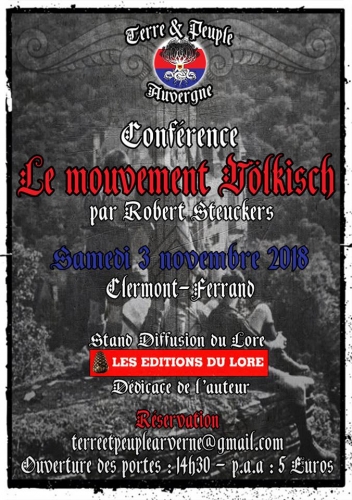
14:30 Publié dans Evénement, Histoire, Révolution conservatrice, Théorie politique | Lien permanent | Commentaires (0) | Tags : événement, robert steuckers, auvergne, terre et peuple, folcisme, völkisch, mouvement völkisch, allemagne, révolution conservatrice, théorie politique, politologie, histoire, philosophie politique, sciences politiques |  |
|  del.icio.us |
del.icio.us |  |
|  Digg |
Digg | ![]() Facebook
Facebook



